
Edelweiss
De Archeo-Futuristische Europese Rijksgedachte aan de hand van Robert Steuckers’ Europa I. Valeurs et racines profondes de l’Europe
(Madrid: BIOS, 2017)
door Alexander Wolfheze
Voorwoord: Slangtong in Zürich
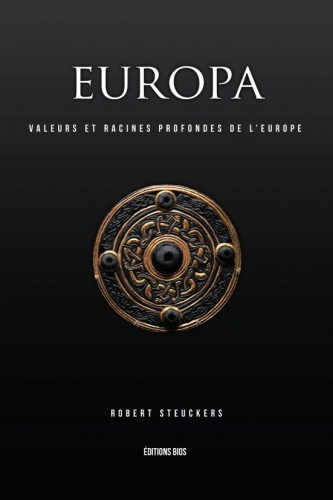 De aanstaande Europese verkiezingen, waarmee het globalistisch-eurocratisch regime in Brussels zich nogmaals vier jaar een ‘democratische’ dekmantel wil aanmeten, biedt een goede gelegenheid tot een gedegen heroverweging van het ‘EU project’. De democratische camouflagekleding van het EU keizerrijk is inmiddels echter zodanig afgedragen dat zelfs troonopvolger kandidaat Mark Rutte zich afvraagt of het niet tijd is om het gewoon maar om te kleden in onverhuld totalitaire ‘uniform’ stijl. De titel van zijn op 13 februari 2019 in Zürich uitgesproken - en door analisten als ‘sollicitatiebrief’ nummer zoveel geïnterpreteerde[1] - ‘Churchill Lezing’ spreekt in dit opzicht boekdelen: The EU: from the power of principles towards principles and power.[2] Ofwel: ‘De EU: van de macht van principes naar principes en macht’. ‘Naar machtsprincipe’ zegt hij nog net niet, maar de inhoud windt er geen doekjes om: ‘het gaat in de wereld om macht en macht is geen vies woord’ (lees: de EU heeft machtsmiddelen die onvoldoende worden gebruikt), ‘de EU moet minder naïef zijn en meer realisme tonen’ (lees: het is tijd voor de EU het idealistisch masker laat vallen) en ‘we moeten besluiten over sancties tegen landen voortaan met een gekwalificeerde meerderheid nemen’ (lees: de resterende staatssoevereiniteit van de lidstaten moet nog verder worden verkleind). En inderdaad ontwikkelt de EU zich steeds meer in de richting van een ‘superstaat’: de gestage accumulatie van censuurmaatregelen in de mediale en digitale sfeer met hate speech codes,[3] fake news taskforces[4] en copyright directives[5] neemt inmiddels Orwelliaanse vormen aan. Met de totalitaire finish lijn van het EU project in zicht, is het goed de historische ontwikkeling en ideologische grondslagen ervan nog eens de revue te laten passeren.
De aanstaande Europese verkiezingen, waarmee het globalistisch-eurocratisch regime in Brussels zich nogmaals vier jaar een ‘democratische’ dekmantel wil aanmeten, biedt een goede gelegenheid tot een gedegen heroverweging van het ‘EU project’. De democratische camouflagekleding van het EU keizerrijk is inmiddels echter zodanig afgedragen dat zelfs troonopvolger kandidaat Mark Rutte zich afvraagt of het niet tijd is om het gewoon maar om te kleden in onverhuld totalitaire ‘uniform’ stijl. De titel van zijn op 13 februari 2019 in Zürich uitgesproken - en door analisten als ‘sollicitatiebrief’ nummer zoveel geïnterpreteerde[1] - ‘Churchill Lezing’ spreekt in dit opzicht boekdelen: The EU: from the power of principles towards principles and power.[2] Ofwel: ‘De EU: van de macht van principes naar principes en macht’. ‘Naar machtsprincipe’ zegt hij nog net niet, maar de inhoud windt er geen doekjes om: ‘het gaat in de wereld om macht en macht is geen vies woord’ (lees: de EU heeft machtsmiddelen die onvoldoende worden gebruikt), ‘de EU moet minder naïef zijn en meer realisme tonen’ (lees: het is tijd voor de EU het idealistisch masker laat vallen) en ‘we moeten besluiten over sancties tegen landen voortaan met een gekwalificeerde meerderheid nemen’ (lees: de resterende staatssoevereiniteit van de lidstaten moet nog verder worden verkleind). En inderdaad ontwikkelt de EU zich steeds meer in de richting van een ‘superstaat’: de gestage accumulatie van censuurmaatregelen in de mediale en digitale sfeer met hate speech codes,[3] fake news taskforces[4] en copyright directives[5] neemt inmiddels Orwelliaanse vormen aan. Met de totalitaire finish lijn van het EU project in zicht, is het goed de historische ontwikkeling en ideologische grondslagen ervan nog eens de revue te laten passeren.
Het Verdrag van Maastricht dat de formele grondslag legde voor de huidige Europese Unie werd getekend op 7 februari 1992, zes weken na de formele opheffing van de Sovjet Unie: zo begon de opbouw van het nieuwe cultuurmarxistische Westblok direct na de afbraak van het oude reaalsocialistische Oostblok. Sindsdien heeft de EU zich niet alleen naar buiten toe sterk uitgebreid (met name door de haastige inlijving van de net uit het Oostblok ontsnapte Centraal-Europese natiestaten), maar zij heeft zich ook in rap tempo als proto-totalitair ‘superstaat’ project naar binnen toe ontwikkeld tot een waardige opvolger van de Sovjet Unie. De overeenkomsten zijn in toenemende mate frappant: dezelfde sociale ‘deconstructie’ (Oostblok: hyper-proletarisch collectivisme / Westblok: neo-matriarchale nivellering), dezelfde economische ‘deconstructie’ (Oostblok: ‘dwangcollectivisatie’ / Westblok: ‘rampen kapitalisme’) en dezelfde etnische ‘deconstructie’ (Oostblok: ‘groepsdeportatie’ / Westblok: ‘omvolking’). De tegenstelling tussen het theoretisch discours van het liberaal-normativisme (‘vrijheid’, ‘gelijkheid’, ‘democratie’, ‘rechtsstaat’, ‘mensenrechten’) en de praktische leefrealiteit van maatschappelijke degradatie (sociaal-darwinistische economische tweedeling, sociale implosie, institutionele corruptie, endemische criminaliteit, etnische vervanging) neemt in het huidige Westblok even groteske vormen aan als in het voormalige Oostblok. In zeker opzichten is het Westblok zelfs verder doorgeschoten in de richting van een ‘superstaat’: zo staat de EU vlag in alle lidstaten obligaat naast de nationale vlag - een directe degradatie van nationale waardigheid die zelfs de formeel onafhankelijke Sovjet satellietstaten bespaard bleef.
 Met deze escalerende discrepantie tussen theorie en praktijk is de heersende klasse van het Westblok - een globalistisch-eurocratisch opererende coalitie tussen het neoliberale grootkapitaal en de cultuurmarxistische intelligentsia - inmiddels verworden tot een regelrecht vijandelijke elite. Haar EU project heeft ontpopt zich tot een voor allen zichtbaar globalistisch anti-Europa project. Voor het overleven van de Europese beschaving en van de Europese inheemse volkeren die deze beschaving dragen is de verwijdering van de vijandelijke elite absolute noodzaak. Daarbij is een fundamentele (cultuurhistorische, politiekfilosofische) kritiek op haar ideologie van essentieel belang. Een belangrijke bijdrage tot deze kritiek is recent geleverd door Belgisch Traditionalistisch publicist Robert Steuckers - een passender ‘verkiezingswijzer’ voor de ‘Europese verkiezingen’ van mei 2019 dan zijn grote trilogie Europa is nauwelijks denkbaar. Dit essay beoogt Steuckers’ analyse van de echte kernwaarden en identitaire wortels van Europa, zoals vervat in het eerste deel van zijn nog niet uit het Frans vertaalde trilogie, onder de aandacht van het Nederlandstalige publiek te brengen. Steuckers’ Europa I biedt meer dan een grondige tegen-analyse van de postmoderne ‘deconstructie’ van Europa’s authentieke waarden en identiteiten: het biedt een heldere formule van een levensvatbaar alternatief: een Archeo-Futuristisch geïnspireerd ‘Europa van de volkeren’ gebaseerd op de complementaire principes van autonome volksgemeenschappen, consistente politieke subsidiariteit en pragmatische confederatieve structuren. Het moet nogmaals gezegd zijn: de patriottisch-identitaire beweging van de Lage Landen is Robert Steuckers grote dank verschuldigd - en een hartelijke felicitatie met een werk dat de gewoonlijk nogal bescheiden intellectuele begrenzingen van onze gewesten verre te boven gaat.
Met deze escalerende discrepantie tussen theorie en praktijk is de heersende klasse van het Westblok - een globalistisch-eurocratisch opererende coalitie tussen het neoliberale grootkapitaal en de cultuurmarxistische intelligentsia - inmiddels verworden tot een regelrecht vijandelijke elite. Haar EU project heeft ontpopt zich tot een voor allen zichtbaar globalistisch anti-Europa project. Voor het overleven van de Europese beschaving en van de Europese inheemse volkeren die deze beschaving dragen is de verwijdering van de vijandelijke elite absolute noodzaak. Daarbij is een fundamentele (cultuurhistorische, politiekfilosofische) kritiek op haar ideologie van essentieel belang. Een belangrijke bijdrage tot deze kritiek is recent geleverd door Belgisch Traditionalistisch publicist Robert Steuckers - een passender ‘verkiezingswijzer’ voor de ‘Europese verkiezingen’ van mei 2019 dan zijn grote trilogie Europa is nauwelijks denkbaar. Dit essay beoogt Steuckers’ analyse van de echte kernwaarden en identitaire wortels van Europa, zoals vervat in het eerste deel van zijn nog niet uit het Frans vertaalde trilogie, onder de aandacht van het Nederlandstalige publiek te brengen. Steuckers’ Europa I biedt meer dan een grondige tegen-analyse van de postmoderne ‘deconstructie’ van Europa’s authentieke waarden en identiteiten: het biedt een heldere formule van een levensvatbaar alternatief: een Archeo-Futuristisch geïnspireerd ‘Europa van de volkeren’ gebaseerd op de complementaire principes van autonome volksgemeenschappen, consistente politieke subsidiariteit en pragmatische confederatieve structuren. Het moet nogmaals gezegd zijn: de patriottisch-identitaire beweging van de Lage Landen is Robert Steuckers grote dank verschuldigd - en een hartelijke felicitatie met een werk dat de gewoonlijk nogal bescheiden intellectuele begrenzingen van onze gewesten verre te boven gaat.
(*) Zoals de voorafgaande ‘Steuckers recensies’[6] is dit essay niet alleen bedoeld als boekbespreking, maar ook als metapolitieke analyse - een bijdrage tot de patriottisch-identitaire tegen-deconstructie van het door de Westerse vijandelijke elite gehanteerde postmoderne deconstructie discours. De kern van dit essay is een samenvatting door Steuckers’ Traditionalistisch geleide exploratie van de Europese identiteit. Die exploratie zet een definitieve punt achter de postmoderne deconstructie van die identiteit en het aldus bewerkstelligde cultuurhistorische tabula rasa stelt de patriottisch-identitaire beweging in staat een revolutionair nieuwe invulling te geven aan het idee ‘Europa’. Een Archeo-Futuristisch Europa ligt daarmee feitelijk binnen intellectueel handbereik.
(**) Dit essay belicht ‘casus Europa’ in drie stappen: het eerste drietal paragraven beoogt diagnostische ‘nulmetingen’, het tweede drietal paragraven geeft therapeutische ‘referentiepunten’ en de zevende paragraaf indiceert een concreet ‘behandelplan’. In eerste en laatste paragraven schetst de recensent het grotere Archeo-Futuristische kader weer waarbinnen Steuckers’ exploratie van de Europese identiteit relevant is voor de patriottisch-identitaire beweging - de eigenlijke ‘recensie’ van Steuckers’ Europa I vindt de lezer in paragraven 2 t/m 6.
(***) Voor een toelichting op de gekozen (ver)taal(vorm) en (voet)noten(last) wordt verwezen naar het voorwoord van de voorafgaande ‘Steuckers recensies’.
1.
Het rode onkruid
(psycho-historische diagnose)
‘Over Your Cities Grass Will Grow’[7]
 H.G. Wells’ eeuwig groene meesterwerk The War of the Worlds blijft tot op de dag van vandaag niet alleen een van de grootste werken van het hele literaire science fiction genre: het behoudt ook tot op de dag van vandaag een directe - veelal alleen onderbewust, instinctief erkende - relevantie voor de existentiële conditie van de Westerse beschaving.[8] Wells’ magistrale sfeerimpressie van de Earth under the Martians schetst een wereld waarin de mens alle herkenning- en referentiepunten verliest: de menselijke beschaving wordt weggevaagd door superieure buitenaardse technologie, de mensheid zelf wordt gereduceerd tot slachtvee voor een buitenaardse bezettingsmacht en zelfs de aardse natuur wordt verdrongen door buitenaardse vegetatie. Een griezelig ‘rood onkruid’ - in verwijzing naar de rode kleur van de oorlogsplaneet Mars - overwoekert de ruïnes van de menselijke beschaving en verstikt de restanten van de aardse vegetatie.[9] Literaire analyses van The War of the Worlds erkennen dat Wells’ meesterwerk op aannemelijk wijze kan worden geïnterpreteerd als een serie retrospectieve en contextuele psycho-historische ‘bespiegelingen’. Zo projecteert Wells de in zijn tijd recent afgeronde en sociaaldarwinistisch geïnterpreteerde genocide van ‘primitieve volkeren’ (zoals de inheemse bevolking van Tasmanië)[10] door het ‘blanke meesterras’ op een hypothetische uitroeiing van de mensheid door superieur buitenaards ras. Ook projecteert hij de mensonterende horreur van de in zijn tijd opkomende bio-industrie op een hypothetische ‘slachtvee status’ van de mensheid na een buitenaardse invasie. Waar de meeste literaire analyses zich echter niet mee bezig houden is de voorspellende waarde van Wells’ werk, een waarde die het ontleent aan de voorwaartse projectie van meerdere - en gelijktijdige - technologische en sociologische ontwikkelingstrajecten. Wells’ geniale literaire verpakking van deze projecties geeft zijn ‘wetenschappelijke fictie’ een kwaliteit die in eerdere eeuwen als ‘profetisch’ zou hebben gegolden.
H.G. Wells’ eeuwig groene meesterwerk The War of the Worlds blijft tot op de dag van vandaag niet alleen een van de grootste werken van het hele literaire science fiction genre: het behoudt ook tot op de dag van vandaag een directe - veelal alleen onderbewust, instinctief erkende - relevantie voor de existentiële conditie van de Westerse beschaving.[8] Wells’ magistrale sfeerimpressie van de Earth under the Martians schetst een wereld waarin de mens alle herkenning- en referentiepunten verliest: de menselijke beschaving wordt weggevaagd door superieure buitenaardse technologie, de mensheid zelf wordt gereduceerd tot slachtvee voor een buitenaardse bezettingsmacht en zelfs de aardse natuur wordt verdrongen door buitenaardse vegetatie. Een griezelig ‘rood onkruid’ - in verwijzing naar de rode kleur van de oorlogsplaneet Mars - overwoekert de ruïnes van de menselijke beschaving en verstikt de restanten van de aardse vegetatie.[9] Literaire analyses van The War of the Worlds erkennen dat Wells’ meesterwerk op aannemelijk wijze kan worden geïnterpreteerd als een serie retrospectieve en contextuele psycho-historische ‘bespiegelingen’. Zo projecteert Wells de in zijn tijd recent afgeronde en sociaaldarwinistisch geïnterpreteerde genocide van ‘primitieve volkeren’ (zoals de inheemse bevolking van Tasmanië)[10] door het ‘blanke meesterras’ op een hypothetische uitroeiing van de mensheid door superieur buitenaards ras. Ook projecteert hij de mensonterende horreur van de in zijn tijd opkomende bio-industrie op een hypothetische ‘slachtvee status’ van de mensheid na een buitenaardse invasie. Waar de meeste literaire analyses zich echter niet mee bezig houden is de voorspellende waarde van Wells’ werk, een waarde die het ontleent aan de voorwaartse projectie van meerdere - en gelijktijdige - technologische en sociologische ontwikkelingstrajecten. Wells’ geniale literaire verpakking van deze projecties geeft zijn ‘wetenschappelijke fictie’ een kwaliteit die in eerdere eeuwen als ‘profetisch’ zou hebben gegolden.
De existentiële breuklijnen die de Moderniteit heeft veroorzaakt in de Westerse beschaving kunnen worden geanalyseerd - en deels ook vooruit geprojecteerd - met verschillende moderne wetenschappelijk modellen: economisch als Entfremdung (Karl Marx), sociologisch als anomie (Emile Durkheim), psychologisch als cognitive dissonance (Leon Festinger) en filosofisch als Seinsvergessenheit (Martin Heidegger). De metapolitieke relevantie van deze analyses voor de Westerse patriottisch-identitaire bewegung ligt niet zozeer in hun - al dan niet ideologisch negatieve - ‘deconstructieve’ capaciteit, als wel in hun simpele diagnostische waarde. Hierin ligt een belangrijke overeenkomst tussen deze moderne wetenschappelijke modellen en moderne artistieke ‘modellen’ zoals Wells’ meesterwerk The War of the Worlds: door ‘maatschappelijke signalen’ te interpreteren dienen ze als metapolitieke ‘verkeersborden’ - en als waarschuwingen. Inmiddels is de accumulatieve impact van de Moderniteit op de Westerse samenlevingen echter zó groot geworden, dat de existentiële conditie van de Westerse volkeren niet langer in termen van authentieke beschavingscontinuïteiten en historische standaardmodellen kan worden beschreven. Wanneer afwijking, aberratie en ontsporing een existentiële conditie volledig bepalen, dan is er immers niet langer sprake van een historische herkenbare ‘standaard’. Wanneer wetenschappelijke ‘waarschuwingsborden’ worden genegeerd, dan komen artistiek ‘voorspelde’ dystopische eindbestemmingen in zicht. Niet voor niets wordt deze fase van de (ex-)Westerse beschavingsgeschiedenis getypeerd als ‘post-modern’: de (ex-)Westerse samenlevingen van nu hebben authentieke beschavingscontinuïteit grotendeels achter zich gelaten en bewegen zich versneld in de richting van existentiële condities die overeenkomsten vertonen die van Wells’ Earth under the Martians.

De nieuwe ‘globalistische’ heersersklasse van het Westen staat nu in effectief boven en los van de Westerse volkeren, zij is alleen nog ‘verbonden’ met deze volkeren in de uitwerking van haar macht. De vijandelijke elite acht zichzelf nu niet alleen ethisch en esthetisch, maar ook en vooral evolutionair verheven boven de ‘massa’ die zij is ‘ontgroeit’.[11] De consistent negatieve effecten van haar machtsuitoefening - hoofdrichtingen: neo-liberale uitbuiting, industriële ecocide, bio-industriële dierkwellerij, cultuur-marxistische deconstructie, sociale implosie, etnische vervangingsstrategieën - maken haar herkenbaar als een letterlijk vijandelijke elite. Zij kent geen sympathieën – niet voor haar autochtone vijanden, niet voor haar allochtonen dienaren en niet voor haar aardse thuis. The globalists are at war with humanity as a whole. They seek to eliminate or enslave at will. They care about themselves and themselves alone. They are committed to concentrating all wealth in their hideous hands. In their evil eyes, our only purpose is to serve them and enrich them. Hence, there is no room for racism, prejudice, and discrimination in this struggle. It is not a race war but a war for the human race, all included, a socio-political and economic war of planetary proportions (Jean-François Paradis).[12]
De globalistische en dus anti-Europese geopolitieke strategie van de vijandelijke elite (gericht op industriële delokalisatie, sociale atomisering en culturele ontworteling, verg. Steuckers 223ff.) mag als zodanig - als sociaaleconomische en psychosociale oorlogsvoering - worden erkend door een handjevol patriottisch-identitaire denkers, maar zij wordt door de Westerse volksmassa alleen begrepen in haar uitwerkingen: economische marginalisatie (arbeidsmarktverdringing, kunstmatige werkeloosheid, interetnische tribuutplicht), sociale malaise (matriarchale anti-rechtstaat, gezinsontwrichting, digitale pornificatie) en culturele decadentie (onderwijs ‘idiocratie’, academische ‘commercialisering, ‘politiekcorrecte’ mediaconsensus). Deze economische, sociale en culturele ‘deconstructie’ programma’s worden door de vijandelijke elite kracht bijgezet en onomkeerbaar gemaakt door een zorgvuldig gedoseerd, maar inmiddels kritieke proporties aannemend proces van massa-immigratie. Het proces van etnische vervanging heeft tot doel de Westerse volkeren als etnisch, historisch en cultureel herkenbare eenheden te elimineren door ze als geatomiseerde déracinés ‘op te lossen’ in la boue,[13] de ‘modder’ van identiteitsloze, karakterloze en willoze massamens. Dit proces van etno-culturele, sociaal-economische en psycho-sociale totaal-nivellering beoogt - prioritair richting Europa - de ultieme Endlösung van het kernprobleem van de Nieuwe Wereld Orde, dat wil zeggen van het automatisch anti-globalistisch voortbestaan van authentieke identiteiten op collectief niveau. Concreet wordt deze Endlösung gerealiseerd in totalitair geïmplementeerde etnocidale ‘multiculturaliteit’ en anti-identitaire ‘mobocratie’.
De motivaties en doelstellingen van de vijandelijke elite onttrekken zich feitelijk aan het voorstellingsvermogen van de Westerse volksmassa - ze gaan in zekere opzichten het gewone menselijk verstand ‘te boven’. Hun ‘niet-aardse’ en ‘diabolische’ kwaliteit wordt echter in toenemende mate waarneembaar in hun concrete uitwerkingen.[14] Elders werd de ideologie van de vijandelijke elite gedefinieerd als ‘Cultuur Nihilisme’: een geïmproviseerde ideeëncocktail die zich kenmerkt door militant secularisme, sociaal-darwinistisch hyper-individualisme, collectief geïnternaliseerd narcisme en doctrinair cultuur- relativisme die uitmondt in de vernietiging van alle authentieke Westerse beschavingsvormen.[15] Het feit dat de volksmassa niet in staat het Cultuur Nihilisme als ideologie en programma te begrijpen heeft veel te maken met de opzettelijke ‘ongrijpbaarheid’ ervan: de expliciete motivaties en doelstellingen van de vijandelijke elite zijn intentioneel on-logisch en anti-rationeel. Het enige wat voor de vijandelijke elite telt is haar macht - haar zogenaamde ‘ideeën’ zijn slechts manoeuvres om de macht te krijgen, te behouden en te vergroten: ze dienen te worden begrepen in het kader van cognitieve oorlogsvoering.
Een goed voorbeeld van deze cognitieve oorlogsvoering is het huidige ‘klimaatdebat’: de door de vijandelijke elite uitgestippelde ‘partijkartel lijn’ beroept zich op Gutmensch eco-bewustzijn, maar het op basis van deze lijn via nieuwe ‘klimaatbelastingen’ aan de volksmassa opgelegde ‘straftarief’ wordt exclusief aangewend voor het ‘investeren’ in het commerciële ‘klimaat bedrijf’ – en het subsidiëren van politiek-correcte ‘klimaat clubs’. Het onvermijdbare verzet van de volksmassa wordt vervolgens cognitief ‘weggesluisd’ naar een subrationeel ‘klimaatontkenning’ discours dat wordt toegeschreven aan – en zelfs opportunistisch wordt opgeëist door – de ‘populisten’, activistisch (Frankrijk’s ‘gele hesjes’) dan wel parlementair (Baudet’s ‘0,00007 graden’). De daarbij succesvol bewerkstelligde opgelegde cognitieve dissonantie inzake ‘klimaat’ gaat zover dat men in de volksmassa het verdwijnen van winterijs en het toeslaan van februarilentes instinctief wegredeneert. De balanceerakte van de vijandelijke elite is feilloos: de ‘populistische oppositie’ is blij met een paar extra zeteltjes maar verspeelt haar échte moreel aanzien, de volksmassa is blij nog een paar jaartjes ‘dansen op de vulkaan’ met vakantievliegen en autorijden en de vijandelijke elite is blij dat haar ‘economische groei’ ongestoord oploopt – en met de extra ‘klimaatbelastingen’ die kunnen worden aangewend voor ‘commerciële aanbestedingen’ en, natuurlijk, ‘klimaat vluchtelingen’. Ondertussen loopt de ecocidale klok van antropogene aardopwarming en meteorologische catastrofes gewoon door - naar de final countdown.
 De Westerse volksmassa erkent per saldo wel instinctief de globalistische grootheidswaanzin van de vijandelijke elite - deze instinctieve erkenning wordt door de elitaire intelligentsia veelal neerbuigend afgedaan als ‘onderbuikgevoel’ en de politieke vertaling ervan wordt al even neerbuigend betiteld als ‘populisme’. Deze ultiem demofobe arrogantie mag lang werken, maar er zal uiteindelijk wel een hoge prijs op staan: de Westerse volkeren ervaren het globalistische regime van de vijandelijke elite nu al in toenemende mate als een regelrechte ‘bezettingsmacht’. Men begint de alles verstikkende macht van de vijandelijke elite te zien voor wat zij is: een wezensvreemd ‘rood onkruid’ dat de Westerse beschaving en het Westerse thuisland versmoort.
De Westerse volksmassa erkent per saldo wel instinctief de globalistische grootheidswaanzin van de vijandelijke elite - deze instinctieve erkenning wordt door de elitaire intelligentsia veelal neerbuigend afgedaan als ‘onderbuikgevoel’ en de politieke vertaling ervan wordt al even neerbuigend betiteld als ‘populisme’. Deze ultiem demofobe arrogantie mag lang werken, maar er zal uiteindelijk wel een hoge prijs op staan: de Westerse volkeren ervaren het globalistische regime van de vijandelijke elite nu al in toenemende mate als een regelrechte ‘bezettingsmacht’. Men begint de alles verstikkende macht van de vijandelijke elite te zien voor wat zij is: een wezensvreemd ‘rood onkruid’ dat de Westerse beschaving en het Westerse thuisland versmoort.
I had not realised what had been happening to the world, had not anticipated this startling vision of unfamiliar things. I had expected to see... ruins - I found about me the landscape, weird and lurid, of another planet. For that moment I touched an emotion beyond the common range of men, yet one that the poor brutes we dominate know only too well. I felt as a rabbit might feel returning to his burrow and suddenly confronted by the work of a dozen busy navvies digging the foundations of a house. I felt the first inkling of a thing that presently grew quite clear in my mind, that oppressed me for many days, a sense of dethronement, a persuasion that I was no longer a master, but an animal among the animals, under [alien rule]. With us it would be as with them, to lurk and watch, to run and hide; the fear and empire of man had passed away. - Herbert George Wells, The War of the Worlds
2.
De Europese kata-morfose
(politiek-filosofische diagnose)
Impia tortorum long[o]s hic turba furores sanguinis innocui, non satiata, aluit.
Sospite nunc patria, fracto nunc funeris antro, mors ubi dira fuit,
vita salusque patent.
[Hier voedde een goddeloze en onverzadigbare meute beulsknechten
hun lange waanwoedes met het bloed der onschuldigen.
Pas nu het vaderland veilig is, nu deze moordkelder opengebroken is,
zijn leven en gezondheid weer mogelijk.][16]
Na een halve eeuw systematische sloop van staatsstructuren en volksidentiteiten is het Europese politieke, economische, sociale en culturele landschap nagenoeg onherkenbaar veranderd. Decennialange neoliberale woeker en cultuurmarxistische wildgroei hebben als Europa als een ‘rood onkruid’ in hun greep en vroeger onvoorstelbare ‘maatschappelijke vormen’ zijn ontstaan. Hypermobiel ‘flitskapitaal’ levert kortstondige economische bubbels op waarin zich architecturale, artistieke en modieuze monstruositeiten nestelen, met name in central business districts, leisure time resorts en academic campus environments. Etnische ‘diversiteit’ resulteert in sociaaleconomische netwerken die als ‘invasieve exoten’ de Westerse publieke sfeer overwoekeren: diaspora economieën, drugsmaffia’s, polycriminele subculturen. Deze netwerken worden aangevuld door on-Westerse ‘levensovertuigelijke’ instituties: de door Midden-Oosters oliekapitaal aangestuurde awqāf,[17] de uit belastingtribuut bekostigde ‘asielindustrie’ en de door globalistisch kapitaal aangestuurde systeemmedia. Wat deze door de vijandelijke elite effectief gedoogde en gefaciliteerde netwerken en instituties met elkaar verbindt is hun gemeenschappelijke functionaliteit: hun rol als vervangingsmechanismen ter bewerkstelligen van de Nieuwe Wereld Orde. Hierbij valt een cruciale voortrekkersrol toe aan die schwebende Intelligenz: de cultuur-marxistische intelligentsia die zich opwerpt als globalistische avant-garde. Deze intelligentsia is belast met de bovenruimtelijke en im-materiële deconstructie die voorafgaat aan de ruimtelijke en materiële deconstructie van de Westerse beschaving. Deze ‘spirituele’ en ‘intellectuele’ voorsprekers van het globalistische bezettingsregime ...se nichent dans [l]es trois milieux-clefs - média, économie, enseignement - et participent à la élimination graduelle mais certaines des assises idéologiques, des fondements spirituels et éthiques de notre civilisation. Les uns oblitèrent les résidus désormais épars de ces fondements en diffusant une culture de variétés sans profondeur aucune, les autres en décentrant l’économie et en l’éclatant littéralement par les pratiques de la spéculation et de la délocalisation, les troisièmes, en refusant l’idéal pédagogique de la transmission, laquelle est désormais interprétée comme une pratique anachronique et autoritaire, ce qu’elle n’est certainement pas au sens péjoratif que ces termes ont acquis dans le sillage de Mai 68. [...hebben zich genesteld in [de] drie sleutelposities [van de globalistische macht] - de media, de economie [en] het onderwijs - en zij werken van daar uit aan de langzame maar zekere eliminatie van de ideologische, spirituele en ethische fundamenten van onze beschaving. Sommigen van hen werken aan het wegwissen van de toch al uiteengevallen fundament restanten door een oppervlakkige ‘culturele diversiteit’ te verspreiden. Anderen [werken aan] de ‘decentralisatie’ van de economie door haar letterlijk op te blazen door middel van speculatie en dislokalisatie. Weer anderen [werken aan] de sabotage van het pedagogische ideaal van [culturele] transmissie door [dat ideaal] af te doen als een ‘verouderde’ en ‘autoritaire’ praktijk door [gebruik te maken van] de negatieve betekenis waarmee deze termen zijn belast in de nasleep van mei ’68.] (p. 262-3)

De globalistische intelligentsia coördineert middels geraffineerde alien audience propaganda strategieën de cognitieve oorlogsvoering van de vijandelijke elite tegen de Westerse volkeren: zij bewerkstelligt de liberaal-normativistische habitus van exclusief ‘economisch denken’ dat de fysieke deconstructie van Westerse beschavingsvormen rechtvaardigt. ...[U]ne économie ne peut pas, sans danger, refuser par principe de tenir compte des autres domaines de l’activité humaine. L’héritage culturel, l’organisation de la médecine et de l’enseignement doivent toujours recevoir une priorité par rapport aux facteurs purement économiques, parce qu’ils procurent ordre et stabilité au sein d’une société donnée ou d’une aire civilisationnelle, garantissant du même coup l’avenir des peuples qui vivent dans cet espace de civilisation. Sans une telle stabilité, les peuples périssent littéralement d’un excès de libéralisme, ou d’économicisme ou de ‘commercialité’... [Een economi[sch model] kan niet ongestraft weigeren rekening te houden met de andere domeinen van menselijke activiteit. De culturele nalatenschap, het medische zorgsysteem en de onderwijstechnische organisatie moeten altijd prioriteit krijgen boven puur economische factoren want zij verschaffen orde en stabiliteit aan een gegeven gemeenschap of beschavingssfeer: zij garanderen namelijk de toekomst van de volkeren die leven binnen die beschavingssfeer. Zonder die stabiliteit sterven d[ie] volkeren letterlijk aan een overdosis van ‘liberalisme’, ‘economisme’ en ‘commercialisme’...] (p. 216-7)
In de Europese context wordt de dubbel neoliberale en cultuurmarxistische deconstructie van de Westerse beschaving en volkeren geïmplementeerd door het in Brussel gebaseerde ‘EU project’. Dit project wordt gekenmerkt door een radicale omkering van alle traditionele noties van pan-Europese samenwerking: in metahistorische zin staat het postmoderne ‘EU project’ in structurele tegenstelling tot de klassieke Europese rijksgedachte. L’Europe actuelle, qui a pris la forme de l’eurocratie bruxelloise, n’est évidemment pas un empire, mais, au contraire, un super-état en devenir. La notion d’‘état’ n’a rien à voir avec la notion d’‘empire’, car un ‘état’ est ‘statique’ et ne se meut pas, tandis que, par définition, un empire englobe en son sein toutes les formes organiques de l’aire civilisationnelle qu’il organise, les transforme et les adapte sur les plans spirituel et politique, ce qui implique qu’il est en permanence en effervescence et en mouvement. L’eurocratie bruxelloise conduira, si elle persiste dans ses errements, à une rigidification totale. L’actuelle eurocratie bruxelloise n’a pas de mémoire, refuse d’en avoir une, a perdu toute assise historique, se pose comme sans racines. L’idéologie de cette construction de type ‘machine’ relève du pur bricolage idéologique, d’un bricolage qui refuse de tirer des leçons des expériences du passé. Cela implique une négation de la dimension historique des systèmes économiques réellement existants, qui ont effectivement émergé et se sont développés sur le sol européen. [Het huidige ‘Europa’, zoals het vorm wordt gegeven door de Brusselse ‘eurocratie’, is duidelijk geen rijk - het is het omgekeerde: een superstaat-in-wording. De notie van een ‘staat’ staat volledig los van de notie van een ‘rijk’, want een ‘staat’ is [letterlijk] ‘statisch’ en [in zijn essentie] onbewegelijk, terwijl een rijk nu juist alle binnen de erdoor beheerste beschavingssfeer organische vormen incorporeert, omvormt en aanpast aan zijn spirituele en politieke grondslagen: [een rijk] is daardoor nu juist permanent in een staat van gisting en beweging. Als de Brusselse eurocratie voortgaat op de door haar ingeslagen [tegengestelde en] doodlopende weg, dan zal zij uitlopen op een totale ‘verstening’. De Brusselse eurocratie van vandaag ontbeert - en weigert - [elk soort historisch] geheugen, heeft elk [soort] historisch fundament verloren en zet zich af tegen [elk soort historische] worteling. [Haar radicaal] constructivistische en mechanische zelfbegrip berust op een ideologische improvisatie die weigert om uit de lessen en ervaringen van de [Europese] geschiedenis te leren. Dit behelst een ontkenning van de historische dimensie van de [specifieke en volkseigen - althans tot voor kort -] echt bestaande economische systemen die [organisch] zijn voortgekomen en zich hebben ontwikkeld uit de Europese bodem.] (p. 215-6)
In politiek-filosofisch perspectief vertegenwoordigt het essentieel anti-Europese ‘EU project’ niets meer en minder dan een globalistische Machtergreifung. Neo-Jacobijnse radicalen hebben de macht overgenomen en historische precedenten met betrekking tot Jacobijnse machtsexperimenten[18] - met name de Franse en Russische revolutionaire terreur - geven aanleiding tot zorg. Kennis van de Europese historische context van het ‘EU project’ is echter onvoldoende voor een echt begrip van de ogenschijnlijk tegenstrijdige - want zelfdestructieve - anti-Europese doelstellingen van dat project. Zulk begrip vergt inzicht in de grotere doelstellingen van het globalisme - dat inzicht wordt nu in hapklare brokken aangeleverd in Steuckers’ Europa.
3.
Het globalistische anti-Europa
(geo-politieke diagnose)
Soms is de misdaad die men wil begaan zo groot,
dat het niet volstaat haar te begaan namens een volk:
dan moet men haar begaan namens de mensheid.
- Nicolás Gómez Dávila
Steuckers’ panoramische overzicht van de hedendaagse mondiale geopolitiek herleidt de oorsprong van het anti-Europese ‘EU project’ tot het einde van de Tweede Wereld Oorlog. Dit conflict bracht een einde aan de grootmacht status en imperiale hegemonie van de Europese natie-staten: de militaire nederlagen van Frankrijk in 1940, Italië in 1943 en Duitsland in 1945 werden gevolgd door de liquidatie van alle Europese koloniale rijken (Brits Indië in 1947, Nederlands Indië in 1949, Belgisch Congo in 1960, Frans Algerije in 1962 en Portugees Afrika in 1975). De wereldheerschappij werd in kort tijdbestek overgenomen door twee supermachten die beide op een universalistische ideologie en een mondiale geopolitiek inzetten: de Verenigde Staten als voorvechter van het Liberalisme en de Sovjet Unie als voorvechter van het Socialisme. Het fysieke (geografische, demografische, industriële) restbestand ‘Europa’ werd met militaire verdragen (NAVO, Warschau Pact) en economische samenwerkingsverbanden (EEG, Comecon) vervolgens tussen de overwinnaars verdeeld. Het is belangrijk de brute realiteiten van militaire nederlaag, koloniale liquidatie en politieke ontvoogding voor ogen te houden. La Seconde Guerre mondiale avait pour objectif principal, selon Roosevelt et Churchill, d’empêcher l’unification européenne sous la férule des puissances de l'Axe, afin d’éviter l’émergence d’une économie ‘impénétrée’ et ‘impénétrable’, capable de s’affirmer sur la scène mondiale. La Seconde Guerre mondiale n’avait donc pas pour but de ‘libérer’ l’Europe mais de précipiter définitivement l’économie de notre continent dans un état de dépendance et de l’y maintenir. Je n’énonce donc pas un jugement ‘moral’ sur les responsabilités de la guerre, mais je juge son déclenchement au départ de critères matériels et économiques objectifs. Nos médias omettent de citer encore quelques buts de guerre, pourtant clairement affirmés à l’époque, ce qui ne doit surtout pas nous induire à penser qu’ils étaient insignifiants. [Volgens Roosevelt en Churchill was het hoofddoel van de Tweede Wereld Oorlog te verhinderen dat Europa zich verenigde onder leiding van de As mogendheden, om zo te voorkomen dat er een [Europese] economie zou ontstaan die zich op het wereldtoneel als ‘ondoordringbaar’ en ‘onverslaanbaar’ zou kunnen handhaven. [Hun] Tweede Wereld Oorlog had dus niet ten doel om Europa te ‘bevrijden’, maar om de economie van ons continent te doel vervallen tot een staat van afhankelijkheid - en daarin te houden. Daarmee doe ik dus geen uitspraak over de ‘morele’ verantwoordelijkheid voor die oorlog - ik beoordeel [slechts] zijn uitbreken vanuit objectieve materiële en economische doelen. Het feit dat onze media [ook] de vermelding van een aantal andere oorlogsdoelen vermijden die toentertijd duidelijk werden verkondigd moet ons er niet toe brengen te denken dat die [doelen] onbelangrijk waren.] (p.220)
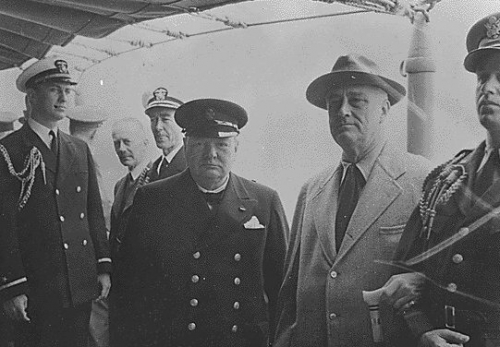
Na veertig jaar Koude Oorlog beginnen zich midden jaren ’80 de eerste tekenen stressfracturen af te tekenen in de globaal opererende machtsmachines van de twee supermachten. De rampen met de Challenger en Chernobyl (28 januari en 26 april 1986) laten duidelijk zien dat de symptomen van imperial overstretch niet langer te verbergen zijn. Escalerende economische chaos en toenemend politieke gezagsverlies dwingen beide supermachten tot ingrijpende binnenlandse maatregelen: Reaganomics en Perestrojka markeren de geopolitieke vloedlijn van de supermachten. Na de implosie van de Sovjet Unie is de Verenigde Staten de officiële winnaar van de Koude Oorlog maar de Pyrrus-kwaliteit van de formele overwinning blijkt uit het feit dat Amerika onvoorwaardelijk berust in de sensationele opkomst van de Chinese economische supermacht en zich effectief terugtrekt uit de eerder felomstreden Derde Wereld. Na de Amerikaanse nederlaag in Somalië (Black Hawk Down, 1993) vervalt Afrika in failed states en neo-tribale chaos. Na de Amerikaanse evacuatie uit Panama (Canal Zone Handover, 1999) wordt Latijns Amerika overgelaten aan Bolivarianismo en Marea Rosa.[19] De imperiale rat race tussen de soevereine natiestaten die begon met de Zevenjarige ‘Wereld Oorlog Nul’ (1756-63) mag dan zijn geëindigd met Amerika als last man standing, maar het opleggen van een authentiek-imperiale Pax Americana ligt ver buiten het bereik van Amerika’s geopolitieke intenties, ambities en capaciteiten. De met Wilsoniaanse retoriek ingeklede interventies van Bush Senior en Bush Junior in Irak in 1991 en 2003 waren geen exercities in principiële global governance, maar in pragmatische resource control. Na de zelfopheffing van de Sovjet Unie als supermacht concurrent en de afkondiging van de ‘nieuwe wereld orde’ (Bush Senior, 1991) besloot de Amerikaanse heersende klasse dat het ‘einde van de geschiedenis’ (Francis Fukuyama, 1992) gekomen is: zij schakelde over van Amerikanisme naar globalisme. Er ontstond zo een ‘wereld elite’, toegankelijk voor iedereen met heel veel geld en heel weinig moraliteit. Deze elite acht zich ontheven aan alle geopolitieke regels en wetmatigheden: staatsrechterlijke soevereiniteit, culturele eigenheid en etnische identiteit zijn in die optiek definitief achterhaalde fenomenen, obstakels op de door haar ingeslagen snelweg naar een Brave New World. Als geheel definieert zich deze nieuwe ‘globalistische’ elite los van alle etnische religieuze en culturele wortels: vanuit deze zelfgewilde ontworteling keert zij zich meteen tegen de rest van de nog wel gewortelde mensheid - tegen staten die nog soevereiniteit hebben, tegen culturen die nog essentie hebben en tegen volken die nog identiteit hebben. De globalistische vijandelijke elite is geboren.

Onder de dubbele banieren van neoliberalisme en cultuurmarxisme beschouwt de vijandelijke elite beschouwt het ‘achtergebleven’ menselijke ‘residu’ als weinig meer dan een oneindig ‘maakbare’ massa ‘mensenmateriaal’ dat kan worden gebruikt voor het aanvullen van banksaldi, het invullen van seksuele perversiteiten en het opvullen van existentiële leemtes. [La superclasse... domine à l’ère idéologique du néoliberalisme. Il n’est pas aisé de la définir : elle comporte évidemment les managers des grandes entreprises mondiales, les directeurs des grandes banques, de cheiks du pétrole ou des décideurs politiques voire quelques vedettes du cinéma ou de la littérature ou encore, en coulisses, des leaders religieux et des narcotrafiquants, qui alimentent le secteur bancaire en argent sale. Cette superclasse n’est pas stable : on y appartient pendant quelques années ou pendant une ou deux décennies puis on en sort, avec, un bon ‘parachute doré’. ...[N]umériquement insignifiante mais bien plus puissante que les anciennes aristocraties ou partitocraties, elle est totalement coupée des masses, dont elle détermine le destin. En dépit de tous les discours démocratiques, qui annoncent à cor et à cri l’avènement d’une liberté et d’une équité inégalées, le poids politique/économique des masses, ou des peuples, n’a jamais été aussi réduit. Son projet ‘globalitaire’ ne peut donc pas recevoir le label de ‘démocratique’. [De ‘superklasse’... domineert het tijdperk van de neoliberale ideologie. Het is niet gemakkelijk haar te definiëren: zij bestaat het duidelijkst uit de managers van de gro[ots]te multinationals, de directeuren van de gro[ots]te banken, de oliesjeiken [en bepaalde] politieke leiders, maar ook uit enkele filmsterren, intellectuelen en ‘spirituele leiders’ - en daarnaast uit een schimmiger personeelsbestand van [maffiabazen en] drugsbaronnen die de bankensector voeden met zwart geld. Deze ‘superklasse’ is verre van stabiel: men kan er enkele jaren of decennia toe behoren voordat men er weer uit valt - meestal met een ‘gouden parachute’. ...[N]umeriek is zij zeer klein, maar zij is machtiger dan alle voorafgaande aristocratieën en partitocratieën uit de menselijke geschiedenis. Zij is volledig afgesneden van de [volks]massa’s, waarvan zij het lot bepaalt. Ondanks het [publieke] discours dat continu spreekt over het aanbreken van weergaloze vrijheid en gelijkheid is het politieke [en] economische gewicht van de [volks]massa’s nog nooit [eerder in de geschiedenis] zo klein geweest. Het globalistische project [dat wordt nagestreefd door de ‘superklasse’] kan daarom in geen enkel opzicht ‘democratisch’ worden genoemd.] (p. 291)
De globalistische vijandelijke elite instrumentaliseert de militaire macht en politieke invloed van Amerika: zij wendt Amerikaanse macht en invloed aan voor globalistische doelen en wensen. Zij misbruikt het Amerikaans prestige, het Amerikaans vermogen en het Amerikaanse volk - dit is de diepste reden voor de anti-globalistische en nationalistische reactie die Donald Trump in het Witte Huis brachten. De vijandelijke elite opereert echter boven en achter Amerikaanse instituten als het presidentschap: in Amerika onttrekt de echte macht zich grotendeels aan institutionele controle en democratische correctie. De Washington swamp, de lying press en de deep state bepalen het beleid - het is voor de strijd tegen deze monsters dat het Amerikaanse volk Donald Trump tot president koos. De monsterlijke macht van de vijandelijke elite is echter zo groot dat ook twee jaar na Trump’s verkiezingsoverwinning de publieke sfeer nog steeds wordt gedomineerd door zijn vijanden. De onfatsoenlijke woede en openlijke sabotage waarmee de vijandelijke elite reageert op Trump is begrijpelijk: de globalistische vijandelijke elite valt en staat met haar grip op haar Amerikaanse instrumentarium. Alleen met controle over de Amerikaanse geldschepping, de Amerikaanse krijgsmacht en de Amerikaanse diplomatie is zij in staat de internationale geopolitieke chaos te handhaven waarin haar financiële belangen en ideologische waandenkbeelden gedijen.
Controle over Amerika is voor de globalistische vijandelijke elite vooral van belang voor het blijvend onderdrukken van haar potentieel machtigste vijand: Europa. Europa is een potentieel dodelijk gevaar voor het nihilistische en ontwortelde globalisme omdat het een ongeëvenaarde technologisch-industriële en sociaal-economische capaciteit combineert met authentieke cultuurhistorische en etnische worteling. Met het wegvallen van de Sovjet Unie eindigde de tweehoofdige ‘bewindvoering’ die aan het einde van de Tweede Wereld Oorlog werd opgelegd aan Europa. De geopolitieke opgave om Europa ‘klein te houden’ valt vervolgens toe aan Amerika alleen: de permanente verdragsmatige verzwakking van het verenigde Duitsland (vooral via monetaire convergentie met Frankrijk) en de Amerikaanse militaire expansie naar het oosten (vooral via uitbreiding van de NAVO) zijn basale ingrediënten van deze globalistische strategie. Toch blijkt deze strategie niet waterdicht: militaire aanwezigheid in Europa vergt een aanzienlijke en constante inspanning van een economisch en politiek mondiaal overbelast Amerika en zelfs de via de Europese eenheidsmunt (2002) afgedwongen tribuutplicht blijkt onvoldoende in staat de Duitse sociaaleconomische motor af te remmen. De EU expansie naar het voormalige Oostblok (2004) laat bovendien het gevaar herleven van een door Duitsland geleid semi-autarkisch geopolitiek blok - het tegenwerken van een dergelijk Mitteleuropa project was de hoofdreden van de Balkan ‘dwarsboom’ politiek waarmee de Triple Entente in 1914 de Eerste Wereld Oorlog provoceerde. Dit grotere geopolitieke perspectief geeft een heel andere duiding aan de in Amerika bedachte ‘Financiële Crisis’ van 2008, die leidde tot de economisch desastreuze en politiek destabiliserende ‘Europese Schuldencrisis’ van 2009, en aan de door Amerika geïnstigeerde ‘Arabische Lente’ van 2011, die leidde tot de Europese ‘Migratie Crisis’ van 2015.
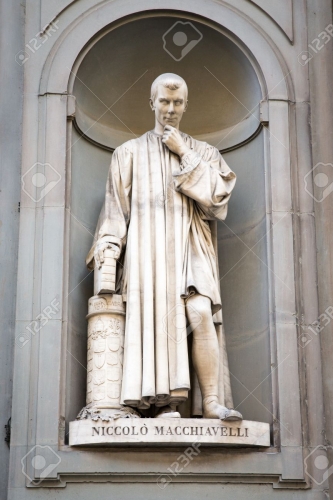 Deze duiding wordt het best verwoordt door Steuckers zelf: La globalisation, c’est... le maintien de l’Europe, et de l’Europe seule, en état de faiblesse structurelle permanente. Et cette faiblesse structurelle est due, à la base, à un déficit éthique entretenu, à un déficit politique et culturel. Il n’y a pas d’éthique collective, de politique viable ou de culture féconde sans ce que Machiavel et les anciens Romains, auxquels le Florentin se référait, appelaient des ‘vertus politiques’, le terme ‘vertu’ n’ayant pas le sens stupidement moraliste qu’il a acquis, mais celui, latin, de ‘force agissante’, de ‘force intérieure agissante’... [De globalisatie betekent dit: ...het gijzelen van Europa - en alleen van Europa - in een staat van permanente [en] structurele zwakte. En die zwakte is in essentie te wijten aan een doorlopend ‘ethisch tekort’ [dat zich vertaalt in] een politiek en cultureel tekortschieten. Een collectieve ethiek, een levensvatbare politiek [en] een vruchtbare cultuur zijn onmogelijk zonder wat Machiavelli, en de oude Romeinen waarop de Florentijn zi[jn denken] baseerde, de ‘politieke deugden’ noemden - waarbij de term ‘deugd’ niet de kortzichtige moralistische lading heeft die hij nu heeft, maar de [oorspronkelijk] Latijnse [betekenis] van ‘acterende kracht’ [en] ‘innerlijk sturende kracht’.] (p. 279-80) Terecht wijst Steuckers op de door globalistische cognitieve oorlogsvoering bewerkstelligde ‘ethisch tekort’ van Europa: het is dit tekort aan politieke deugd, doelbewustheid en daadkracht dat Europa verlamt. Dit tekort maakt psycho-historische catharsis, geopolitieke assertiviteit en decisionistische zelfverdediging onmogelijk: het maakt Europa machteloos tegen de acute existentiële bedreigingen van opzettelijk gestuurde sociale implosie, massa-immigratie en jihadistische terreur. Dit globalistisch ‘anti-European’ Europa verwezenlijkt zich door de verinnerlijking van het cognitieve-dissonante globalistische mainstream media discours van zelfdestructief geïnterpreteerde ‘mensenrechten’, ‘multiculturaliteit’ en ‘diversiteit’. L’arme principale qui est dirigée contre l’Europe est donc un ‘écran moralisateur’, à sens unique, légal et moral, composé d’images positives, de valeurs dites occidentales et d’innocences prétendues menacées, pour justifier des campagnes de violence politique illimitée. [Het voornaamste wapen dat gericht is tegen Europa is een uniek ‘moralistisch [televisie- en beeld]scherm’ dat [specifieke] juridische en morele ‘waarden’ [afdwingt via] het positieve ‘frame’ van zogenaamde ‘westerse waarden’ en gepretendeerde ‘bedreigde onschuld’ voor het goedpraten van een [systematische] campagne van eindeloze politieke terreur.] (p.281)
Deze duiding wordt het best verwoordt door Steuckers zelf: La globalisation, c’est... le maintien de l’Europe, et de l’Europe seule, en état de faiblesse structurelle permanente. Et cette faiblesse structurelle est due, à la base, à un déficit éthique entretenu, à un déficit politique et culturel. Il n’y a pas d’éthique collective, de politique viable ou de culture féconde sans ce que Machiavel et les anciens Romains, auxquels le Florentin se référait, appelaient des ‘vertus politiques’, le terme ‘vertu’ n’ayant pas le sens stupidement moraliste qu’il a acquis, mais celui, latin, de ‘force agissante’, de ‘force intérieure agissante’... [De globalisatie betekent dit: ...het gijzelen van Europa - en alleen van Europa - in een staat van permanente [en] structurele zwakte. En die zwakte is in essentie te wijten aan een doorlopend ‘ethisch tekort’ [dat zich vertaalt in] een politiek en cultureel tekortschieten. Een collectieve ethiek, een levensvatbare politiek [en] een vruchtbare cultuur zijn onmogelijk zonder wat Machiavelli, en de oude Romeinen waarop de Florentijn zi[jn denken] baseerde, de ‘politieke deugden’ noemden - waarbij de term ‘deugd’ niet de kortzichtige moralistische lading heeft die hij nu heeft, maar de [oorspronkelijk] Latijnse [betekenis] van ‘acterende kracht’ [en] ‘innerlijk sturende kracht’.] (p. 279-80) Terecht wijst Steuckers op de door globalistische cognitieve oorlogsvoering bewerkstelligde ‘ethisch tekort’ van Europa: het is dit tekort aan politieke deugd, doelbewustheid en daadkracht dat Europa verlamt. Dit tekort maakt psycho-historische catharsis, geopolitieke assertiviteit en decisionistische zelfverdediging onmogelijk: het maakt Europa machteloos tegen de acute existentiële bedreigingen van opzettelijk gestuurde sociale implosie, massa-immigratie en jihadistische terreur. Dit globalistisch ‘anti-European’ Europa verwezenlijkt zich door de verinnerlijking van het cognitieve-dissonante globalistische mainstream media discours van zelfdestructief geïnterpreteerde ‘mensenrechten’, ‘multiculturaliteit’ en ‘diversiteit’. L’arme principale qui est dirigée contre l’Europe est donc un ‘écran moralisateur’, à sens unique, légal et moral, composé d’images positives, de valeurs dites occidentales et d’innocences prétendues menacées, pour justifier des campagnes de violence politique illimitée. [Het voornaamste wapen dat gericht is tegen Europa is een uniek ‘moralistisch [televisie- en beeld]scherm’ dat [specifieke] juridische en morele ‘waarden’ [afdwingt via] het positieve ‘frame’ van zogenaamde ‘westerse waarden’ en gepretendeerde ‘bedreigde onschuld’ voor het goedpraten van een [systematische] campagne van eindeloze politieke terreur.] (p.281)
In Europa wordt dit globalistische discours exemplarisch geïnternaliseerd en prioritair vertegenwoordigd door de soixante-huitard generatie die zich na haar ‘lange mars door de instituties’ het monopolie op de politieke macht heeft toegeëigend. Pendant les années de leur traversée du désert, ...les [utopistes]de [la] génération soixante-huitard] feront... un ‘compromis historique’ qui repose, ...premièrement, sur un abandon du corpus gauchiste, libertaire et émancipateur, au profit des thèses néolibérales, deuxièmement, sur une instrumentalisation de l’idée freudo-sartienne de la ‘culpabilité’ des peuples européens, responsables de toutes les horreurs commises dans l’histoire, et troisièmement, sur un pari pour toutes les démarches ‘mondialisatrices’, même émanant d’instances capitalistes non légitimées démocratiquement ou d’institution comme la Commission Européenne, championne de la ‘néolibéralisation’ de l’Europe, dont le pouvoir n’est jamais sanctionné par une élection. [Gedurende hun jaren in de woestijn... maakten de [utopisten] van de [‘achtenzestig’] generatie... een ‘historisch compromis’ dat berust... op [drie complementaire strategieën:] (1) een verraad van hun linkse [kern]gedachtegoed [van] bevrijding en emancipatie ten gunste van het neoliberalisme, (2) een [politieke] toepassing van het Freudiaans-Sartriaanse idee van de ‘schuld’ van de Europese volkeren, [die zo] verantwoordelijk [worden gehouden] voor alle misdaden van de geschiedenis en (3) een inzet op ‘globaliserende’ processen - zelfs [als die processen] worden gedreven door [on]democratische [en] illegitieme kapitalistische machten of door institutie[s] als de Europese Commissie, die [zich heeft opgeworpen] als kampioen van de ‘neoliberalisatie’ van Europe en waarvan de macht nog nooit door een verkiezing is goedgekeurd.[20]] (p.293) Dit ideologische verraad en globalistische deze collaboratie, de standaard modaliteiten van de Europese vijandelijke elite, hebben de Europese beschaving aan de rand van de afgrond gebracht.

Steuckers wijst op de functionaliteit van het verraad van de Europese soixante-huitards ten aanzien van de globalistische geopolitiek: dit verraad levert Europa over aan het de facto monsterverbond tussen twee essentieel anti-Europese globalistische krachten: het liberaal-normativisme, gesymboliseerd in het Amerikaanse ‘Puritanisme’, en het islamisme, gesymboliseerd in het Saoedische ‘Wahhabisme’. Aujourd’hui, nous faisons face à l’alliance calamiteuse de deux fanatismes religieux : le wahhabisme, visibilisé par les médias, chargé de tous les péchés, et le puritanisme américain, camouflé derrière une façade ‘rationnelle’ et ‘économiste’ et campé comme matrice de la ‘démocratie’ et de toute ‘bonne gouvernance’. Que nous ayons affaire à un fanatisme salafiste ou hanbaliste qui rejette toutes les synthèses fécondes, génératrice et façonneuses d’empires, qu’elles soient byzantino-islamiques ou irano-islamisées ou qu’elles se présentent sous les formes multiples de pouvoir militaire équilibrant dans les pays musulmans, ou que nous ayons affaire à un fanatisme puritain rationalisé qui entend semer le désordre dans tous ces états de la planète, que ces états soient ennemis ou alliés, parce que ces états soumis à subversion ne procèdent pas de la même matrice mentale, nous constatons que toutes nos propres traditions européennes... sont considérées par ces fanatismes contemporains d’au-delà de l’Atlantique ou d’au-delà de la Méditerranée comme émanations du Mal, comme des filons culturels à éradiquer pour retrouver une très hypothétique pureté, incarnée jadis par les pèlerins du ‘Mayflower’ ou par les naturels de l’Arabie du VIIIe siècle. [In het huidige tijdsbestek hebben we te maken met een rampspoedig [globalistisch, anti-Europees] bondgenootschap tussen twee religieuze fanatismes: het Wahhabisme,[21] zoals gevisualiseerd en als ‘zondig’ bestempeld door de [mainstream] media, en het Amerikaanse puritanisme, gecamoufleerd achter een ‘rationele’ en ‘economische’ façade en voorgesteld als vast referentie ‘frame’ voor ‘democratie’ en ‘behoorlijk bestuur’. Of we nu te maken hebben met vormen van ‘Salafistisch’ of ‘Hanbalitisch’ fanatisme[22] dat een punt zet achter de vruchtbare, creatieve en imperium-scheppende byzantijns-islamitische of iraans-islamitische syntheses, of met vormen van puriteins-gerationaliseerd en militair-hegemoniaal fanatisme dat over de hele wereld chaos schept (bij bevriende zowel als vijandelijke staten, want alle aan die hegemonie onderworpen staten vertegenwoordigen andersoortige mentale werelden): wij moeten constateren dat onze eigen Europese tradities... onverenigbaar zijn die fanatismes van de overzijde van de Atlantische Oceaan en Middellandse Zee. Die hedendaagse fanatismes beschouwen [onze tradities] als incarnaties van het [pure] Kwaad [en] als cultuuruitingen die moeten worden bestreden met het - overigens zeer hypothetische - puurheid die wordt belichaamt in de Pilgrim Fathers van de ‘Mayflower’[23] en de bons sauvages[24] van de 8e eeuwse Arabische binnenlanden]. (p. 261-2)
De totalitair-regressieve fanatismes van het ‘Puristisch’ liberaal-normativisme en het ‘Wahhabistisch’ islamisme zullen emotioneel, intellectueel en spiritueel moeten worden overwonnen als de Europese beschaving en de Europese volkeren de Crisis van het Moderne Westen willen overleven. De therapie die op dit kritieke punt vanuit Traditionalistisch oogpunt momenteel de grootste kans van slagen biedt is een politiek-filosofische ‘noodgreep’: de nooduitgang van het Archeo-Futuristisme.
4.
Het Archeo-Futuristisch alternatief
(politiek-filosofische therapie)
Lo, all our pomp of yesterday
Is one with Nineveh and Tyre!
Judge of the Nations, spare us yet.
Lest we forget - lest we forget!
- Rudyard Kipling
Het Archeo-Futuristische alternatief voor het globalistische anti-Europese ‘EU project’ is een gelijktijdig teruggrijpen en vooruitprojecten van een Traditionalistisch concept dat lang een vitale rol heeft gespeeld in de Europese geschiedenis en dat weer kan doen: de Europese Rijksgedachte. Het gaat hierbij om een concept dat strikt genomen boven-historisch is daarom te allen tijde kan herleven. Het ideologisch misbruik en de historiografische misinterpretatie van de Europese Rijksgedachte door het 19e en 20e eeuwse (hyper-)nationalisme - meest recent in het ‘Derde Rijk’ - doet niets af aan de boven-historische vitaliteit ervan. Steuckers wijst in dat verband op het essentieel belang van een juist begrip van het Traditionalistische gedachtegoed waarvan de Rijksgedachte deel uitmaakt. Het Traditionalisme stelt namelijk dat alle collectieve (taalkundige, religieuze, etnische, nationale) identiteiten, en de horizontaal (werelds, fysiek) ervaren verschillen daartussen, organisch onderdeel (kunnen, moeten, zullen) zijn van grotere, synergetisch unieke entiteiten met een hogere verticale, transcendent (spiritueel, psychologisch) ervaren, functionaliteit. Deze entiteit kan worden betiteld als Imperium, ofwel ‘Rijk’ - in het Avondland als het ‘Europese Rijk’. Het numineuze karakter ervan is onmiddellijk aantoonbaar in het feit dat het ontzag inspireert in degenen die er zich op natuurlijke wijze deel van voelen - en dat het angst inspireert in degenen die het onwaardig zijn.
Pour résumer brièvement la position traditional[iste],... disons que les horizontalités modernes ne permettent pas le respect de l’Autre, de l’être-autre. Si l’Autre est jugé dérangeant, inopportun dans son altérité, il peut être purement et simplement éliminé ou mis au pas, sans le moindre respect de son altérité, car l’horizontalité fait de tous des ‘riens ontologiques’, privés de valeur intrinsèque. Tel est l’aboutissement de la logique égalitaire, propre des idéologies et des systèmes qui ont voulu usurper et éradiquer la tradition ‘reichique’ : si tout vaut tout dans l’intériorité de l’homme, ou même dans sa constitution physique, cela signifie, finalement, que plus rien n’a de valeur spécifique, et si une valeur spécifique cherche à pointer envers et contre tout, elle sera vite considérée comme une anomalie qui appelle l’extermination. L’intervention fanatique et sanglante de ‘colonnes infernales’. La verticalité, en revanche, implique le devoir de protection et de respect, un devoir de servir les supérieurs et un devoir des supérieurs de protéger les inférieurs, dans un rapport comparable à celui qui existe, dans les sociétés et les familles traditionnelles, entre parents et enfants. La verticalité respecte les différences ontologiques et culturelles ; elle ne les considère pas comme des ‘riens’ qui ne méritent ni considération ni respect. [Om het tradition[alistische] standpunt samen te vatten... kan men stellen dat de modern[istische] horizontaliteit een [waarachtig] respect van de Ander en het anders-zijn onmogelijk maakt. Wanneer de Ander in zijn anders-zijn [slechts] als storend [en] inopportuun wordt beoordeeld, dan kan hij simpelweg worden geëlimineerd of worden weggezet zonder het minste respect voor zijn anders-zijn: de [modernistische] horizontaliteit reduceert immers alle [vormen van authentieke] identiteit tot een ‘ontologisch nulwaarde’ zonder intrinsieke waarde. Dat is het [onvermijdelijke] eindresultaat van de egalitaire logica die ligt achter de ideologieën en systemen die de rijkstraditie willen vervangen en uitwissen. Als alles alleen maar afhangt van het innerlijk van de mens, of zelfs alleen maar van zijn fysieke constitutie, dan blijft er uiteindelijk niets van specifieke waarde over. Wanneer een specifieke waarde in de tegenovergestelde [niet-egalitaire] richting wijst tegen het [‘algemene belang’ in], dan wordt zij al snel gezien als een ‘afwijking’ die moet worden geëlimineerd. Dit [resulteert] in de fanatieke en bloedige interventie van de ‘helse colonnes’[25] [van het modernistische collectivisme]. Daartegenover staat de [Traditionalistische] verticaliteit die uitgaat van de verplichting tot bescherming van en respect voor [de Ander]. [Dat is] de verplichting [van lager gestelden] om hoger gestelden te dienen en de verplichting van hoger gestelden om lager gestelden te beschermen in een verhouding die vergeleken kan worden met die tussen ouders en kinderen in traditionele gemeenschappen en families. Deze verticaliteit respecteert ontologische verschillen en de culturele [uitdrukkingen daarvan]: zij reduceert ze niet tot ‘[ontologische] nulwaarden’ die geen consideratie en respect verdienen.] (p. 157)

De Traditionalistische Rijksgedachte behelst dus een holistische visie waarin alle collectieve en individuele [authentieke] identiteiten op organische wijze worden ingepast in een groter geheel van synergetische meerwaarde. Il faut enfin... que chaque communauté et chaque individu aient conscience qu’ils gagnent à demeurer dans l’ensemble impéria[ux]au lieu de vivre séparément. Tâche éminemment difficile qui souligne la fragilité des édifices impériaux : Rome a su maintenir un tel équilibre pendant les siècles, d’où la nostalgie de cet ordre jusqu’à nos jours. ...[L]a civitas de l’origine... de l’Urbs, la Ville initiale de l’histoire impériale, ...s’est étendue à l’Orbis romanus. Le citoyen romain dans l’empire signale son appartenance à cet Orbis, tout en conservant sa natio et sa patria, appartenance à telle nation ou telle ville de l’ensemble constitué par l’Orbis. [Het is uiteindelijk noodzakelijk... dat elke gemeenschap en ieder individu zich ervan bewust zijn dat zij er meer bij gebaat zijn vast te houden aan het imperiale geheel dan afzonderlijk te leven. [Dit is] een zeer ingewikkelde opgave die de kwetsbaarheid van [alle] imperiale projecten onderstreept: Rome wist eeuwenlang een dergelijke balans te handhaven - vandaar de nostalgie naar de [Romeinse] orde die voortduurt tot op de dag van vandaag. ...[D]e originele civitas... van de Urbs waaruit [men] stamt, [dat wil zeggen] de Stad vanwaaruit de imperiale geschiedenis zich ontplooide... breidde zich [met het Romeinse rijk] uit tot een Orbis romanus. Onder het [Romeinse] keizerrijk duidde het Romeins burgerschap op een identificatie met die Orbis, met behoud van de eigen natio en het eigen patria, [dat wil zeggen] met een [blijvend] toebehoren aan een bepaalde natie of vaderland binnen het geheel van die Orbis.] (p.129-31) D’abord, il faut préciser que le ‘Reich’ n’est pas une nation, même s’il est porté, en théorie, par un populus (le populus romanus) ou une ‘nation’ (la deutsche Nation) : ...[c’est] n’est pas [une chose] nationaliste, [c’est] même [une chose] anti-nationaliste. [I]l n’a rien contre les sentiments d’appartenance nationale, contre la fierté d’appartenir à une nation. De tels sentiments sont positifs... mais doivent être transcendés par une idée. Cette transcendance conduit à une verticalité, qui oppose à toutes les formes modernes d’horizontalité, ce qui est, par ailleurs, le noyau idéel, de toutes les traditions... [Vooraf moet worden vastgesteld dat een ‘Rijk’ geen natie is, zelfs als het in theorie door een populus ([een ‘volk’ zoals] het populus romanus) of door een natie ([een natie zoals] de deutsche Nation) wordt gedragen: ...[het Rijk] is niet nationalistisch, [het is] zelfs anti-nationalistisch. [H]et heeft niets tegen het identiteit bepalende [collectieve] nationalistisch sentiment [of] tegen de [individuele] trots op het behoren tot een natie. Zulke sentimenten zijn positief... maar dienen te worden overstegen door het [nog hogere imperiale] idee. Deze transcendentie leidt tot een verticaliteit die zich afzet tegen alle moderne vormen van horizontaliteit - deze [verticaliteit] is uiteindelijk de ideële kern van alle [authentieke T]radities.] (p. 156-7)
Het praktische samengaan van collectieve en individuele identiteiten wordt gerealiseerd in de politieke toepassing van het Traditionalistische beginsel van subsidiariteit (een laatste spoor daarvan is in de Nederlandse Traditie terug te vinden in het anti-revolutionaire principe van ‘soevereiniteit in eigen kring’). ...[L]e principe de ‘subsidiarité’, tant évoqué dans l’Europe actuelle mais si peu mis en pratique, renoue avec un respect impérial des entités locales, des spécificités multiples que recèle le monde vaste et diversifié. [...Het beginsel van ‘subsidiariteit’, waaraan men vaak refereert in het hedendaagse Europe maar dat men zelden in de praktijk brengt, kan [nieuw] imperiaal [ondersteund] respect geven aan de lokale gemeenschappen [en] specifieke identiteiten die horen bij de echte wereld van enorme [authentiek-gewortelde] diversiteit.] (p. 139)
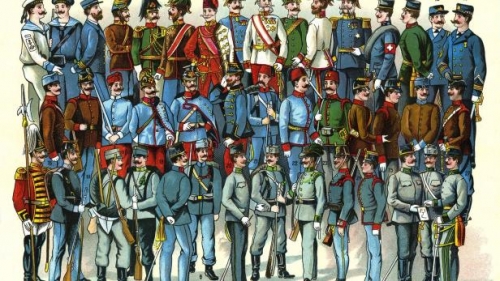
In relatie tot de Rijksgedachte zijn ‘identiteitspolitiek’, ‘multiculturaliteit’ en ‘diversiteit’ non-issues: ze worden organisch ‘opgelost’ door sublimatie in de hogere functionaliteit van het Rijk. L’empire est donc fait de multiplicités, de différences, qui n’ont rien de commun avec la fausse multiculturalité vantée par les médias d’aujourd’hui. Cette multiculturalité, escroquerie idéologique, relève justement de cette horizontalité qui vise à vider tous les hommes, autochtones et allochtones, de leur substance ontologique. Cette multiculturalité tue l’essentiel qui vit en l’homme. Toute politique qui cherche à la promouvoir est une politique criminelle, exterministe... [Een Rijk behelst dus [altijd complexe] meervoudigheden [en] diversiteiten die niets gemeen hebben met de valse ‘multiculturaliteit’ die wordt aangeprezen door de [mainstream] media van vandaag. Deze [namaak-] multiculturaliteit is een ideologisch bedrog dat voortvloeit uit de [modernistische] horizontaliteit die bedoeld is om alle mensen - autochtoon zowel als allochtoon - the ontdoen van hun ontologische substantie. Deze multiculturaliteit doodt de essentie die leeft in de mens. Alle politiek die haar wil bevorderen is een criminele - en etnocidale - politiek...] (p.158) Het is een ironisch feit dat de Traditionalistische Rijksgedachte en Rijksgemeenschap effectief veel meer tolerantie en vrijheid bieden dan de modernistische ‘diversiteit’ en ‘democratie’ dat ooit zouden kunnen.
5.
Sacrum Imperium
(neo-imperiale therapie)
Hier die Manen hehrer Krieger
Seien euch ein Musterbild
Führen euch vom Kampf als Sieger
- Joseph Hartmann Stuntz[26]
De Westerse beschaving is gebaseerd op een kwetsbare balans tussen elkaar aanvullende authentieke identiteiten die samen synergische meerwaarde krijgen via historische interacties. Deze meerwaarde kan worden uitgedrukt in de ‘hyper-boreale’ archetypen van Techne (technische bevrijding), Nomos (juridische bevrijding) en Evangelion (spirituele bevrijding).[27] Maar deze meerwaarde en de beschaving waarop zij is gebaseerd vergen constante bescherming en bewaking - dit is de basis van de Traditionalistisch Europese Rijksgedachte. En Europe, les structures de type impérial sont... une nécessité, afin de maintenir la cohérence de l’aire civilisationnelle européenne, dont la culture a jailli du sol européen, afin que tous les peuples au sein de cette aire civilisationnelle, organisée selon les principes impériaux, puissent avoir un avenir. [In Europa zijn structuren van het imperiale type... onontbeerlijk om de cohesie te beschermen van de Europese beschavingssfeer die is ontsproten aan de Europese grond - en om aan de binnen die beschavingssfeer inheemse volkeren een toekomst[perspectief] te bieden door een haar te [re]organiseren volgens imperiale principes.] (p. 214) Een dubbel idealistische en realistische - Archeo-Futuristische - heroverweging van de Rijksgedachte is van essentieel belang ter bescherming van de Europese volkeren en van hun gezamenlijke beschaving. De uitbreiding van de Europese Rijksgedachte tot de overzeese Europees-stammige volkeren is daarbij een logische volgende stap: deze stap is reeds Archeo-Futuristisch uitgewerkt in het concept van de ‘Boreale Alliantie’. Op globale schaal zou een dergelijke alliantie natuurlijke bondgenoten vinden in de twee andere Indo-Europese Rijksgedachten: de Perzische en Indische: een Archeo-Futuristische exploratie van dit thema is te vinden in Jason Jorjani’s concept van de World State of Emergency. De alternatieve geopolitiek die past bij deze Archeo-Futuristische heroverwegingen wordt al concreet onderzocht in de anti-globalistische Neo-Eurazianistische beweging.[28]
 Het is de taak van het Traditionalisme om de gezamenlijke ‘Hogere Roeping’ van de Europese volkeren in herinnering te brengen wanneer deze bedreigd wordt.[29] Steuckers voldoet hieraan door de Traditionalistische visie van Europa eenduidig te neer te zetten: L’Europe, c’est une perception de la nature comme épiphanie du divin... L’Europe, c’est également une mystique du devenir et de l’action... L’Europe, c’est une vision du cosmos où l’on constate l’inégalité factuelle de ce qui est égal en dignité ainsi qu’une pluralité de centres... [C’est] une nouvelle vision de l’homme, impliquant la responsabilité pour l’autre, pour l’écosystème, parce que, ... sur [c]es bases philosophiques, ...l’homme... est un collaborateur de Dieu et un miles imperii, un soldat de l’empire. Le travail n’est plus malédiction ou aliénation mais bénédiction et octroi d’un surplus de sens au monde. La technique est service à l’homme, à autrui... La construction de l’Europe... nécessite de revitaliser une ‘citoyenneté d’action’, où l’on retrouve la notion de l’homme coauteur de la création divine et l’idée de responsabilité. [Het [Traditionalistisch] ‘Europa’ is een visioen waarin de natuurlijke wereld als Goddelijke Epifanie geldt... [Dit] Europa is een mysterie in wording en werking... [Dit] Europa is een kosmisch visioen dat de feitelijke ongelijkheid erkent van alles dat gelijk is in waardigheid en daarmee ook van [cultuurhistorische en geopolitieke] multipolariteit... [Dit] nieuwe visioen van mens-zijn impliceert verantwoordelijkheid voor [alles dat] anders [en] voor het [hele natuurlijke en menselijke] ecosysteem omdat... op de filosofische basis [van dit visioen]... de mens een medewerker is van God - een miles imperii, een soldaat van het [goddelijk ingestelde] Rijk. Hier is werk niet langer vloek of vervreemding,[30] maar een zegen en een octrooi voor [een hoger] verantwoordelijkheidsbesef voor de [hele schepping]. [Hierbij] staat de techniek ten dienste van de mens - [en] van de ander...[31] De constructie van Europa... vereist een herleven van ‘activistisch burgerschap’ waarin men het idee terugvindt van de mens als medewerker aan de Goddelijke Schepping - en het idee van [zijn uit zijn authentieke identiteit voortvloeiende kosmische] verantwoordelijkheid.] (p. 138-9) Het is duidelijk dat de Hogere Roeping van de Europese volkeren niet stopt aan de geografische grenzen van het Europese subcontinent: zij geldt ook voor de Europees-stammige volkeren die zich over deze grenzen heen hebben begeven en zich overzees hebben gevestigd in boreale en australe regionen.
Het is de taak van het Traditionalisme om de gezamenlijke ‘Hogere Roeping’ van de Europese volkeren in herinnering te brengen wanneer deze bedreigd wordt.[29] Steuckers voldoet hieraan door de Traditionalistische visie van Europa eenduidig te neer te zetten: L’Europe, c’est une perception de la nature comme épiphanie du divin... L’Europe, c’est également une mystique du devenir et de l’action... L’Europe, c’est une vision du cosmos où l’on constate l’inégalité factuelle de ce qui est égal en dignité ainsi qu’une pluralité de centres... [C’est] une nouvelle vision de l’homme, impliquant la responsabilité pour l’autre, pour l’écosystème, parce que, ... sur [c]es bases philosophiques, ...l’homme... est un collaborateur de Dieu et un miles imperii, un soldat de l’empire. Le travail n’est plus malédiction ou aliénation mais bénédiction et octroi d’un surplus de sens au monde. La technique est service à l’homme, à autrui... La construction de l’Europe... nécessite de revitaliser une ‘citoyenneté d’action’, où l’on retrouve la notion de l’homme coauteur de la création divine et l’idée de responsabilité. [Het [Traditionalistisch] ‘Europa’ is een visioen waarin de natuurlijke wereld als Goddelijke Epifanie geldt... [Dit] Europa is een mysterie in wording en werking... [Dit] Europa is een kosmisch visioen dat de feitelijke ongelijkheid erkent van alles dat gelijk is in waardigheid en daarmee ook van [cultuurhistorische en geopolitieke] multipolariteit... [Dit] nieuwe visioen van mens-zijn impliceert verantwoordelijkheid voor [alles dat] anders [en] voor het [hele natuurlijke en menselijke] ecosysteem omdat... op de filosofische basis [van dit visioen]... de mens een medewerker is van God - een miles imperii, een soldaat van het [goddelijk ingestelde] Rijk. Hier is werk niet langer vloek of vervreemding,[30] maar een zegen en een octrooi voor [een hoger] verantwoordelijkheidsbesef voor de [hele schepping]. [Hierbij] staat de techniek ten dienste van de mens - [en] van de ander...[31] De constructie van Europa... vereist een herleven van ‘activistisch burgerschap’ waarin men het idee terugvindt van de mens als medewerker aan de Goddelijke Schepping - en het idee van [zijn uit zijn authentieke identiteit voortvloeiende kosmische] verantwoordelijkheid.] (p. 138-9) Het is duidelijk dat de Hogere Roeping van de Europese volkeren niet stopt aan de geografische grenzen van het Europese subcontinent: zij geldt ook voor de Europees-stammige volkeren die zich over deze grenzen heen hebben begeven en zich overzees hebben gevestigd in boreale en australe regionen.
Naar binnen toe vereist dit visioen een individuele zelfdiscipline, een individuele arbeidsethos en een individuele acceptatie van hiërarchische orde - en dus een omkering van de narcistische, hedonistische en collectivistische levenshouding die wordt bevorderd en bestendigd in het liberaal-normativisme dat nu dominant is in het postmoderne Westen. Dit betekent een overgang naar een nieuwe existentiële realiteit die wordt beheerst door authentieke normen en waarden - en door een legitieme Autoriteit. In de Europese Traditie draagt die Autoriteit, in navolging van zijn Romeinse archetype, de titel ‘keizer’.[32] Dans la conception [traditionaliste] hiérarchique des êtres et des fins terrestres... l’empire constituait le sommet, l’exemple impassable pour tous les autres ordres inférieurs de la nature. De même, l’empereur, également au sommet de cette hiérarchie par la vertu de sa titulaire, doit être un exemple pour tours les princes du monde, non pas en vertu de son hérédité, mais de supériorité intellectuelle, de son connaissance ou des ses connaissances. Les vertus impériales sont justice, vérité, miséricorde et constance... [In de [Traditionalistische] hiërarchische opvatting van wereldse wezens en wensen... vertegenwoordigt het Rijk het hoogste doel, het onevenaarbare voorbeeld voor alle lagere natuurlijke ordeningen. Dit betekent dat de keizer, die op grond van zijn titel aan de top van deze hiërarchie staat, een voorbeeld stelt voor alle [overige] prinsen van de wereld - niet op grond van zijn afstamming, maar [op grond] van zijn intellectuele superioriteit en van zijn kundigheid en inzichten. [In hem worden de] imperiale [‘politieke] deugden’ van rechtvaardigheid, waarheid, mededogen en standvastigheid verwezenlijkt]. (p. 136) Vanzelfsprekend is een als zodanig herkenbare legitieme Autoriteit bijna onvoorstelbaar in de huidige Europese context, maar toch is dit ideaalbeeld van deze Autoriteit onontbeerlijk als vast referentiepunt. Ditzelfde geldt tot op zekere hoogte voor de Rijksgedachte zelf: in het huidige politiek-filosofisch discours is deze gedachte eerst en vooral een experiment waarmee een bestemming en een koers kunnen worden bepaald voor de patriottisch-identitaire beweging. Op dezelfde manier dat het ‘Koninkrijk der Hemelen’ als referentiepunt dient voor de Hogere Roeping van het Christendom, zo dient de Europese Rijksgedachte als referentiepunt voor de Europese beschaving – ook als het ideaal nog niet is verwezenlijkt in het hier en nu. De oude Traditionalistische Rijksgedachte dient hierbij als voorbeeld voor een nieuwe Archeo-Futuristische Rijksgedachte. De hiërarchische politieke filosofie van het Neo-Eurazianisme kan ook hierbij een brugfunctie vervullen.
 Naar buiten toe vereist de Traditionalistische Rijksgedachte collectief zelfbewustzijn, collectieve trots en collectieve opofferingsbereidheid. Het is daarbij belangrijk te benadrukken dat de Rijksgedachte, zoals die wordt gehandhaafd door de hoogste bevelsautoriteit, zich positief - als letterlijke meerwaarde - verhoudt tot de verschillende authentieke identiteiten die met subsidiaire waarborgen worden bewaard binnen het Rijk. Een Traditionalistisch gedefinieerd Europees - of groter: Westers - Rijk doet niets af aan de specifieke taalkundige, godsdienstige, culturele en etnische identiteiten die erbinnen blijven bestaan: het voegt een identiteit toe, namelijk een Europese - of zelfs Westerse. Deze identiteit is dan niet dominant naar binnen (in de individuele voorstelling), maar wel naar buiten: naar buiten vertegenwoordigt zij een collectieve wil. Dat wil zeggen: het Rijk vertegenwoordigt naar buiten een absolute standaard, uitgedrukt in fysieke grenzen. De liberaal-normativistische illusie van globalistische ‘universele waarden’ en de ‘open grenzen’ zijn onverenigbaar met de effectieve handhaving van de klassieke beschavingsnormen die worden belichaamd in Traditionalistische Rijksgedachte. L’empire se conçoit comme un ordre, entouré d’un chaos menaçant, niant par là même que les autres puissent posséder eux-mêmes leur ordre ou qu’il ait quelque valeur. Chaque empire s’affirme plus ou moins comme le monde essentiel, entouré de mondes périphériques réduits à des quantités négligeables. L’hégémonie universelle concerne seulement “l’univers qui vaut quelque chose”. Rejeté dans les ténèbres extérieures, le reste est une menace dont il faut se protéger. [Het Rijk concipieert zichzelf als een orde die wordt omgeven door een dreigende chaos - [de Rijksgedachte] ontkent daarmee feitelijk dat andere [beschavingen] zelf een eigen orde met zelfstandige waarde kunnen hebben. Ieder Rijk ziet zichzelf min of meer als een ‘wereld op zich’, omgeven door tot op verwaarloosbare eenheden teruggebrachte ‘perifere werelden’.[33] Universele hegemonie wordt alleen gezocht binnen de sfeer van het als [exclusief] waardevol erkende [eigen] universum. De resterende [realiteit wordt] verstoten naar de Buitenste Duisternis en is niet anders dan een dreiging waartegen men zich moet beschermen.[34]] (p. 129)
Naar buiten toe vereist de Traditionalistische Rijksgedachte collectief zelfbewustzijn, collectieve trots en collectieve opofferingsbereidheid. Het is daarbij belangrijk te benadrukken dat de Rijksgedachte, zoals die wordt gehandhaafd door de hoogste bevelsautoriteit, zich positief - als letterlijke meerwaarde - verhoudt tot de verschillende authentieke identiteiten die met subsidiaire waarborgen worden bewaard binnen het Rijk. Een Traditionalistisch gedefinieerd Europees - of groter: Westers - Rijk doet niets af aan de specifieke taalkundige, godsdienstige, culturele en etnische identiteiten die erbinnen blijven bestaan: het voegt een identiteit toe, namelijk een Europese - of zelfs Westerse. Deze identiteit is dan niet dominant naar binnen (in de individuele voorstelling), maar wel naar buiten: naar buiten vertegenwoordigt zij een collectieve wil. Dat wil zeggen: het Rijk vertegenwoordigt naar buiten een absolute standaard, uitgedrukt in fysieke grenzen. De liberaal-normativistische illusie van globalistische ‘universele waarden’ en de ‘open grenzen’ zijn onverenigbaar met de effectieve handhaving van de klassieke beschavingsnormen die worden belichaamd in Traditionalistische Rijksgedachte. L’empire se conçoit comme un ordre, entouré d’un chaos menaçant, niant par là même que les autres puissent posséder eux-mêmes leur ordre ou qu’il ait quelque valeur. Chaque empire s’affirme plus ou moins comme le monde essentiel, entouré de mondes périphériques réduits à des quantités négligeables. L’hégémonie universelle concerne seulement “l’univers qui vaut quelque chose”. Rejeté dans les ténèbres extérieures, le reste est une menace dont il faut se protéger. [Het Rijk concipieert zichzelf als een orde die wordt omgeven door een dreigende chaos - [de Rijksgedachte] ontkent daarmee feitelijk dat andere [beschavingen] zelf een eigen orde met zelfstandige waarde kunnen hebben. Ieder Rijk ziet zichzelf min of meer als een ‘wereld op zich’, omgeven door tot op verwaarloosbare eenheden teruggebrachte ‘perifere werelden’.[33] Universele hegemonie wordt alleen gezocht binnen de sfeer van het als [exclusief] waardevol erkende [eigen] universum. De resterende [realiteit wordt] verstoten naar de Buitenste Duisternis en is niet anders dan een dreiging waartegen men zich moet beschermen.[34]] (p. 129)
6.
Ex oriente lux
(psycho-historische therapie)
Wees gegroet, Hoge Prins!
Op de noordwesten wind hebben wij naar u gezocht
Aan u offeren wij nu onze sterfelijkheid
U bent onze Eedhouder!
- vrij vertaald uit Hereditary
Een effectieve Archeo-Futuristische therapie voor de psycho-historische zelfverminking van de Westerse beschaving ligt in de herontdekking en reactivering van haar archetypes.[35] Vanuit meta-historisch perspectief vertegenwoordigt het politieke experiment van het nationalistisch-enggeestige en hyper-biodeterministische ‘Derde Rijk’ een geïmproviseerde poging tot een reactivering van deze archetypes. Door de - feitelijk zeer ver gezochte - associatie van de Traditionalistische Rijksgedachte met het ‘Derde Rijk’ en door de Europese Götterdämmerung van 1945 werden deze archetypes verdrongen uit het Westerse publieke discours. De bij deze archetypes horende idealistische, ridderlijke en ascetische levenshouding - belichaamt in de oude roepingen van Academie, Adel en Kerk - verloor hiermee haar bestaansgrond: het rampzalige verval van de Westerse geesteswetenschappelijke, militaire en kerkelijke instituties vormen hiervan het tastbare bewijs. Deze psycho-historische Untergang is recentelijk zover doorgeschoten dat nu alles wat zelfs maar enigszins verwijst naar ‘aristocratische’, ‘arische’ en ‘mannelijke’ kwaliteit in de publieke sfeer ‘verdacht’ is. Een diep ingezonken conditionering van matriarchale oikofobie en rancuneuze feminisatie hebben de oude Westerse instituten van Academie, Leger en Kerk vernietigd.

Toch is deze ontwikkeling niet onomkeerbaar - ze kan zelfs worden opgevat als een noodzakelijke fase in een zuiverend ‘dialectisch proces’.[36] Een extreem negatieve polariteit is immers een noodzakelijke voorwaarde voor een extreem positieve energielading. De deconstructie van de geïmproviseerde en oppervlakkige ‘hyper-nationalistische’ en ‘hyper-biodeterministische’ ideologie van het Derde Rijk vormen zo een noodzakelijke voorwaarde voor een her-ontdekking en her-activering van de diepst liggende archetypes van de Indo-Europese Traditie. De Archeo-Futuristische exploratie van deze diepst gelegen archetypes is pas begonnen, maar de richting waarin de nieuwe Gouden Dageraad van het Westen moet worden gezocht ligt al vast - ex oriente lux. Jason Jorjani, de filosofisch pionier van de Archeo-Futuristische Revolutie in de Nieuwe Wereld, is de event horizon van de Westerse Moderniteit reeds overgestoken en hij heeft reeds gerapporteerd welke beschavingscontouren zichtbaar worden in wat als een nieuwe ‘Gouden Dageraad’ kan worden aangeduid. Het kan geen toeval zijn dat Robert Steuckers, de voorman van het Traditionalisme in de Lage Landen, in dezelfde richting wijst. Beiden laten de oudste Indo-Europese archetypes, zoals behouden in de Perzische Traditie, terugkeren naar het Avondland.
La catégorie d’hommes capables d’incarner un ‘Reich’ est née de la tradition persane, laquelle a été longtemps un ‘Orient’ (in modèle sur lequel on s’‘orientait’)... Dans la tradition persane, il est question d’un ‘hiver éternel’, allusion plus que probable au début d’une ère glaciaire particulièrement rude, qui a surpris les premiers peuples européens dans leur habitat premier. Au moment où survient cet ‘hiver éternel’, un roi-héros, Rama, rassemble les tribus et les clans et se dirige, à leur tête, vers le sud, vers le Caucase, la Bactriane et la Perse (les hauts plateaux iraniens). Ce roi-héros fonde les castes, ou, plus exactement, les fonctions que George Dumézil étudiera ultérieurement. Après avoir mené son peuple à bonne destination, pour échapper aux rigueurs de cet ‘hiver éternel’, Rama se retire dans les montagnes. Cette figure héroïque et royale se retrouve dans les traditions avestique et védique où il s’appelle Yama ou Yima. Pour mener cette expédition et cette migration, Rama-Yama-Yima s’est servi de chevaux et de chars et a jeté ainsi les premiers principes d’organisation d’une cavalerie... Plus tard, Zarathoustra codifie les règles qui doit suivre chaque cavalier... La troupe de Zarathoustra, qui doit faire respecter son enseignement pratique, est armée de massues (la ‘Clave’ dans l’œuvre de Julius Evola). Au départ de la troupe des adeptes de Zarathoustra se forme la caste des guerriers, les Kshatriyas de la tradition indienne, une caste opérative ancrée dans le réel politique et géographique, qui domine la caste de prêtres, contemplative et moins encline à exercer sur elle-même une discipline rigoureuse. ...La figure iranienne de Sraosha, qui donnera le Saint-Michel de la tradition médiévale, évolue entre le ciel et la terre, c’est-à-dire entre l’idéal de la tradition et la réalité, va-et-vient qui postule une formation rigoureuse, à l’instar des disciples de Zarathoustra. Ceux-ci, au fur et à mesure que se consolide la tradition iranienne, sont formés à rendre claire leur pensée, à purifier leurs sentiments, à prendre conscience de leur devoir. Armés de ces trois principes cardinaux d’orientation, le disciple de Zarathoustra lutte contre Ahriman, incarnation du mal, c’est-à-dire de la déliquescence des sentiments, qui rend inapte à œuvrer constructivement et durablement dans le réel. Seul les chevaliers capables d’incarner cet idéal simple mais rigoureux se donneront un charisme, un rayonnement, une lumière, la kwarnah. Ils sont liés entre eux par un serment. [De categorie van mensen die in staat zijn een Rijk te personificeren is ontstaan in de Perzische [T]raditie, die [voor het Westen] eeuwenland een Oriëntaals referentiepunt was in de eigenlijke zin van existentiële oriëntatie. In de Perzische [T]raditie is sprake van een ‘eeuwige winter’, een begrip dat waarschijnlijk teruggaat op het begin van een zeer harde IJstijd die de eerste Europese volkeren trof in hun eerste leefgebied. Toen de ‘eeuwige winter’ intrad, bracht een heroïsche koning [genaamd] Rama de[ze] volkeren en stammen bijeen en leidde hen naar het zuiden, naar de Kaukasus, Baktrië en Perzië (de Iraanse hoogvlakten). Deze heroïsche koning was de stichter van [hun] kasten, of preciezer gezegd: van de [sociaalhiërarchische] functionaliteiten die uiteindelijk door Georges Dumézil zijn gereconstrueerd.[37] Na zijn volk uit de ontberingen van de ‘eeuwige winter’ in veiligheid te hebben gebracht, trok Rama zich terug in de bergen. Deze heroïsche en koninklijke persoonlijkheid vinden we [vervolgens] terug in de Avestische en Vedische [T]radities, waar hij Yama of Yima genoemd wordt.[38] Om deze onderneming en deze migratie te volbrengen organiseerde Rama-Yama-Yima paarden en wagens, waarmee hij de fundamenten van een cavalerie organisatie legde... Later werden de regels die elke bereden krijger, [ofwel ‘ridder’,] te volgen heeft vastgelegd door Zarathoestra... De krijgsmacht van Zarathoestra die zich onderwerpt aan zijn praktische onderwijs is bewapend met knotsen (als clava betiteld in het werk van Julius Evola).[39] Uit deze ‘school’ van Zarathoestra ontstaat [vervolgens] de kaste van de krijgers - de Kshatriya’s van de Indische Traditie - die zich in politieke [instituties] en geografische [machtsbereiken] vastlegt en die komt te heersen over de kaste van de priesters, die contemplatief zijn ingesteld en zich niet aan een [dergelijk] rigoureuze discipline wil onderwerpen. ...De Iraanse figuur Sraosja,[40] die in de middeleeuwse [Westerse] Traditie naar voren komt als de Heilige Michaël, neemt [voortdurend opnieuw] gestalte aan tussen hemel en aarde, dat wil zeggen tussen het Traditie ideaal en de [wereldse] realiteit - een ontstaan en vergaan dat [voor aspirant-ridders] een [constant vastgehouden] rigoureuze scholing veronderstelt, net zoals bij de leerlingen van Zarathoestra. [Het gaat daarbij om] diegenen die, naarmate de Iraanse Traditie zich verwezenlijkt, worden opgeleid om hun gedachte[n] en gevoelens te zuiveren en zich bewust te worden van hun [levens]opgave. Bewapend met deze drie hoofdprincipes van [levens]oriëntatie strijdt de leerling van Zarathoestra tegen Ahriman,[41] de personificatie van het kwaad, dat wil zeggen [primair] tegen de gevoelszwakte die het [hem] onmogelijk maakt constructief en duurzaam op de realiteit in te werken. Alleen ‘ridders’ die in staat zijn dit simpele maar rigoureuze ideaal te belichamen verkrijgen het charisma, de stralenglans, het licht[wezen] - de khvarenah.[42]] (p. 159-60)
 Het Indo-Europese archetype dat het nieuwe Rijk moet vestigen is bovenal de ‘ridder’. Zoals gezegd, wordt oudste uitdrukking daarvan bewaard in de Perzische Traditie: ...le modèle de la chevalerie perse... constitue... pour l’Europe un mode opératif sans égal, de type ‘kshatriyaque’... [que] ne peut être pensé en dehors du projet de ‘nouvelle chancellerie impériale européenne’, énoncé par Carl Schmitt. Celui-ci a évoqué la nécessité de former une instance de ce type, après les catastrophes qui ont frappé l’Europe dans la première moitié du XXe siècle et pour préparer la renaissance qui suivra l’assujettissement de notre sous-continent. ...[het model van de Perzische ridderstand... vertegenwoordigt... voor Europa een kwalitatief ongeëvenaarde modus van het ‘kshatriyaanse’ type... waarzonder men zich geen voorstelling kan maken van het project dat Carl Schmitt voor ogen stond: de ‘nieuwe Europese rijkskanselarij’. [Schmitt] wees op de noodzaak een dergelijke instantie te vormen in de nasleep van de catastrofes die Europa gedurende de eerste helft van de 20e eeuw heeft ondergaan ten einde de wedergeboorte voor te bereiden die zal volgen op de onderwerping van ons subcontinent.[43]] (p. 163) De kroniek van de Perzische Traditie kan de volkeren van Europa hoop geven: zij laat zien hoe de oudste Indo-Europese archetypes zelfs de catastrofe van barbaarse bezetting, etnische vervanging en culturele regressie kunnen overleven. ...[Le] philosophe perse islamisé Sohrawardi, ...dépositaire de la sagesse iranienne originelle, s’insurge, avant la destruction de son pays par les Mongols, contre la bigoterie, le rationalisme étrique qui est son corollaire, et réclame le retour à une attitude noble, lumineuse, archangélique et michaëlienne, qui n’est rien de autre que la tradition perse/avestique des origines les plus lointaines. Sohrawardi réclame une révolte contre la caste des prêtres étriques, et, partant, contre toutes pensées et démarches impliquant des limitations stérilisantes. Cette attitude a toujours paru suspecte aux vastes de prêtres ou d’intellectuels, soucieux d’imposer des corpus figés aux populations qui leur étaient soumises, en Occident comme en Orient. Arthur de Gobineau... a été le premier... à attirer l’attention des Européens... sur le passé lumineux de la Perse antique, modèle plus fécond, à ses yeux, que la Grèce, trop intellectuelle et trop spéculative. Le modèle chevaleresque, dont les traces premières remontent à Rama et à Zarathoustra, induit une pratique de le maîtrise de soi, supérieure, pour Gobineau, à la spéculation intellectuelle des Athéniens. Et, de fait, quand la Perse a été laminée par les Mongols, l’islam tout entier a commencé à sombrer dans le déclin. Le fondamentalisme wahhabite est l’expression de cette décadence, dans la mesure où il est une réaction outrée, caricaturale, au déclin de l’islam, désormais privé de la grande Lumière de la Perse. Les pauvres simagrées wahhabites ne pouvant bien entendu jamais servir d’‘Orient’. [...De geïslamiseerd-Perzische filosoof Sohrawardi,[44] ...drager van de oorspronkelijke Iraanse wijsheid, stond nog voor de Mongoolse verwoesting van zijn land[45] op tegen religieuze kwezelarij en het oppervlakkige rationalisme... - hij eiste een terugkeer naar de adellijke, verlichte, engelachtige en michaëlitische [existentiële] houding die hoort bij de oorspronkelijke Perzische [T]raditie zoals teruggaande op haar oudste historische Avestische [bronnen].[46] Sohrawardi staat voor een opstand tegen de [intellectueel en spiritueel] oppervlakkig priesterkaste en daarmee tegen alle denk[stroming]en en activismen die zich onderwerpen aan steriliserende begrenzingen. Deze houding schijnt altijd verdacht toe aan het priesterlijke en intellectuele establishment dat zowel in het Westen als het Oosten bedacht is op het handhaven van een dogmatische consensus. Arthur de Gobineau[47]... was de eerste die... de aandacht van Europa... vestigde op het lumineuze verleden van het Oude Perzië: [hij achtte het] een veel vruchtbaarder model dan het [Klassieke] Griekenland dat in zijn optiek te intellectueel en te speculatief [was ingesteld]. Het ridderlijke model dat teruggaat op Rama en Zarathoestra bewerkstelligde een zelfdisciplinaire praktijk die voor de Gobineau superieur was aan die van het speculatieve intellectualisme van Athene. Het is inderdaad waar dat de hele Islam[itische wereld] in [culturele] neergang verzonk nadat Perzië door de Mongolen in de as was gelegd. Het Wahhabitische fundamentalisme is de [ultieme] uitdrukking van deze decadentie: het is een uiterste - karikaturale - reactie op het verval van de Islam na het uitdoven van zijn grootse Perzische Licht. De armzalige verwaandheid van de Wahhabieten kan [noch voor het Westen noch voor het Oosten] ter existentiële ‘oriëntatie’ dienen.] (p. 162)
Het Indo-Europese archetype dat het nieuwe Rijk moet vestigen is bovenal de ‘ridder’. Zoals gezegd, wordt oudste uitdrukking daarvan bewaard in de Perzische Traditie: ...le modèle de la chevalerie perse... constitue... pour l’Europe un mode opératif sans égal, de type ‘kshatriyaque’... [que] ne peut être pensé en dehors du projet de ‘nouvelle chancellerie impériale européenne’, énoncé par Carl Schmitt. Celui-ci a évoqué la nécessité de former une instance de ce type, après les catastrophes qui ont frappé l’Europe dans la première moitié du XXe siècle et pour préparer la renaissance qui suivra l’assujettissement de notre sous-continent. ...[het model van de Perzische ridderstand... vertegenwoordigt... voor Europa een kwalitatief ongeëvenaarde modus van het ‘kshatriyaanse’ type... waarzonder men zich geen voorstelling kan maken van het project dat Carl Schmitt voor ogen stond: de ‘nieuwe Europese rijkskanselarij’. [Schmitt] wees op de noodzaak een dergelijke instantie te vormen in de nasleep van de catastrofes die Europa gedurende de eerste helft van de 20e eeuw heeft ondergaan ten einde de wedergeboorte voor te bereiden die zal volgen op de onderwerping van ons subcontinent.[43]] (p. 163) De kroniek van de Perzische Traditie kan de volkeren van Europa hoop geven: zij laat zien hoe de oudste Indo-Europese archetypes zelfs de catastrofe van barbaarse bezetting, etnische vervanging en culturele regressie kunnen overleven. ...[Le] philosophe perse islamisé Sohrawardi, ...dépositaire de la sagesse iranienne originelle, s’insurge, avant la destruction de son pays par les Mongols, contre la bigoterie, le rationalisme étrique qui est son corollaire, et réclame le retour à une attitude noble, lumineuse, archangélique et michaëlienne, qui n’est rien de autre que la tradition perse/avestique des origines les plus lointaines. Sohrawardi réclame une révolte contre la caste des prêtres étriques, et, partant, contre toutes pensées et démarches impliquant des limitations stérilisantes. Cette attitude a toujours paru suspecte aux vastes de prêtres ou d’intellectuels, soucieux d’imposer des corpus figés aux populations qui leur étaient soumises, en Occident comme en Orient. Arthur de Gobineau... a été le premier... à attirer l’attention des Européens... sur le passé lumineux de la Perse antique, modèle plus fécond, à ses yeux, que la Grèce, trop intellectuelle et trop spéculative. Le modèle chevaleresque, dont les traces premières remontent à Rama et à Zarathoustra, induit une pratique de le maîtrise de soi, supérieure, pour Gobineau, à la spéculation intellectuelle des Athéniens. Et, de fait, quand la Perse a été laminée par les Mongols, l’islam tout entier a commencé à sombrer dans le déclin. Le fondamentalisme wahhabite est l’expression de cette décadence, dans la mesure où il est une réaction outrée, caricaturale, au déclin de l’islam, désormais privé de la grande Lumière de la Perse. Les pauvres simagrées wahhabites ne pouvant bien entendu jamais servir d’‘Orient’. [...De geïslamiseerd-Perzische filosoof Sohrawardi,[44] ...drager van de oorspronkelijke Iraanse wijsheid, stond nog voor de Mongoolse verwoesting van zijn land[45] op tegen religieuze kwezelarij en het oppervlakkige rationalisme... - hij eiste een terugkeer naar de adellijke, verlichte, engelachtige en michaëlitische [existentiële] houding die hoort bij de oorspronkelijke Perzische [T]raditie zoals teruggaande op haar oudste historische Avestische [bronnen].[46] Sohrawardi staat voor een opstand tegen de [intellectueel en spiritueel] oppervlakkig priesterkaste en daarmee tegen alle denk[stroming]en en activismen die zich onderwerpen aan steriliserende begrenzingen. Deze houding schijnt altijd verdacht toe aan het priesterlijke en intellectuele establishment dat zowel in het Westen als het Oosten bedacht is op het handhaven van een dogmatische consensus. Arthur de Gobineau[47]... was de eerste die... de aandacht van Europa... vestigde op het lumineuze verleden van het Oude Perzië: [hij achtte het] een veel vruchtbaarder model dan het [Klassieke] Griekenland dat in zijn optiek te intellectueel en te speculatief [was ingesteld]. Het ridderlijke model dat teruggaat op Rama en Zarathoestra bewerkstelligde een zelfdisciplinaire praktijk die voor de Gobineau superieur was aan die van het speculatieve intellectualisme van Athene. Het is inderdaad waar dat de hele Islam[itische wereld] in [culturele] neergang verzonk nadat Perzië door de Mongolen in de as was gelegd. Het Wahhabitische fundamentalisme is de [ultieme] uitdrukking van deze decadentie: het is een uiterste - karikaturale - reactie op het verval van de Islam na het uitdoven van zijn grootse Perzische Licht. De armzalige verwaandheid van de Wahhabieten kan [noch voor het Westen noch voor het Oosten] ter existentiële ‘oriëntatie’ dienen.] (p. 162)
De Indo-Europese archetypes die worden bewaard in de Perzische Traditie zijn via een eeuwenlange wisselwerking doorgegeven aan Avondland: via het [Helleense] Rijk dat werd gesticht door Alexander de Grote, via de Romeinse cavalerietraditie, via de kruisvaarders, via de Oosterse Letteren - en via de filosofie van de Traditionele School (Steuckers, p. 161ff.). Hun kracht berust in hun essentie - een essentie waarop noch pseudo-islamische cultuurbarbarij, noch pseudo-christelijke psychologische regressie, noch cultuur-nihilistische intellectuele deconstructie vat kunnen krijgen. Nietzsche overkwam het moderne Europese nihilisme in een authentieke herbeleving van het Indo-Europese archetype dat vervat ligt in de Perzische profeet Zarathoestra. Hij zocht niet alleen fysieke gezondheid in de hoge Alpen maar ook spirituele gezondheid op deze ijlste top van de Indo-Europese Traditie - daar vond hij zijn geneesmiddel voor het nihilisme.
...wirf den Helden in deiner Seele nicht weg! Halte heilig deine höchste Hoffnung!
- Also Sprach Zarathustra

7.
Edelweiss-heid
(Archeo-Futuristische medicatie)
Save a spot for me
Among the Edelweiss
- Danielle White
Elke queeste naar het hoogste begint echter bij het laagste: de fundering van de Europese Rijksgedachte kan niet anders dan liggen in de Europese aarde - het grotere Europese Huis kan niet anders dan beginnen bij de kleinste Europese huisjes.
‘Een beter Nederland begint in Kleine Huisjes!’ - zo sprak Koning Willem Alexander ter gelegenheid van het Kerstfeest van 2018. [48] Veel wijsheid ligt in deze eenvoudige woorden: de Vorst wijst op het feit dat het grote begint met het kleine en dat zelfs de grootste reis aanvangt met een eerste kleine stap. Aan een Nieuw Europa gaat dus een Nieuw Nederland vooraf. Het begint zelfs nog dichter bij huis: bij een nieuwe stad, een nieuw dorp, een nieuwe straat - en dan ook nog bij een nieuw zelf. Een Nieuw Europa begint met de basale kwaliteiten die horen bij het Europese mens-zijn: zelfdiscipline, arbeidsethos, natuurlijke hiërarchie en toekomstplanning. Bij eenvoudige zaken als gezinstoewijding en huwelijkstrouw, bij bescheiden looneisen en gewetensvolle arbeid, bij kansen voor jongeren en respect voor ouderen, bij passend ontzag voor hoge geboorte en aangeboren talent, bij maatschappelijke ruimte voor artistieke gave en wetenschappelijke verdienste, bij solidariteit met de minder fortuinlijke volksgenoot en bij ecologisch verantwoordingsbesef. De karakteristieke eigenschappen van het huidige Europa en haar liberaal-normativistische postmoderniteit - collectief narcisme, consumptief hedonisme en kunstmatige klassenstrijd - horen hier dus pertinent niet bij. Ook niet in reactieve zin: een Nieuw Europa is onhaalbaar voor reactief-onwaardige ‘boze witte mannen’. Het is haalbaar wanneer het positief begint bij - en wordt gedragen door - blije blanke mensen. Dus alleen wanneer de Europese - inheems-fenotypisch niet anders dan blank definieerbare - bevolking blij is met zichzelf: de slagzin it’s ok to be white is in dat opzicht niet meer dan een minimaal beginpunt. Dus ook pas wanneer de Europese vrouw blij is met haar specifieke vorm van mens-zijn als Europees en als vrouw - en zich afkeert van de kunstmatige oikofobe en feministische ‘klassenstrijd’ tegen de Europese beschaving en de man. In het Nieuwe Europa - dat een universele beschavingsstandaard herstelt - moet expliciet een plaatsje worden opengehouden voor - een beperkt aantal - goedwillende, hardwerkende en nette (ex-koloniale, aangetrouwde, geassimileerde) niet-Europeanen die zich vereenzelvigen met de Europeaanse Leitkultur. Ook dat hoort bij de Archeo-Futuristische Europese Rijksgedachte: de ‘magnetische’ inwerking van de authentieke Europese Traditie waarvan een existentieel ordenende - dus innerlijk transformatieve - aantrekkingskracht kan uitgaan voor speciaal getalenteerde individuen uit andere culturen. Deze inwerking is echter geen automatisch gegeven: alleen een absoluut dominante Leitkultur garandeert de voor die innerlijke transformatie vereiste polaire hoogspanning. In het falen van deze dominantie ligt meest catastrofale weeffout van het liberaal-normativistisch ‘multiculturalisme’.
Steuckers wijst op het belang van ‘micro-herterritorialisaties’, dat wil zeggen een Reconquista van Europa door middel van een stapsgewijs geplande en minutieus uitgewerkte herovering van de Europese erfenis. Het grotere ‘Europese Huis’ van de Archeo-Futuristische Rijksgedachte begint dus ook voor hem bij ‘Kleine Huisjes’: een Nieuwe Europa begint bij geleefde, beleefde en doorleefde lokale traditie, regionale cohesie en nationale identiteit. Een Nieuwe Europa is onbereikbaar via een nationalistische Einzelgang: de val van Napoleon en Hitler bewijzen het. Wat wel erkend moet worden is dat de Archeo-Futuristische Rijksgedachte in Europa in de eerste plaats zal moeten worden gedragen door het volk - of: de paar volkeren - die een centrale plaats innemen in Europa. Enkele hoofdlijnen in de verwezenlijking van de Archeo-Futuristische Rijksgedachte zijn al duidelijk. De centrale positie van het Duitse volk, het dragende volk van het oude Heilige Roomse Rijk, is een natuurlijk uitgangspunt - een pragmatische anti-globalistische alliantie op de Frans-Duits-Russische as al evenzeer. Gegeven het feit dat de globalistische vijandelijke elite prioritair, via de Macron-Merkel strategie van Umvolkung à l’outrance, inzet op de ‘pyropolitieke’ verwoesting van de Frans-Duitse ruimte zal de herovering van Europa moeten beginnen bij ‘terugvalbasis’ Rusland. De door President Putin begonnen anti-globalistische bevrijding van Rusland is de natuurlijke uitvalsbasis voor een oost-naar-west metapolitiek tegenoffensief. Het door Aleksandr Doegin geformuleerde - confederatieve, multipolaire - Eurazianisme geeft hiertoe een eerste aanzet - ook hier geldt: ex oriente lux.[49]

Ter afsluiting van dit essay lijkt het passend Steuckers’ pleidooi voor micro-herterritorialisatie te ondersteunen door zijn argument verder uit te werken. Het is namelijk verre van denkbeeldig dat het globalistische ‘EU project’ binnen een aantal jaren implodeert. Het is dan aan de kleinere staten van Europa om direct hun eigen plaats te bepalen in een post-globalistisch Nieuw Europa - zij zullen zich dan direct opnieuw moeten uitvinden en positioneren. Ook voor staten van bescheiden omvang en gering gewicht, zoals de huidige staten van de Lage Landen, is er dan een wereld te winnen. Een Nieuw Europa biedt immers kansen voor het herwinnen van sinds de Tweede Wereld Oorlog verloren en verkwanselde zelfstandigheid: staatssoevereiniteit, volksidentiteit, valuta en welvaartsstaat. Het falen van het globalistische ‘EU project’ en het wegvallen van globalistische controlemechanismen zal de kleinere staten van Europa de vrijheid geven om zich op hun eigen unieke wijze te ontwikkelen.
Op het kleinste niveau wordt dit potentieel geïllustreerd door de nog kleinere Europese microstaten: de ministaatjes San Marino, Andorra, Monaco en Liechtenstein zijn in vele opzichten tussen de mazen van het globalistische net heen geglipt. Zij hebben zich in hun eigen biotoopjes optimaal kunnen ontwikkelen zonder hun eigenheid op te geven. Anders dan in de kleinere EU lidstaten blijft de inheemse bevolking van de microstaten - grosso modo - juridisch geprivilegieerd, economisch beschermd, sociaal dominant en cultureel behouden.[50] Daar krijgt niet zomaar iedere willekeurige ‘arbeidsmigrant’ verblijfsstatus en staatsburgerschap. Daar worden sociale voorzieningen en huisvesting niet zomaar uitgedeeld aan de eerste de beste ‘asielzoeker’. Daar wordt van de inheemse bevolking niet verwacht dat zij berust in de modegrillen van identiteitsondermijnende ‘diversiteit’. Daar is het blijkbaar wél mogelijk moderne technologie en economische welvaart te combineren met een dominante etniciteit en een dwingend cultuurmodel. Zonder de specifieke omstandigheden van deze microstaten te negeren en zonder hun specifieke problemen te vergoelijken kan wel worden gesteld dat de Archeo-Futuristische Revolutie daar in bepaalde opzichten al is begonnen. Met name het Vorstendom Liechtenstein, door Prins Hans-Adam II sinds de democratisch goedgekeurde constitutionele hervorming van 2003 direct en persoonlijk bestuurd, bewijst dat een combinatie van semi-decissionistisch bestuur en beschermde etnische identiteit met een vrije markt mechanisme, grote welvaart en hoge sociaaleconomische ontwikkeling heel goed mogelijk is. Het is misschien geen toeval dat Liechtenstein als laatste legitiem bestuurd overblijfsel van het Heilige Roomse Rijk een eerste beeld laat zien van hoe een Archeo-Futuristisch Europa er uit zou kunnen zien. Het is dit hoog in de Alpen verscholen ‘Edelweiss model’ dat de kleine en middelgrote EU lidstaten kan inspireren tot het verwerpen van het ‘Calimero argument’: het globalistische argument dat ze ‘te klein’ zouden zijn om op eigen benen te staan.
Feitelijk is de situatie van de Europese microstaten vanuit mondiaal perspectief niet essentieel anders dan die van de kleinere EU lidstaten. De veel evenwichtiger sociaaleconomische en etnische politiek van de kleinere en middelgrote staten van de welvarende Pacific Rim - Maleisië, Singapore, Brunei, Taiwan, Zuid-Korea - bewijzen dat het ‘Edelweiss model’ ook op grotere schaal voor herhaling vatbaar is.[51] Het behoud van de Monarchie in een deel van de kleinere EU lidstaten - in Scandinavië en de Lage Landen - geeft hierbij een gunstige uitgangsbasis voor overschakeling naar het Leichtensteiner ‘Edelweiss model’: de Monarchie biedt hier een ‘reserve soevereiniteit’ die een decissionistische reactie mogelijk maakt op het liberaal-normativistische globalisme. Het Nieuwe Europa kan ook beginnen met een ‘Edelweiss positionering’ van het Kleine Huisje geheten Nederland. De afgelopen decennia van neo-liberale kaalslag en cultuur-marxistische deconstructie hebben geleid tot sociale implosie en etnische vervanging: de ‘puinhopen van vijftig jaar paars’[52] bewijzen dat het Kleine Huisje geheten Nederland op de slooplijst staat van het globalistische ‘EU project’. Voor de Lage Landen - België, Nederland, Luxemburg - is het tijd voor beraad op een levensvatbaar alternatief: een subsidiair gedefinieerde en geborgen plaats in een Nieuw Europa, een Europa dat is zich kan inspireren op de Archeo-Futuristische Rijksgedachte en het confederatieve Eurazianisme. Dit is wat de Lage Landen verdienen: een eigen plaats tussen de Edelweiss.

Nawoord: de Koning als Katechon
De Nederlandse patriottisch-identitaire beweging erkent de Koning als Katechon - als door de Goddelijke Voorzienigheid aangestelde Beschermer van de Nederlandse staat en het Nederlandse volk. Meer dan dat: de Vorst belichaamt de Nederlandse staat in meest letterlijke zin: het feit dat zijn macht door constitutionele scherpslijperij in de loop van de laatste anderhalve eeuw stukje bij beetje is weggesneden door een jaloerse regentenklasse en een wannabe ‘schijnelite van valsemunters’[53] doet daar niets aan af. Door de eeuwen heen heeft het Huis van Oranje, wanneer puntje bij paaltje kwam, altijd voor de belangen van het Nederlandse volk en de gewone man gestaan. De patriottisch-identitaire beweging dient de diepe eerbied en aanhankelijkheid van het Nederlandse volk naar het Huis van Oranje en de Monarchie als institutie te respecteren - en te integreren in haar doen en laten.
Uiteindelijk is het aan de Vorst om te bepalen wat het beste is voor zijn land en zijn volk - het land is immers zijn erfdeel en hij is vader van zijn volk. Het is niet redelijk te denken dat de Vorst ook maar enigszins geneigd zou zijn erfdeel te verkwanselen en zijn volk te verraden - basaal vertrouwen in zijn oordeel hoort bij de eeuwenoude band tussen het Vorst en volk. Zijn woord en zijn wil moeten daarom, binnen de grenzen van wat redelijk is, zeer zwaar wegen - ook als hij de tijd en manier om op te treden tegen het globalisme wellicht (nog) anders inschat dan de meeste van zijn onderdanen. Ook zulk respectvol inschikken in de natuurlijke hiërarchie en de wettelijke orde hoort, binnen de grenzen van wat redelijk is, bij goed burgerschap. Net zoals de wettelijke orde en het politiek proces - hoe onredelijk en onbehoorlijk ze ook feitelijk worden ingevuld - moeten worden gerespecteerd zolang dat nog enigszins mogelijk is. Natuurlijk kan er, gegeven de globalistische ramkoers met de soevereiniteit van de Nederlandse staat en de identiteit op het Nederlandse volk, op den duur een situatie ontstaan waarin dit niet langer mogelijk is, maar die ultieme afweging komt alleen toe aan het volk als geheel - en aan de Vorst, als vader van het volk. Wat de Nederlandse patriottisch-identitaire beweging tot die tijd betaamt, is respectvol in te schikken - en volk en Vorst respectvol te dienen, door een redelijk alternatief aan te dragen voor globalistische deconstructie en door in metapolitieke zin de vervanging voor te bereiden van de vijandelijke elite. De beweging dient, omwille van het volk, ook de Vorst: waar en wanneer nodig, en waar en wanneer gevraagd, moet de Vorst de patriottisch-identitaire beweging aan zijn zijde weten - ook tegen de vijandelijke elite. Diep in het verradershart van de vijandelijke elite - het ziekelijk monsterverbond tussen de crypto-republikeinse ‘regenten klasse’ en de eeuwig-rancuneuze soixante-huitard ‘intelligentsia’ - zit namelijk niet alleen haat voor het volk, maar ook haat voor de Vorst.
De kersttoespraak van de Koning biedt hoop aan alle Nederlanders: zij biedt een veilige afstand tot ‘verre tafels’ en een tijdige herinnering aan de tachtigjarige vrijheidsstrijd van het Nederlandse volk. Niets past de patriottisch-identitaire beweging echter minder dan woorden te leggen in de mond van de Vorst. Dit essay sluit daarom af met diens eigen woorden - woorden van welgemeende zorg en eenvoudige troost, gericht tot ons arme volk:
Tegenover de sterke en brute krachten in de wereld staan gewone mensen machteloos… zo voelt het vaak. Maar zou het niet kunnen dat we onze eigen rol onderschatten? ...U denkt misschien: ‘Wat moeten we met zo’n verklaring? Het klinkt zo ver weg allemaal’. Maar de drijvende kracht erachter - Eleanor Roosevelt dacht daar heel anders over. Zij zei: ‘Waar beginnen mensenrechten? Op plekken dicht bij huis, zó dichtbij en zó klein dat ze op geen enkele kaart zichtbaar zijn.’ Ze legt hiermee een direct verband tussen de straat waarin we wonen en de grote wereld. Vrijheid, gelijkheid en eerlijke kansen voor iedereen zijn óók afhankelijk van de manier waarop wij dagelijks met elkaar omgaan. Een leven zonder angst en onverschilligheid wordt niet alleen bepaald aan verre vergadertafels, hoe onmisbaar die ook zijn. Daar gaan we gelukkig ook zelf over. We zijn minder machteloos dan we denken. Verreweg de meeste Nederlanders voelen zich thuis in een omgeving waarin tegenstellingen niet op de spits worden gedreven en waarin conflicten zo goed mogelijk samen worden opgelost. Vergelijking met andere landen is vaak een bron van troost, zo niet van trots. De bereidheid om rekening met elkaar te houden en samen te werken heeft ons vèr gebracht. Dit was de basis onder ons land, 450 jaar geleden, toen een klein groepje Nederlandse gewesten tegen de verdrukking in de krachten bundelde en met succes zijn eigen weg ging. Zoiets was nog nooit eerder vertoond.... Een beter Nederland begint in Kleine Huisjes! We onderschatten vaak de positieve invloed die we met onze bescheiden mogelijkheden als mens kunnen hebben. Juist dicht bij huis wordt de wereld gewonnen. We kunnen samen niet alles. Maar wel veel... Een mooie toekomst is mogelijk. Mits we het geloof in onszelf en in elkaar vasthouden! [54] - Zijne Majesteit Willem-Alexander, Koning der Nederlanden
Mon Dieu, ayez pitié de ce pauvre peuple
Glossarium
|
banlieusard
|
Frans: ‘buitenwijk bewoner’, speciaal verwijzend naar de overwegend door etnische minderheden bewoonde sociaal huisvesting hoogbouw wijken rond Parijs;
|
|
decisionisme
|
francofoon-anglofone term, neologistisch vertaalbaar als ‘beslisme’:
doctrine van direct-concrete en fysiek-belichaamde beslissingsbevoegdheid, het tegengestelde van indirect-abstract en psychologisch-manipulatie Normativisme (Rex vs. Lex);
|
|
éditocratie
|
ook: mediacratie, intellocratie; heerschappij van de main stream media plus politiek-correcte academisch publicisten;
|
|
éristique
|
Grieks εριστικός: ‘strijdlustig’, ‘strijdvaardig’ ;
|
|
mobocratie
|
ook: ochlocratie;[55] heerschappij van de ‘meute’, de ‘massa’;
|
|
partitocratie
|
politieke kaping van parlementaire instituties door partijbelangen en partijkartels; het mechanisme achter politicide, d.w.z. vernietiging van politieke pluraliteit en invoering van dogmatische politieke-correcte consensus (‘1984’);
|
|
pyropolitiek
|
geopolitieke ‘verschroeide aarde’ strategie waarvan de globalistische vijandelijke elite zich bedient voor het ‘wegbranden’ van multipolaire verzetshaarden tegen haar Nieuwe Wereld Orde;
|
|
soixante-huitard
|
Frans: ‘68-er’; verwijzing naar de Parijse ‘culturele revolutie’ van mei 1968 en naar de door geïnspireerde ‘hippie tot yuppie’ babyboomer generatie die het globalistisme belichaamt in de dubbele na/uitleving van cultuur-marxistische theorie en neo-liberale praktijk, nu voortgezet in een vervolg generatie: de nieuwe feministisch-allochtone machtselite;
|
Noten
[1] https://www.nrc.nl/nieuws/2019/02/13/rutte-eu-moet-meer-v...
[2] https://www.government.nl/documents/speeches/2019/02/13/c...
[3] https://ec.europa.eu/digital-single-market/en/news/counte...
[4] https://ec.europa.eu/digital-single-market/en/fake-news-d...
[5] https://ec.europa.eu/digital-single-market/en/modernisati... - let op de expliciet vermelde invulling van deze maatregelen aan de hand van het op versnelde etnische vervanging gerichte ‘Marrakesh Pact’.
[6] https://www.erkenbrand.eu/artikelen/le-rouge-et-le-noir-i... en http://www.erkenbrand.eu/artikelen/uit-het-arsenaal-van-h...
[7] Een (double entendre) verwijzing naar de titel van de post-modern - en ‘pre-apocalyptische’ - kunst documentaire van Sophie Fiennes (2010).
[8] Voor een beknopte Traditionalistische interpretatie van het science fiction genre - als hierofanie en cryptomnesie - verg. Alexander Wolfheze, The Sunset of Tradition and the Origins of the Great War (Newcastle upon Tyne: Cambridge Scholars, 2018 - https://www.cambridgescholars.com/the-sunset-of-tradition... ) 240ff. Voor een psycho-historische update bij dit thema verg. Alexander Wolfheze, Alba Rosa. Ten Traditionalist Essays about the Crisis in the Modern West (London: Arktos, 2019 - https://arktos.com/product/alba-rosa/ ) 35ff.
[9] Verg. de magistrale illustraties bij Jeff Wayne’s op Wells’ boek gebaseerd musical versie: http://www.thewaroftheworlds.com/
[10] Truganini wordt in de pre-postmoderne wetenschappelijke literatuur beschreven als de laatste volbloed Tasmaniër en de laatste Tasmanische moedertaal spreker. Zij werd rond 1812 geboren als de dochter van het opperhoofd van de inheemse bevolking van het voor de Tasmaanse zuidkust gelegen Bruny Eiland, overleefde de moordpartijen, verkrachting en ‘hervestiging’ van de Britse koloniale ‘omvolking’ van haar moederland en stierf in ballingschap in 1876 - na haar dood werd haar skelet tentoon gesteld als ‘wetenschappelijk curiosum’. Verg. Wolfheze, Sunset, 318ff.
[11] Voor de ‘techno-filosofische’ uitwerking van deze ‘evolutionaire’ ontwikkeling verg. Jason Jorjani, World State of Emergency (Londen: Arktos, 2017) 69ff.
[12] https://www.geopolitica.ru/en/article/what-white-genocide
[13] Een term uit het anti-multiculturele discours van Frans politiek filosoof Charles Maurras (1868-1952), bekend als voorstander van ‘nationaal integralisme’ en ideoloog van de monarchistische en anti-revolutionaire beweging Action française.
[14] Wolfheze, Alba Rosa, 147ff.
[15] Voor een beknopte weergave van de filosofische en cultuur-historische context van het Cultuur Nihilisme: https://www.erkenbrand.eu/artikelen/de-identitaire-beelde...
[16] Het naar de (proto-globalistische) Franse revolutionaire terreur verwijzende ‘epitaaf’ ontwerp voor de Jacobijnse Club in Parijs, aangehaald in Edgar Allen Poe’s The Pit and the Pendulum.
[17] ‘Afgeschermd bezit’ - een liefdadigheidsinstelling voor publiek gebruik onder Islamitisch Recht (bijv. een moskee, een school, een badhuis).
[18] De Jacobijnse Club, gebaseerd op het Jacobijnen klooster in de Parijse Rue Saint-Honoré, was gedurende de Franse Revolutie een extreem-links georiënteerde partijpolitieke organisatie van vrijmetselaars radicalen, gesticht en aangevoerd door Maximilien Robespierre. Zij beoogde seculiere republiek en sociale revolutie af te dwingen door middel van justitiële moord en staatsterreur. Lenin’s politieke methodiek na de Russische Oktober Revolutie werd direct geïnspireerd door het Jacobijnse experiment.
[19] Verwijzingen naar, resp., de naar de 19e Zuid-Amerikaanse vrijheidsstrijder Simón Bolívar genoemde pan-Hispaans-Amerikaanse, anti-imperialistische en semi-socialistische staatsopvatting zoals geformuleerd door de Venezuelaanse President Hugo Chávez (1954-2013) en het ‘Roze Getij’ van (semi-)anti-globalistische en progressieve politieke hervormingen dat grote delen van Latijns-Amerika domineerde, ongeveer tussen de verkiezing van de Venezuelaanse President Hugo Chávez (1999) en de afzetting van de Braziliaanse Presidente Dilma Roussef (2016).
[20] De Europese Commissie bestaat (na de ‘Brexit’) uit 27 ongekozen ‘Commissarissen’ (let op de nomenclatuur die is overgenomen uit het oude Sovjet systeem) die worden voorgedragen door de regeringen van de lidstaten en die gezamenlijk de uitvoerende macht monopoliseren - naast hun exclusief recht op wetsvoorstellen en hun sterke controle op de wetsuitvoering. De Europese Commissie, sinds 2014 voorgezeten door de Luxemburger Jean-Claude Juncker, heeft daarmee feitelijk dictatoriale macht, ook als zij deze macht vrijwel uitsluitend in negatieve zin uitoefent door haar institutionele begunstiging van laissez faire neo-liberalisme en ‘open grenzen’ cultuur-marxisme. Theoretisch gesproken moet het Europees Parlement de benoemingen goedkeuren en heeft het Parlement het recht de Commissie naar het huis te sturen, maar in de praktijk zijn de benoemingen vrijwel altijd exercities in consensuspolitiek en wordt het afzettingsrecht door parlementaire sabotage gereduceerd tot een dode letter. Een verder democratic deficit ligt natuurlijk in het feit dat de opkomst voor de verkiezingen van het zogenaamd ‘controlerende’ Europese Parlement structureel onder de 50% ligt.
[21] Het Wahhabisme, vernoemd naar Soenni-Islamitisch religieus leider en hervormer Mohammed al-Wahhad (1703-92), is een fundamentalistische en iconoclastische doctrinaire stroming binnen de Hanbali School. De aanduiding ‘Wahhabi’ voor een aanhanger van deze stroming wordt voornamelijk gebruikt door haar tegenstanders: zelf geven aanhangers ervan de voorkeur aan termen als muwahhīd (‘monotheïst’) of Salafist. Het Wahhabisme wordt gekenmerkt door een militant en zelfs agressief purisme dat zich uit in regressieve sociale praktijken naar binnen en institutionele intolerantie naar buiten. Het historisch pragmatische bondgenootschap tussen de Wahhabitische geestelijkheid en het Saoedische koningshuis vertaalt zich in contemporaine geopolitieke realiteiten als ‘Al-Qaida’ en de ‘Islamitische Staat’.
[22] Het Salafisme (salaf, ‘voorgangers, voorvaderen’, concreet: de eerste drie generaties religieuze autoriteiten in Islam) is een door het 18e eeuwse Wahhabisme geïnspireerde Soenni-Islamitische religieuze hervormingsbeweging die ontstond in het 19e eeuwse Egypte ontwikkelde in verzet tegen de maatschappelijke effecten van het Westerse imperialisme. Hoewel deze hele beweging zich verzet tegen secularisme en democratie naar Westers model, is slechts een kleine minderheid van haar aanhangers (de zgn. ‘Jihadisten’) voorstander van de gewapende ‘heilige oorlog’ ter implementatie van de Salafistische maatschappelijke hervorming. De Hanbali maḏab (‘gedragscode’, concreet: doctrinaire ‘school’), gesticht door Ahmad ibn-Hanbal (780-855), is de kleinste van de vier traditionele jurisprudenties van de Soenni-Islam en als dominante leer beperkt tot het Arabische Schiereiland (waar die leer tot wet is verheven in het publieke domein in Saoedi-Arabië en Qatar). De Hanbali School wordt gekenmerkt door een effectieve verwerping van ijmā‘ (‘specialistische consensus’) en ijtihād (‘mentale inspanning’) en een beperkte inzet van qiyās (‘deductieve analogie’) in Islamitische jurisprudentie. Het maatschappelijk conservatisme en financiële slagkracht van de Golfstaten maken de Hanbali School aantrekkelijk als ideologisch basismodel voor islamistische extremisten.
[23] De ‘pelgrim vaderen’ waren de Engelse (grotendeels radicaal-Calvinistische) religieuze dissidenten die in 1609 eerst uitweken naar de Nederlandse Republiek, maar vervolgens met het schip de ‘Mayflower’ emigreerden naar Noord-Amerika, waar zij de Plymouth Colony stichtten (later territoriaal opgenomen in de Massachusetts Bay Colony). Zij worden beschouwd als de grondleggers van de Amerikaanse natie (hier ‘klassiek’ gedefinieerd als White Anglo-Saxon Protestant) en zij worden vaak gezien als de initiators van de Amerikaanse feestdag Thanksgiving Day, ‘Dankzeggingsdag’ (naar verluidt beïnvloed door hun herinnering aan het Leidse Oktoberfeest).
[24] Het concept van de ‘edele wilde’, nog niet ‘gecorrumpeerd’ door de globaal-imperialistisch expansieve maar ‘tegen-natuurlijke’ Westerse beschaving, was een integraal onderdeel van het 18e eeuwse Verlichtingsdenken. De term wordt ten onterechte toegeschreven aan de antropologisch-optimistisch (op een utopische ‘natuur staat’) georiënteerde Frans filosoof Jean-Jacques Rousseau (1712-78). Rousseau’s werk gaf echter wel een ‘proto-oikofobische’ invulling aan de voorliggende archetypische notie van ‘romantisch primitivisme’ (een archetype dat al is terug te vinden in the ‘Enkidoe’ karakter van het Gilgamesj Epos). Voor een Archeo-Futuristische herinterpretatie van het Verlichtingsmotief van de ‘edele wilde’, verg. Wolfheze, Sunset, 318ff.
[25] Een verwijzing naar de semi-genocidale pacificatie campagne van de eerste maanden van 1794 die door het Jacobijnse regime werd gevoerd in de nasleep van de Opstand in de Vendée - deze campagne combineerde de strategieën van verschroeide aarde en ethnic cleansing en kostte tot 40.000 burgers het leven.
[26] Tekst ter gelegenheid van de opening van de Beierse Walhalla Gedenkhal (1842).
[27] Verg. Wolfheze, Alba Rosa, 112ff.
[28] Voor een inleiding op het Eurazianistisch gedachtegoed verg. https://www.erkenbrand.eu/artikelen/le-rouge-et-le-noir-i...
[29] Verg. Wolfheze, Alba Rosa, 200ff.
[30] Verwijzingen naar, resp., de Bijbelse zondeval (specifiek Gen. 3:17), en Karl Marx’ theorie van Entfremdung.
[31] Verg. Wolfheze, Alba Rosa, 55.
[32] Latijn: Caesar, in de Europese Traditie de eretitel van de Imperator, de hoogste bevelsautoriteit, afgeleid van de bijnaam van de Romeinse dictator Gajus Julius (100-44 v. Chr.). Eén van de historisch overgeleverde etymologieën herleidt de bijnaam tot een Noord-Afrikaans woord voor ‘olifant’ (Caesar liet opvallend veel munten slaan met de afbeelding een olifant).
[33] Dit ‘begrenzing’ principe kan worden teruggevonden in de Dasein hermeneutiek van de Duitse filosoof Martin Heidegger (1889-1976) en is recentelijk Archeo-Futuristisch uitgewerkt door de Amerikaans-Perzische filosoof Jason Jorjani (geboren 1981) - verg. Wolfheze, Alba Rosa, 228ff.
[34] Een verwijzing naar de metafysische dimensie van het Traditionalistische begrip ‘Wachter op de Drempel’ zoals recent gereactiveerd door de Russische filosoof Aleksandr Doegin - verg. https://www.erkenbrand.eu/artikelen/de-gebroken-pijl-2/
[35] Verg. Wolfheze, Alba Rosa, 209ff.
[36] Een verwijzing naar de moderne dialectische methode (‘these-antithese-synthese’) ontwikkelt door de Duitse filosoof Friedrich Hegel (1770-1831) en ‘geoperationaliseerd’ door de Duits-Joodse politiek filosoof Karl Marx (1818-83).
[37] Een verwijzing naar de Franse vergelijkende taalwetenschapper Georges Dumézil (1898-1986) die pionerend onderzoek deed naar archaïsche Indo-Europese mythen en sociale structuren, bekend om zijn ‘Trias These’ m.b.t. het oorspronkelijke Indo-Europese kastensysteem.
[38] In latere Perzische taalvarianten en in de Sjāhnāmeh (het nationale epos van Iran, getiteld ‘Het Boek der Koningen’, geschreven door dichter Firdawsī aan het einde van de 10e eeuw AD) wordt deze koning aangeduid als Jamšīd (ofwel ‘Schitterende Yama’), een mythische priester-koning met bovennatuurlijke gaven en de charismatische roeping van de hoogste Katechon.
[39] De Indo-Europese knots wordt als - vaak met goud foelie overtrokken - ceremoniële staf overgenomen als machtssymbool van hoogwaardigheidsbekleders binnen alle Tradities van de Oude Nabije Oosten en de Klassieke Wereld. De symbolische betekenis van de knots is (via cultureel-antropologisch herleidbare structurele opposities) gerelateerd aan die van de scepter (politiek gezag), de toverstaf (spiritueel gezag) en de baton (militair gezag).
[40] De Avestaanse aanduiding voor een van de Zoroastrische Yazata’s (‘vererenswaardige’, vergoddelijkte principes - de term is etymologisch verwant aan het Griekse woord ἅγιος ‘heilig’): het gaat hier om het principe van het ‘Geweten’ dat functioneert als een ‘aartsengel’ en is toegerust met de knots van wereldse macht - in latere Perzische taalvarianten wordt hij aangeduid als Sorūš.
[41] De Middel-Perzische naam Ahriman wordt in het oudere Avestisch weergegeven als Angra Mainyu, ‘Kwade Geest’, de kosmische tegenstrever van de opper- en scheppergodheid Ahura Mazda. Zoals in het Christendom God (Licht, Waarheid, Orde) en de duivel (duisternis, leugen, chaos) tegenover elkaar staan, zo staan in het Zoroastrianisme Ahura Mazda en Angra Mainyu tegenover elkaar.
[42] Dit charisma wordt in de Christelijke Traditie symbolisch uitgebeeld door middel van een aureool, een halo-effect toegeschreven aan engelen en heiligen. De moderne wetenschap beschrijft dit fenomeen in neurologische termen (bijv. in relatie tot liminele verschijnselen als epilepsie, synesthesie en hallucinatie). Voor de historische context van het concept van de khvarenah verg. Jason Jorjani, World State of Emergency (Londen: Arktos, 2017) 153-92.
[43] Voor Steuckers’ visie van Europa als subcontinentaal deel van de totale Euraziatische ruimte verg. https://www.erkenbrand.eu/artikelen/le-rouge-et-le-noir-i... .
[44] Šihāb ad-Dīn Yahya Sohrawardi (1154-91), bijgenaamd ‘Meester der Verlichting’, baseerde zijn Illuminationisme op de notie van prisca theologia en was zo in staat pre-Islamitische (filosofische concepten en) kennis te integreren in zijn werk. Esoterische symboliek en intellectuele intuïtie zijn essentiële elementen in Sohrawardi’s werk, dat invloed kreeg op het Westerse Traditionalisme door de vertalingen en interpretaties van Henri Corbin (1903-78) en Seyyed Hossein Nasr (geboren 1933).
[45] Een verwijzing naar de verovering van het Chorasmidische Rijk (grosso modo het toenmalige ‘Perzië’) door Dzjengis Khan, beginnend in 1219.
[46] In de Iraanse context kan deze spirituele houding zonder voorbehoud worden omschreven als ‘Arisch’ - het is deze Arische existentiële conditie die door Jason Jorjani wordt onderzocht in zijn werken Prometheus and Atlas en The World State of Emergency.
[47] Joseph Arthur Graaf de Gobineau (1816-82) was een paleo-conservatief Frans denker - vaak genoemd als grondlegger van het laat-19e en vroeg-20e eeuwse ‘wetenschappelijk racisme’ - die tijdens zijn diplomatieke dienst in Perzië een levenslange filosofische, geschiedkundige en mystieke fascinatie voor de Perzische Traditie ontwikkelde.
[48] https://www.koninklijkhuis.nl/documenten/toespraken/2018/...
[49] https://www.geopolitica.ru/en/article/problems-european-s...
[50] Na ‘Brexit’ heeft zelfs in de mainstream media voorzichtige interesse getoond voor de niet-globalistische immigratie politiek van de Europese microstaten. bijv. https://www.theguardian.com/politics/2016/oct/09/liechten...
[51] Modellen die waardevolle elementen bevatten zijn o.a. de etnisch-gebaseerde Community Funds van Singapore en de Bumiputra privileges van Maleisië.
[52] Een schuine verwijzing naar de titel van het boek van Pim Fortuyn, De puinhopen van acht jaar paars (2002).
[53] Een verwijzing naar de titel van het Martin Bosma’ politieke traktaat De schijn-élite van de valse munters (2010), door Bosma zelf vrij toegankelijk gemaakt via https://gratis-boek.nl/martin-bosma-de-schijn-elite-van-d...
[54] https://www.koninklijkhuis.nl/documenten/toespraken/2018/...
[55] Een term die in de Nederlandse publieke sfeer werd geïntroduceerd door de politieke leider van het CDA, Sybrand van Haersma Buma.












 del.icio.us
del.icio.us
 Digg
Digg
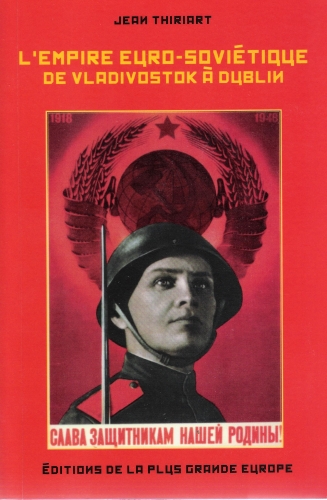
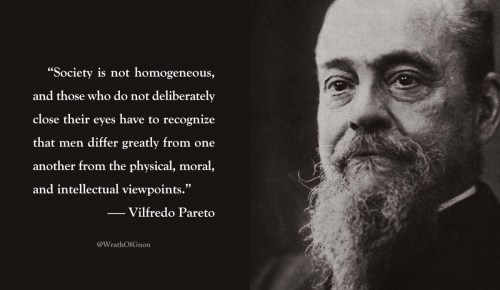



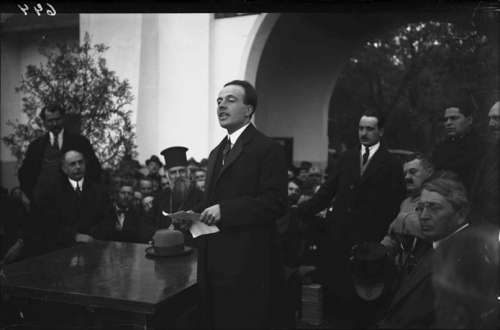

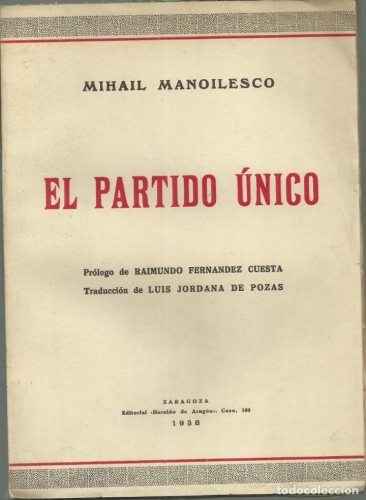
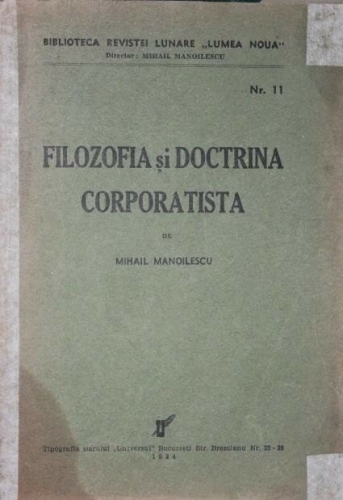 It is important to consider that, over time, Manoilescu not only acquired sympathy for Nazi and fascist regimes, but also he was a believer in these social and political models. The subsequent situation of Soviet dominance in Romania, mainly after the end of the Romanian-German alignment, made impossible any attempt or intention to adopt his economic conceptions.
It is important to consider that, over time, Manoilescu not only acquired sympathy for Nazi and fascist regimes, but also he was a believer in these social and political models. The subsequent situation of Soviet dominance in Romania, mainly after the end of the Romanian-German alignment, made impossible any attempt or intention to adopt his economic conceptions.





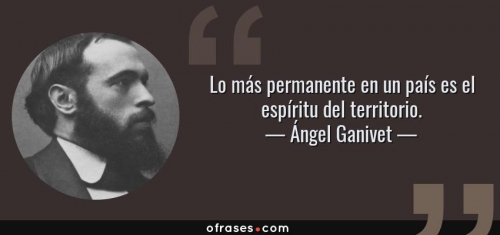
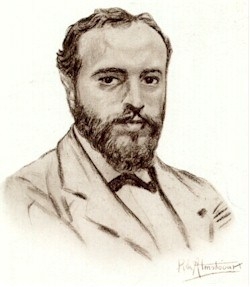 "La exaltación de la Iglesia española durante la dominación visigótica es obra de los bárbaros; pero no es obra de su voluntad, sino de su impotencia, incapaces para gobernar a un pueblo más culto, se resignaron a conservar la apariencia del poder, dejando el poder efectivo en manos más hábiles. De suerte, que el principal papel que en este punto desempeñaron los visigodos fue no desempeñar ninguno y dar, con ello, involuntariamente, ocasión para que la Iglesia se apoderara de los principales resortes de la política y fundase de hecho el estado religioso, que aún subsiste en nuestra patria, de donde se originó la metamorfosis social del cristianismo en catolicismo; esto es, en religión universal, imperante, dominadora, con posesión real de los atributos temporales de la soberanía." (Idearium Español, Agilar, Madrid, 1964; p. 11).
"La exaltación de la Iglesia española durante la dominación visigótica es obra de los bárbaros; pero no es obra de su voluntad, sino de su impotencia, incapaces para gobernar a un pueblo más culto, se resignaron a conservar la apariencia del poder, dejando el poder efectivo en manos más hábiles. De suerte, que el principal papel que en este punto desempeñaron los visigodos fue no desempeñar ninguno y dar, con ello, involuntariamente, ocasión para que la Iglesia se apoderara de los principales resortes de la política y fundase de hecho el estado religioso, que aún subsiste en nuestra patria, de donde se originó la metamorfosis social del cristianismo en catolicismo; esto es, en religión universal, imperante, dominadora, con posesión real de los atributos temporales de la soberanía." (Idearium Español, Agilar, Madrid, 1964; p. 11).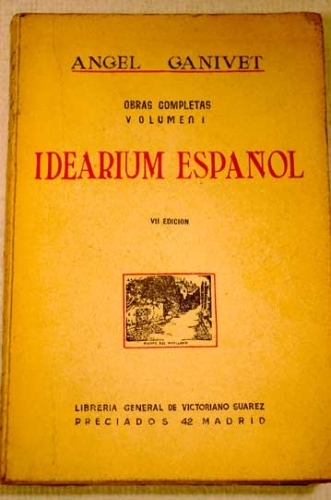 La lucha por la independencia, ya fuera ante Roma, ante los moros o ante Napoleón vendría dada por un supuesto "espíritu del territorio", que Ganivet maneja al modo de una especie de constante histórica. En realidad, tal constante difusamente descrita por el ensayista, es el factor geopolítico. España, junto con Portugal, está en una península. Las dos puertas que debe guardar son los Pirineos, al norte, y el Estrecho, al sur. En las penínsulas, los pueblos invasores entran fácilmente pero a menudo salen escaldados en una lucha contra los nativos agresivamente amantes de su independencia. Sólo Roma venció verdaderamente en ésta península ibérica (así llamada, aunque en dos tercios era península celta más bien). Cuando Ganivet habla de la insularidad agresiva (hacia el exterior) de los ingleses, más bien habla de modo difuso de una talasocracia (el poder de los barcos y sobre los mares, con una escasa y torpe milicia en la propia patria). De igual manera, cuando habla de la resistencia de los continentales (franceses, alemanes), alude al factor geopolítico de la escasa entidad física de las fronteras en las potencias "telúricas". Así pues, da igual que hablemos de los hunos o de los soviéticos: las cabalgadas de aquellos, o los tanques blindados de éstos, podían allegarse al corazón de Europa, y aun hasta Lisboa, en cuestión de días. Las potencias telúricas pueden llegar muy lejos por vía terrestre de acuerdo con los medios de su época, aunque a su paso hallan bolsas de saboteadores y resistentes que siempre pueden cortar la cadena de dominación, romper eslabones de control.
La lucha por la independencia, ya fuera ante Roma, ante los moros o ante Napoleón vendría dada por un supuesto "espíritu del territorio", que Ganivet maneja al modo de una especie de constante histórica. En realidad, tal constante difusamente descrita por el ensayista, es el factor geopolítico. España, junto con Portugal, está en una península. Las dos puertas que debe guardar son los Pirineos, al norte, y el Estrecho, al sur. En las penínsulas, los pueblos invasores entran fácilmente pero a menudo salen escaldados en una lucha contra los nativos agresivamente amantes de su independencia. Sólo Roma venció verdaderamente en ésta península ibérica (así llamada, aunque en dos tercios era península celta más bien). Cuando Ganivet habla de la insularidad agresiva (hacia el exterior) de los ingleses, más bien habla de modo difuso de una talasocracia (el poder de los barcos y sobre los mares, con una escasa y torpe milicia en la propia patria). De igual manera, cuando habla de la resistencia de los continentales (franceses, alemanes), alude al factor geopolítico de la escasa entidad física de las fronteras en las potencias "telúricas". Así pues, da igual que hablemos de los hunos o de los soviéticos: las cabalgadas de aquellos, o los tanques blindados de éstos, podían allegarse al corazón de Europa, y aun hasta Lisboa, en cuestión de días. Las potencias telúricas pueden llegar muy lejos por vía terrestre de acuerdo con los medios de su época, aunque a su paso hallan bolsas de saboteadores y resistentes que siempre pueden cortar la cadena de dominación, romper eslabones de control.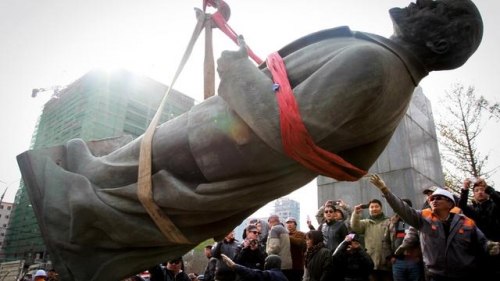
 Koestler was a pivotal figure in the post-war generation that rejected communism as “the God that failed”— the title of a celebrated book of essays,
Koestler was a pivotal figure in the post-war generation that rejected communism as “the God that failed”— the title of a celebrated book of essays, 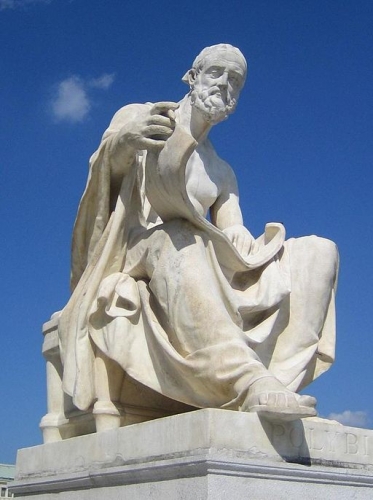
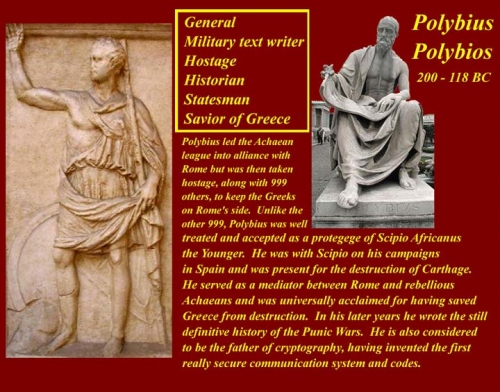
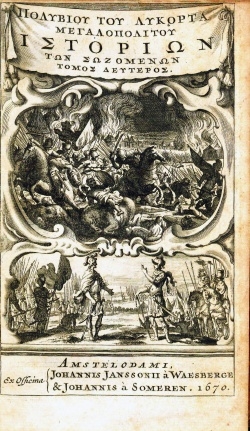 It is this particular intellectual predisposition toward the synoptic, along with its acceptance of nuance, multicausality and complexity, that has rendered Polybius such an appealing figure over the centuries for theorists of statesmanship and grand strategy. Indeed, in his
It is this particular intellectual predisposition toward the synoptic, along with its acceptance of nuance, multicausality and complexity, that has rendered Polybius such an appealing figure over the centuries for theorists of statesmanship and grand strategy. Indeed, in his 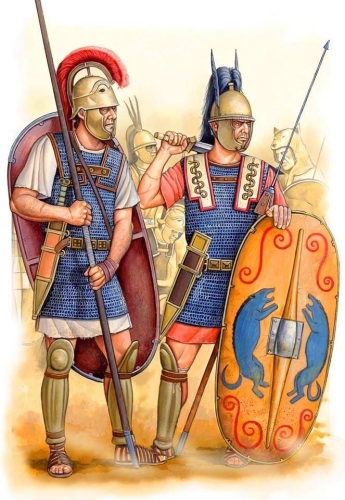
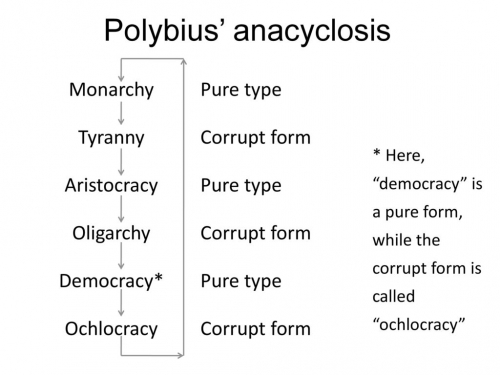
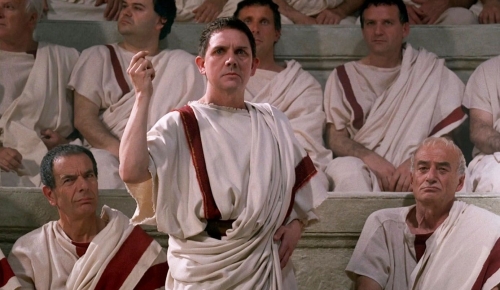



 The Double Standard that Relativism Creates
The Double Standard that Relativism Creates Our flight from the law in the name of more freedom to act has paradoxically undermined the principles for practical action. It turns out that we could not make our own meaning and give ourselves our own laws and ends.
Our flight from the law in the name of more freedom to act has paradoxically undermined the principles for practical action. It turns out that we could not make our own meaning and give ourselves our own laws and ends.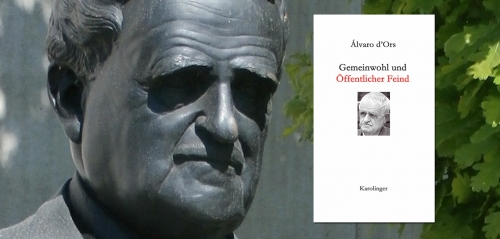
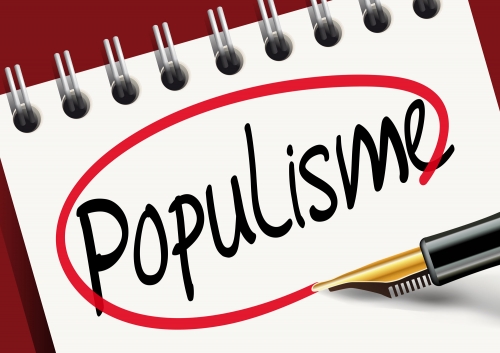
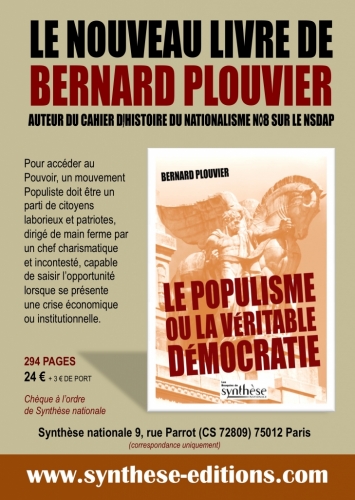 Pourtant les démocraties grecques antiques n’ont pas été des régimes populistes.
Pourtant les démocraties grecques antiques n’ont pas été des régimes populistes.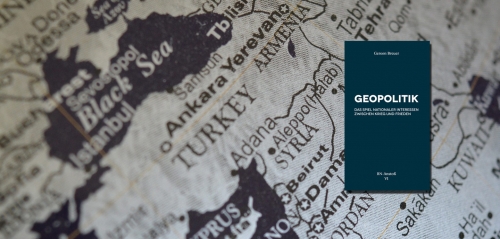
 Dabei richtet sich die Frage nicht danach, was die Bundesregierung oder präziser die Administration des Auswärtigen Amtes oder des Verteidigungsministeriums für deutsche Interessen hält, sondern welche Interessen sich mit Blick auf die Zukunft Deutschlands ergeben.
Dabei richtet sich die Frage nicht danach, was die Bundesregierung oder präziser die Administration des Auswärtigen Amtes oder des Verteidigungsministeriums für deutsche Interessen hält, sondern welche Interessen sich mit Blick auf die Zukunft Deutschlands ergeben.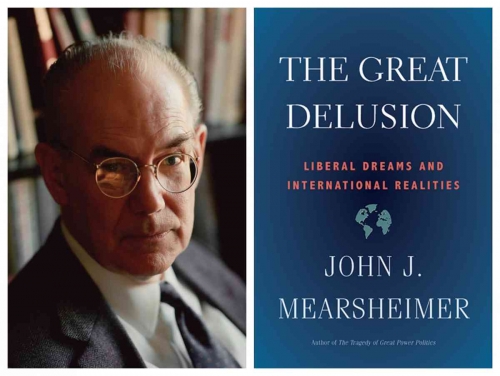
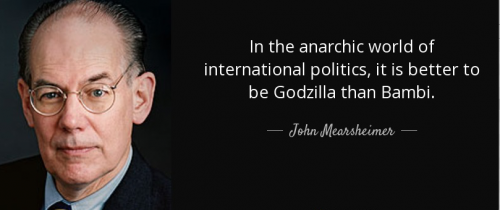
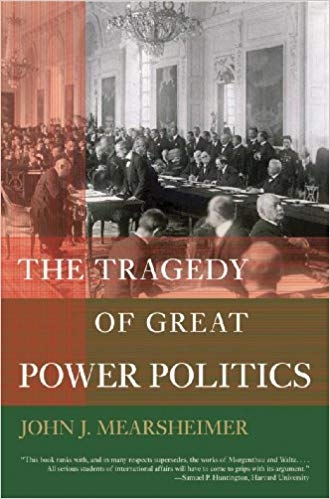 Liberalism is also no match for realism. At its core, liberalism assumes that the individuals who make up any society sometimes have profound differences about what constitutes the good life, and these differences might lead them to try to kill each other. Thus a state is needed to keep the peace. But there is no world state to keep countries at bay when they have profound disagreements. The structure of the international system is anarchic, not hierarchic, which means that liberalism applied to international politics cannot work. Countries thus have little choice but to act according to balance-of-power logic if they hope to survive. There are special cases, however, where a country is so secure that it can take a break from realpolitik and pursue truly liberal policies. The results are almost always bad, largely because nationalism thwarts the liberal crusader.
Liberalism is also no match for realism. At its core, liberalism assumes that the individuals who make up any society sometimes have profound differences about what constitutes the good life, and these differences might lead them to try to kill each other. Thus a state is needed to keep the peace. But there is no world state to keep countries at bay when they have profound disagreements. The structure of the international system is anarchic, not hierarchic, which means that liberalism applied to international politics cannot work. Countries thus have little choice but to act according to balance-of-power logic if they hope to survive. There are special cases, however, where a country is so secure that it can take a break from realpolitik and pursue truly liberal policies. The results are almost always bad, largely because nationalism thwarts the liberal crusader.






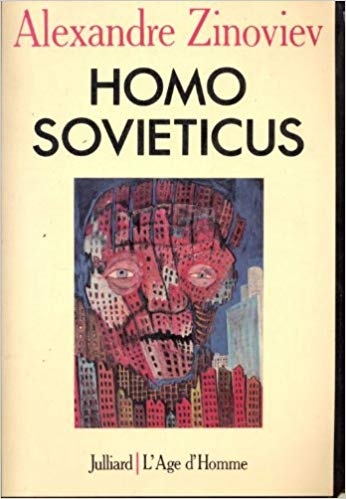

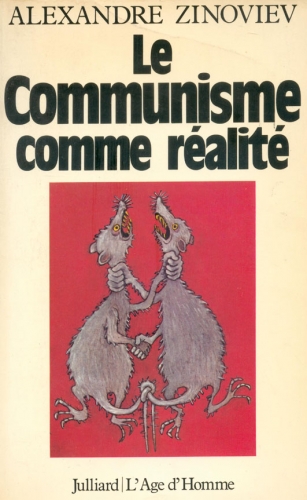
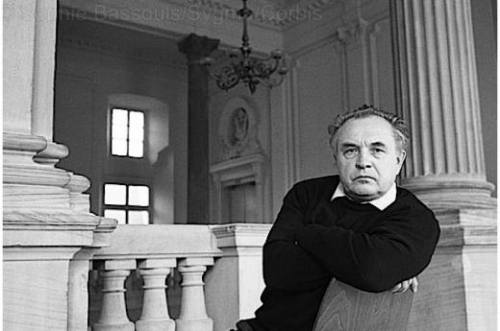
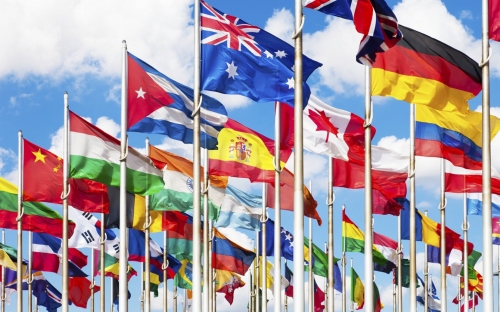
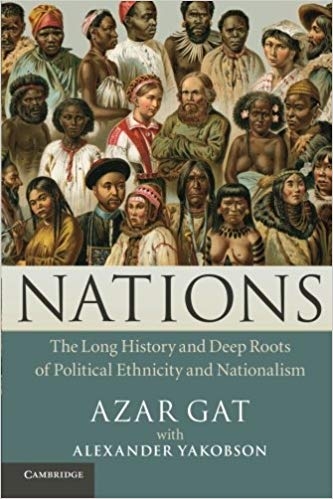 Local identity was paramount for many pre-modern peoples, but a sense of overarching ethnic identity was also potent. Pre-modern peoples considered themselves distinct entities united by blood ties, language, and a common religion. Gat argues that modern historians exaggerate the extent to which pre-modern ethnic groups were internally divided by linguistic differences. Though local dialects existed, language was generally a powerful unifying factor. Shared religious practices and beliefs were reinforced by a “network of cultic and congregational sites,” as well as wandering bards (p. 11).
Local identity was paramount for many pre-modern peoples, but a sense of overarching ethnic identity was also potent. Pre-modern peoples considered themselves distinct entities united by blood ties, language, and a common religion. Gat argues that modern historians exaggerate the extent to which pre-modern ethnic groups were internally divided by linguistic differences. Though local dialects existed, language was generally a powerful unifying factor. Shared religious practices and beliefs were reinforced by a “network of cultic and congregational sites,” as well as wandering bards (p. 11). Of course, most Leftist theorists are not interested in delegitimizing nationalism in Asian countries. Their target is Europe, and they have a vested interest in weakening the bonds of European nations. It is not a coincidence that most leading “modernists” (Hans Kohn, Karl Deutsch, Ernest Gellner, Eric Hobsbawm) have been Jews.
Of course, most Leftist theorists are not interested in delegitimizing nationalism in Asian countries. Their target is Europe, and they have a vested interest in weakening the bonds of European nations. It is not a coincidence that most leading “modernists” (Hans Kohn, Karl Deutsch, Ernest Gellner, Eric Hobsbawm) have been Jews.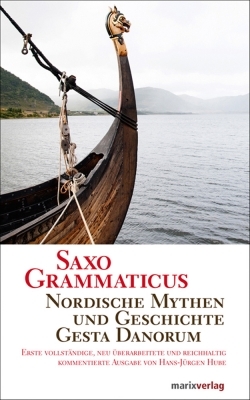 Nation-states began to emerge in Scandinavia during the High Middle Ages. Saxo Grammaticus, author of Gesta Danorum, a chronicle of Danish history, writes that he was motivated by “a passionate zeal to glorify our fatherland” and that “nations [nationes] are in the habit of vaunting the fame of their achievements, and joy in recollecting their ancestors” (p. 155). This patriotic spirit pervades the Norse sagas, in which Denmark, Norway, and Sweden are depicted as distinct nations. Gat notes that most Norse sagas were composed in Iceland and were not patronized, so one cannot claim that their patriotic message was royal propaganda.
Nation-states began to emerge in Scandinavia during the High Middle Ages. Saxo Grammaticus, author of Gesta Danorum, a chronicle of Danish history, writes that he was motivated by “a passionate zeal to glorify our fatherland” and that “nations [nationes] are in the habit of vaunting the fame of their achievements, and joy in recollecting their ancestors” (p. 155). This patriotic spirit pervades the Norse sagas, in which Denmark, Norway, and Sweden are depicted as distinct nations. Gat notes that most Norse sagas were composed in Iceland and were not patronized, so one cannot claim that their patriotic message was royal propaganda. Hungary was formed in the late ninth century from the consolidation of nomadic Finno-Ugric tribes into a single nation under Árpád, known to Hungarians as “the founder of our homeland.” Hungarian national identity was well-established by the Middle Ages. Istaván Bocskai, leader of a Hungarian uprising against the Habsburgs in 1604, wrote in his manifesto, “It should be demanded that every man who loves his country and fatherland stand up for his nation and hasten against our common enemy” (p. 190). Peasant soldiers and brigands (haiduci) echoed this sentiment: “We owe it to our dear country and nation . . . to rise all together and live or die together” (p. 190). The haiduk movement extended throughout Central and Southeastern Europe and had a strong nationalist character. Haiduci were celebrated in national epics and folklore.
Hungary was formed in the late ninth century from the consolidation of nomadic Finno-Ugric tribes into a single nation under Árpád, known to Hungarians as “the founder of our homeland.” Hungarian national identity was well-established by the Middle Ages. Istaván Bocskai, leader of a Hungarian uprising against the Habsburgs in 1604, wrote in his manifesto, “It should be demanded that every man who loves his country and fatherland stand up for his nation and hasten against our common enemy” (p. 190). Peasant soldiers and brigands (haiduci) echoed this sentiment: “We owe it to our dear country and nation . . . to rise all together and live or die together” (p. 190). The haiduk movement extended throughout Central and Southeastern Europe and had a strong nationalist character. Haiduci were celebrated in national epics and folklore.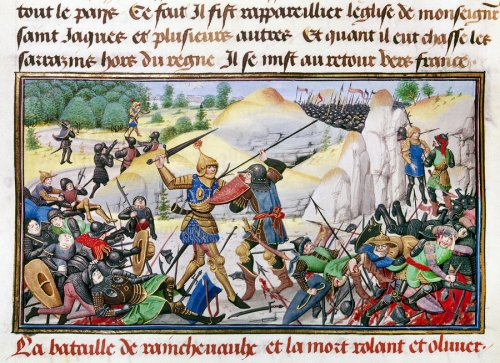
 Switzerland is a very rare example of a successful multiethnic state, the exception that proves the rule. Its success cannot easily be replicated because its formation was the result of specific historical contingencies. Switzerland began as a loose military alliance called the Old Swiss Confederation. Central authority was nearly nonexistent, and each canton was a self-governing entity. Switzerland’s mountainous geography further reinforced the autonomy of each canton and prevented political turmoil.
Switzerland is a very rare example of a successful multiethnic state, the exception that proves the rule. Its success cannot easily be replicated because its formation was the result of specific historical contingencies. Switzerland began as a loose military alliance called the Old Swiss Confederation. Central authority was nearly nonexistent, and each canton was a self-governing entity. Switzerland’s mountainous geography further reinforced the autonomy of each canton and prevented political turmoil.
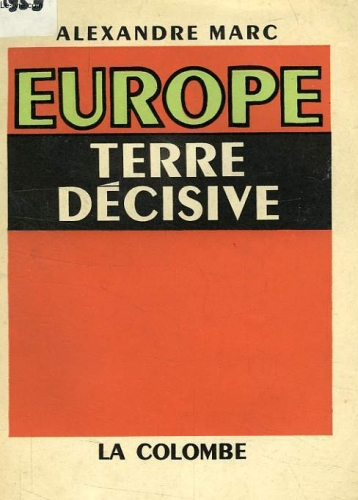 Principale figure du non-conformisme européen tant dans les années 1930 qu’après-guerre, Alexandre Marc naît en 1904 à Odessa dans l’Empire russe au sein d’une famille juive. Alexandre-Marc Lipiansky et ses parents fuient la Révolution de 1917 et s’installent à Paris. Étudiant à Iéna en Allemagne, il s’intéresse à la philosophie, puis rentre en France et y suit des cours de droit et de sciences politiques. Il participe aussi à un groupe socialiste libertaire étudiant.
Principale figure du non-conformisme européen tant dans les années 1930 qu’après-guerre, Alexandre Marc naît en 1904 à Odessa dans l’Empire russe au sein d’une famille juive. Alexandre-Marc Lipiansky et ses parents fuient la Révolution de 1917 et s’installent à Paris. Étudiant à Iéna en Allemagne, il s’intéresse à la philosophie, puis rentre en France et y suit des cours de droit et de sciences politiques. Il participe aussi à un groupe socialiste libertaire étudiant. 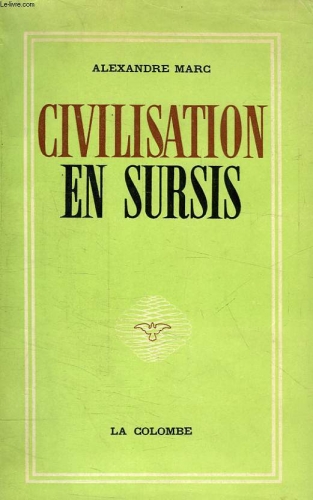 En contact étroit avec la revue réaliste Plans de Philippe Lamour, issue de la « galaxie » Georges Valois et des tentatives maladroites de fascisme à la française, Alexandre Marc se lie d’une part avec le pacifiste allemand francophile Otto Abetz, futur ambassadeur allemand à Paris sous l’Occupation, et, d’autre part, avec la revue nationale-bolchevique Der Gegner (« L’Opposant ») de Harro Schulze-Boysen. Il discute aussi avec Thierry Maulnier de la « Jeune Droite ». Auteur d’essais sur Pierre-Joseph Proudhon et Charles Péguy, Alexandre Marc s’oppose au nom du fédéralisme intégral à l’État-nation et nie la pertinence du clivage politicien gauche – droite.
En contact étroit avec la revue réaliste Plans de Philippe Lamour, issue de la « galaxie » Georges Valois et des tentatives maladroites de fascisme à la française, Alexandre Marc se lie d’une part avec le pacifiste allemand francophile Otto Abetz, futur ambassadeur allemand à Paris sous l’Occupation, et, d’autre part, avec la revue nationale-bolchevique Der Gegner (« L’Opposant ») de Harro Schulze-Boysen. Il discute aussi avec Thierry Maulnier de la « Jeune Droite ». Auteur d’essais sur Pierre-Joseph Proudhon et Charles Péguy, Alexandre Marc s’oppose au nom du fédéralisme intégral à l’État-nation et nie la pertinence du clivage politicien gauche – droite.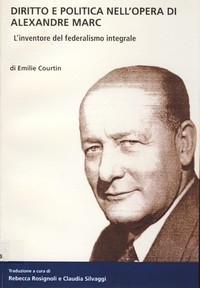 Comme de nombreux fédéralistes européens après 1945, il refuse l’« Europe forteresse » défendue par Maurice Bardèche et conçoit à l’époque – il sera plus réaliste au soir de sa vie – la fédération européenne comme la dernière étape vers une fédération mondiale, ce qui est proprement impolitique. Ce penseur personnaliste estime dans Fondements du fédéralisme. Destin de l’homme à venir (L’Harmattan, 1997) que « les antagonismes peuvent être féconds (p. 28) ». Soit ! Son fédéralisme ne se cantonne pas à la seule politique; elle a d’évidentes implications socio-économiques. À la fois hostiles au libéralisme, à l’étatisme et au collectivisme, « les fédéralistes, note-t-il, veulent une entreprise réellement libre, composée d’hommes libres, et fonctionnant avec un marché véritablement libéré, c’est-à-dire – pour reprendre […] la terminologie péguyiste – affranchie du joug et de l’Argent-Roi et de l’État-Moloch (p. 143) ». Ainsi propose-t-il la planification économique dans un cadre concurrentiel et l’auto-gestion en entreprise. Il se tait en revanche sur l’intéressement, l’association Capital – Travail et la participation, trois thèmes majeurs du gaullisme qu’Alexandre Marc soupçonnait de « néo-nationalisme » étriqué.
Comme de nombreux fédéralistes européens après 1945, il refuse l’« Europe forteresse » défendue par Maurice Bardèche et conçoit à l’époque – il sera plus réaliste au soir de sa vie – la fédération européenne comme la dernière étape vers une fédération mondiale, ce qui est proprement impolitique. Ce penseur personnaliste estime dans Fondements du fédéralisme. Destin de l’homme à venir (L’Harmattan, 1997) que « les antagonismes peuvent être féconds (p. 28) ». Soit ! Son fédéralisme ne se cantonne pas à la seule politique; elle a d’évidentes implications socio-économiques. À la fois hostiles au libéralisme, à l’étatisme et au collectivisme, « les fédéralistes, note-t-il, veulent une entreprise réellement libre, composée d’hommes libres, et fonctionnant avec un marché véritablement libéré, c’est-à-dire – pour reprendre […] la terminologie péguyiste – affranchie du joug et de l’Argent-Roi et de l’État-Moloch (p. 143) ». Ainsi propose-t-il la planification économique dans un cadre concurrentiel et l’auto-gestion en entreprise. Il se tait en revanche sur l’intéressement, l’association Capital – Travail et la participation, trois thèmes majeurs du gaullisme qu’Alexandre Marc soupçonnait de « néo-nationalisme » étriqué.
 De aanstaande Europese verkiezingen, waarmee het globalistisch-eurocratisch regime in Brussels zich nogmaals vier jaar een ‘democratische’ dekmantel wil aanmeten, biedt een goede gelegenheid tot een gedegen heroverweging van het ‘EU project’. De democratische camouflagekleding van het EU keizerrijk is inmiddels echter zodanig afgedragen dat zelfs troonopvolger kandidaat Mark Rutte zich afvraagt of het niet tijd is om het gewoon maar om te kleden in onverhuld totalitaire ‘uniform’ stijl. De titel van zijn op 13 februari 2019 in Zürich uitgesproken - en door analisten als ‘sollicitatiebrief’ nummer zoveel geïnterpreteerde
De aanstaande Europese verkiezingen, waarmee het globalistisch-eurocratisch regime in Brussels zich nogmaals vier jaar een ‘democratische’ dekmantel wil aanmeten, biedt een goede gelegenheid tot een gedegen heroverweging van het ‘EU project’. De democratische camouflagekleding van het EU keizerrijk is inmiddels echter zodanig afgedragen dat zelfs troonopvolger kandidaat Mark Rutte zich afvraagt of het niet tijd is om het gewoon maar om te kleden in onverhuld totalitaire ‘uniform’ stijl. De titel van zijn op 13 februari 2019 in Zürich uitgesproken - en door analisten als ‘sollicitatiebrief’ nummer zoveel geïnterpreteerde Met deze escalerende discrepantie tussen theorie en praktijk is de heersende klasse van het Westblok - een globalistisch-eurocratisch opererende coalitie tussen het neoliberale grootkapitaal en de cultuurmarxistische intelligentsia - inmiddels verworden tot een regelrecht vijandelijke elite. Haar EU project heeft ontpopt zich tot een voor allen zichtbaar globalistisch anti-Europa project. Voor het overleven van de Europese beschaving en van de Europese inheemse volkeren die deze beschaving dragen is de verwijdering van de vijandelijke elite absolute noodzaak. Daarbij is een fundamentele (cultuurhistorische, politiekfilosofische) kritiek op haar ideologie van essentieel belang. Een belangrijke bijdrage tot deze kritiek is recent geleverd door Belgisch Traditionalistisch publicist Robert Steuckers - een passender ‘verkiezingswijzer’ voor de ‘Europese verkiezingen’ van mei 2019 dan zijn grote trilogie Europa is nauwelijks denkbaar. Dit essay beoogt Steuckers’ analyse van de echte kernwaarden en identitaire wortels van Europa, zoals vervat in het eerste deel van zijn nog niet uit het Frans vertaalde trilogie, onder de aandacht van het Nederlandstalige publiek te brengen. Steuckers’ Europa I biedt meer dan een grondige tegen-analyse van de postmoderne ‘deconstructie’ van Europa’s authentieke waarden en identiteiten: het biedt een heldere formule van een levensvatbaar alternatief: een Archeo-Futuristisch geïnspireerd ‘Europa van de volkeren’ gebaseerd op de complementaire principes van autonome volksgemeenschappen, consistente politieke subsidiariteit en pragmatische confederatieve structuren. Het moet nogmaals gezegd zijn: de patriottisch-identitaire beweging van de Lage Landen is Robert Steuckers grote dank verschuldigd - en een hartelijke felicitatie met een werk dat de gewoonlijk nogal bescheiden intellectuele begrenzingen van onze gewesten verre te boven gaat.
Met deze escalerende discrepantie tussen theorie en praktijk is de heersende klasse van het Westblok - een globalistisch-eurocratisch opererende coalitie tussen het neoliberale grootkapitaal en de cultuurmarxistische intelligentsia - inmiddels verworden tot een regelrecht vijandelijke elite. Haar EU project heeft ontpopt zich tot een voor allen zichtbaar globalistisch anti-Europa project. Voor het overleven van de Europese beschaving en van de Europese inheemse volkeren die deze beschaving dragen is de verwijdering van de vijandelijke elite absolute noodzaak. Daarbij is een fundamentele (cultuurhistorische, politiekfilosofische) kritiek op haar ideologie van essentieel belang. Een belangrijke bijdrage tot deze kritiek is recent geleverd door Belgisch Traditionalistisch publicist Robert Steuckers - een passender ‘verkiezingswijzer’ voor de ‘Europese verkiezingen’ van mei 2019 dan zijn grote trilogie Europa is nauwelijks denkbaar. Dit essay beoogt Steuckers’ analyse van de echte kernwaarden en identitaire wortels van Europa, zoals vervat in het eerste deel van zijn nog niet uit het Frans vertaalde trilogie, onder de aandacht van het Nederlandstalige publiek te brengen. Steuckers’ Europa I biedt meer dan een grondige tegen-analyse van de postmoderne ‘deconstructie’ van Europa’s authentieke waarden en identiteiten: het biedt een heldere formule van een levensvatbaar alternatief: een Archeo-Futuristisch geïnspireerd ‘Europa van de volkeren’ gebaseerd op de complementaire principes van autonome volksgemeenschappen, consistente politieke subsidiariteit en pragmatische confederatieve structuren. Het moet nogmaals gezegd zijn: de patriottisch-identitaire beweging van de Lage Landen is Robert Steuckers grote dank verschuldigd - en een hartelijke felicitatie met een werk dat de gewoonlijk nogal bescheiden intellectuele begrenzingen van onze gewesten verre te boven gaat. H.G. Wells’ eeuwig groene meesterwerk The War of the Worlds blijft tot op de dag van vandaag niet alleen een van de grootste werken van het hele literaire science fiction genre: het behoudt ook tot op de dag van vandaag een directe - veelal alleen onderbewust, instinctief erkende - relevantie voor de existentiële conditie van de Westerse beschaving.
H.G. Wells’ eeuwig groene meesterwerk The War of the Worlds blijft tot op de dag van vandaag niet alleen een van de grootste werken van het hele literaire science fiction genre: het behoudt ook tot op de dag van vandaag een directe - veelal alleen onderbewust, instinctief erkende - relevantie voor de existentiële conditie van de Westerse beschaving.
 De Westerse volksmassa erkent per saldo wel instinctief de globalistische grootheidswaanzin van de vijandelijke elite - deze instinctieve erkenning wordt door de elitaire intelligentsia veelal neerbuigend afgedaan als ‘onderbuikgevoel’ en de politieke vertaling ervan wordt al even neerbuigend betiteld als ‘populisme’. Deze ultiem demofobe arrogantie mag lang werken, maar er zal uiteindelijk wel een hoge prijs op staan: de Westerse volkeren ervaren het globalistische regime van de vijandelijke elite nu al in toenemende mate als een regelrechte ‘bezettingsmacht’. Men begint de alles verstikkende macht van de vijandelijke elite te zien voor wat zij is: een wezensvreemd ‘rood onkruid’ dat de Westerse beschaving en het Westerse thuisland versmoort.
De Westerse volksmassa erkent per saldo wel instinctief de globalistische grootheidswaanzin van de vijandelijke elite - deze instinctieve erkenning wordt door de elitaire intelligentsia veelal neerbuigend afgedaan als ‘onderbuikgevoel’ en de politieke vertaling ervan wordt al even neerbuigend betiteld als ‘populisme’. Deze ultiem demofobe arrogantie mag lang werken, maar er zal uiteindelijk wel een hoge prijs op staan: de Westerse volkeren ervaren het globalistische regime van de vijandelijke elite nu al in toenemende mate als een regelrechte ‘bezettingsmacht’. Men begint de alles verstikkende macht van de vijandelijke elite te zien voor wat zij is: een wezensvreemd ‘rood onkruid’ dat de Westerse beschaving en het Westerse thuisland versmoort.


 Deze duiding wordt het best verwoordt door Steuckers zelf: La globalisation, c’est... le maintien de l’Europe, et de l’Europe seule, en état de faiblesse structurelle permanente. Et cette faiblesse structurelle est due, à la base, à un déficit éthique entretenu, à un déficit politique et culturel. Il n’y a pas d’éthique collective, de politique viable ou de culture féconde sans ce que Machiavel et les anciens Romains, auxquels le Florentin se référait, appelaient des ‘vertus politiques’, le terme ‘vertu’ n’ayant pas le sens stupidement moraliste qu’il a acquis, mais celui, latin, de ‘force agissante’, de ‘force intérieure agissante’... [De globalisatie betekent dit: ...het gijzelen van Europa - en alleen van Europa - in een staat van permanente [en] structurele zwakte. En die zwakte is in essentie te wijten aan een doorlopend ‘ethisch tekort’ [dat zich vertaalt in] een politiek en cultureel tekortschieten. Een collectieve ethiek, een levensvatbare politiek [en] een vruchtbare cultuur zijn onmogelijk zonder wat Machiavelli, en de oude Romeinen waarop de Florentijn zi[jn denken] baseerde, de ‘politieke deugden’ noemden - waarbij de term ‘deugd’ niet de kortzichtige moralistische lading heeft die hij nu heeft, maar de [oorspronkelijk] Latijnse [betekenis] van ‘acterende kracht’ [en] ‘innerlijk sturende kracht’.] (p. 279-80) Terecht wijst Steuckers op de door globalistische cognitieve oorlogsvoering bewerkstelligde ‘ethisch tekort’ van Europa: het is dit tekort aan politieke deugd, doelbewustheid en daadkracht dat Europa verlamt. Dit tekort maakt psycho-historische catharsis, geopolitieke assertiviteit en decisionistische zelfverdediging onmogelijk: het maakt Europa machteloos tegen de acute existentiële bedreigingen van opzettelijk gestuurde sociale implosie, massa-immigratie en jihadistische terreur. Dit globalistisch ‘anti-European’ Europa verwezenlijkt zich door de verinnerlijking van het cognitieve-dissonante globalistische mainstream media discours van zelfdestructief geïnterpreteerde ‘mensenrechten’, ‘multiculturaliteit’ en ‘diversiteit’. L’arme principale qui est dirigée contre l’Europe est donc un ‘écran moralisateur’, à sens unique, légal et moral, composé d’images positives, de valeurs dites occidentales et d’innocences prétendues menacées, pour justifier des campagnes de violence politique illimitée. [Het voornaamste wapen dat gericht is tegen Europa is een uniek ‘moralistisch [televisie- en beeld]scherm’ dat [specifieke] juridische en morele ‘waarden’ [afdwingt via] het positieve ‘frame’ van zogenaamde ‘westerse waarden’ en gepretendeerde ‘bedreigde onschuld’ voor het goedpraten van een [systematische] campagne van eindeloze politieke terreur.] (p.281)
Deze duiding wordt het best verwoordt door Steuckers zelf: La globalisation, c’est... le maintien de l’Europe, et de l’Europe seule, en état de faiblesse structurelle permanente. Et cette faiblesse structurelle est due, à la base, à un déficit éthique entretenu, à un déficit politique et culturel. Il n’y a pas d’éthique collective, de politique viable ou de culture féconde sans ce que Machiavel et les anciens Romains, auxquels le Florentin se référait, appelaient des ‘vertus politiques’, le terme ‘vertu’ n’ayant pas le sens stupidement moraliste qu’il a acquis, mais celui, latin, de ‘force agissante’, de ‘force intérieure agissante’... [De globalisatie betekent dit: ...het gijzelen van Europa - en alleen van Europa - in een staat van permanente [en] structurele zwakte. En die zwakte is in essentie te wijten aan een doorlopend ‘ethisch tekort’ [dat zich vertaalt in] een politiek en cultureel tekortschieten. Een collectieve ethiek, een levensvatbare politiek [en] een vruchtbare cultuur zijn onmogelijk zonder wat Machiavelli, en de oude Romeinen waarop de Florentijn zi[jn denken] baseerde, de ‘politieke deugden’ noemden - waarbij de term ‘deugd’ niet de kortzichtige moralistische lading heeft die hij nu heeft, maar de [oorspronkelijk] Latijnse [betekenis] van ‘acterende kracht’ [en] ‘innerlijk sturende kracht’.] (p. 279-80) Terecht wijst Steuckers op de door globalistische cognitieve oorlogsvoering bewerkstelligde ‘ethisch tekort’ van Europa: het is dit tekort aan politieke deugd, doelbewustheid en daadkracht dat Europa verlamt. Dit tekort maakt psycho-historische catharsis, geopolitieke assertiviteit en decisionistische zelfverdediging onmogelijk: het maakt Europa machteloos tegen de acute existentiële bedreigingen van opzettelijk gestuurde sociale implosie, massa-immigratie en jihadistische terreur. Dit globalistisch ‘anti-European’ Europa verwezenlijkt zich door de verinnerlijking van het cognitieve-dissonante globalistische mainstream media discours van zelfdestructief geïnterpreteerde ‘mensenrechten’, ‘multiculturaliteit’ en ‘diversiteit’. L’arme principale qui est dirigée contre l’Europe est donc un ‘écran moralisateur’, à sens unique, légal et moral, composé d’images positives, de valeurs dites occidentales et d’innocences prétendues menacées, pour justifier des campagnes de violence politique illimitée. [Het voornaamste wapen dat gericht is tegen Europa is een uniek ‘moralistisch [televisie- en beeld]scherm’ dat [specifieke] juridische en morele ‘waarden’ [afdwingt via] het positieve ‘frame’ van zogenaamde ‘westerse waarden’ en gepretendeerde ‘bedreigde onschuld’ voor het goedpraten van een [systematische] campagne van eindeloze politieke terreur.] (p.281)


 Het is de taak van het Traditionalisme om de gezamenlijke ‘Hogere Roeping’ van de Europese volkeren in herinnering te brengen wanneer deze bedreigd wordt.
Het is de taak van het Traditionalisme om de gezamenlijke ‘Hogere Roeping’ van de Europese volkeren in herinnering te brengen wanneer deze bedreigd wordt. Naar buiten toe vereist de Traditionalistische Rijksgedachte collectief zelfbewustzijn, collectieve trots en collectieve opofferingsbereidheid. Het is daarbij belangrijk te benadrukken dat de Rijksgedachte, zoals die wordt gehandhaafd door de hoogste bevelsautoriteit, zich positief - als letterlijke meerwaarde - verhoudt tot de verschillende authentieke identiteiten die met subsidiaire waarborgen worden bewaard binnen het Rijk. Een Traditionalistisch gedefinieerd Europees - of groter: Westers - Rijk doet niets af aan de specifieke taalkundige, godsdienstige, culturele en etnische identiteiten die erbinnen blijven bestaan: het voegt een identiteit toe, namelijk een Europese - of zelfs Westerse. Deze identiteit is dan niet dominant naar binnen (in de individuele voorstelling), maar wel naar buiten: naar buiten vertegenwoordigt zij een collectieve wil. Dat wil zeggen: het Rijk vertegenwoordigt naar buiten een absolute standaard, uitgedrukt in fysieke grenzen. De liberaal-normativistische illusie van globalistische ‘universele waarden’ en de ‘open grenzen’ zijn onverenigbaar met de effectieve handhaving van de klassieke beschavingsnormen die worden belichaamd in Traditionalistische Rijksgedachte. L’empire se conçoit comme un ordre, entouré d’un chaos menaçant, niant par là même que les autres puissent posséder eux-mêmes leur ordre ou qu’il ait quelque valeur. Chaque empire s’affirme plus ou moins comme le monde essentiel, entouré de mondes périphériques réduits à des quantités négligeables. L’hégémonie universelle concerne seulement “l’univers qui vaut quelque chose”. Rejeté dans les ténèbres extérieures, le reste est une menace dont il faut se protéger. [Het Rijk concipieert zichzelf als een orde die wordt omgeven door een dreigende chaos - [de Rijksgedachte] ontkent daarmee feitelijk dat andere [beschavingen] zelf een eigen orde met zelfstandige waarde kunnen hebben. Ieder Rijk ziet zichzelf min of meer als een ‘wereld op zich’, omgeven door tot op verwaarloosbare eenheden teruggebrachte ‘perifere werelden’.
Naar buiten toe vereist de Traditionalistische Rijksgedachte collectief zelfbewustzijn, collectieve trots en collectieve opofferingsbereidheid. Het is daarbij belangrijk te benadrukken dat de Rijksgedachte, zoals die wordt gehandhaafd door de hoogste bevelsautoriteit, zich positief - als letterlijke meerwaarde - verhoudt tot de verschillende authentieke identiteiten die met subsidiaire waarborgen worden bewaard binnen het Rijk. Een Traditionalistisch gedefinieerd Europees - of groter: Westers - Rijk doet niets af aan de specifieke taalkundige, godsdienstige, culturele en etnische identiteiten die erbinnen blijven bestaan: het voegt een identiteit toe, namelijk een Europese - of zelfs Westerse. Deze identiteit is dan niet dominant naar binnen (in de individuele voorstelling), maar wel naar buiten: naar buiten vertegenwoordigt zij een collectieve wil. Dat wil zeggen: het Rijk vertegenwoordigt naar buiten een absolute standaard, uitgedrukt in fysieke grenzen. De liberaal-normativistische illusie van globalistische ‘universele waarden’ en de ‘open grenzen’ zijn onverenigbaar met de effectieve handhaving van de klassieke beschavingsnormen die worden belichaamd in Traditionalistische Rijksgedachte. L’empire se conçoit comme un ordre, entouré d’un chaos menaçant, niant par là même que les autres puissent posséder eux-mêmes leur ordre ou qu’il ait quelque valeur. Chaque empire s’affirme plus ou moins comme le monde essentiel, entouré de mondes périphériques réduits à des quantités négligeables. L’hégémonie universelle concerne seulement “l’univers qui vaut quelque chose”. Rejeté dans les ténèbres extérieures, le reste est une menace dont il faut se protéger. [Het Rijk concipieert zichzelf als een orde die wordt omgeven door een dreigende chaos - [de Rijksgedachte] ontkent daarmee feitelijk dat andere [beschavingen] zelf een eigen orde met zelfstandige waarde kunnen hebben. Ieder Rijk ziet zichzelf min of meer als een ‘wereld op zich’, omgeven door tot op verwaarloosbare eenheden teruggebrachte ‘perifere werelden’.
 Het Indo-Europese archetype dat het nieuwe Rijk moet vestigen is bovenal de ‘ridder’. Zoals gezegd, wordt oudste uitdrukking daarvan bewaard in de Perzische Traditie: ...le modèle de la chevalerie perse... constitue... pour l’Europe un mode opératif sans égal, de type ‘kshatriyaque’... [que] ne peut être pensé en dehors du projet de ‘nouvelle chancellerie impériale européenne’, énoncé par Carl Schmitt. Celui-ci a évoqué la nécessité de former une instance de ce type, après les catastrophes qui ont frappé l’Europe dans la première moitié du XXe siècle et pour préparer la renaissance qui suivra l’assujettissement de notre sous-continent. ...[het model van de Perzische ridderstand... vertegenwoordigt... voor Europa een kwalitatief ongeëvenaarde modus van het ‘kshatriyaanse’ type... waarzonder men zich geen voorstelling kan maken van het project dat Carl Schmitt voor ogen stond: de ‘nieuwe Europese rijkskanselarij’. [Schmitt] wees op de noodzaak een dergelijke instantie te vormen in de nasleep van de catastrofes die Europa gedurende de eerste helft van de 20e eeuw heeft ondergaan ten einde de wedergeboorte voor te bereiden die zal volgen op de onderwerping van ons subcontinent.
Het Indo-Europese archetype dat het nieuwe Rijk moet vestigen is bovenal de ‘ridder’. Zoals gezegd, wordt oudste uitdrukking daarvan bewaard in de Perzische Traditie: ...le modèle de la chevalerie perse... constitue... pour l’Europe un mode opératif sans égal, de type ‘kshatriyaque’... [que] ne peut être pensé en dehors du projet de ‘nouvelle chancellerie impériale européenne’, énoncé par Carl Schmitt. Celui-ci a évoqué la nécessité de former une instance de ce type, après les catastrophes qui ont frappé l’Europe dans la première moitié du XXe siècle et pour préparer la renaissance qui suivra l’assujettissement de notre sous-continent. ...[het model van de Perzische ridderstand... vertegenwoordigt... voor Europa een kwalitatief ongeëvenaarde modus van het ‘kshatriyaanse’ type... waarzonder men zich geen voorstelling kan maken van het project dat Carl Schmitt voor ogen stond: de ‘nieuwe Europese rijkskanselarij’. [Schmitt] wees op de noodzaak een dergelijke instantie te vormen in de nasleep van de catastrofes die Europa gedurende de eerste helft van de 20e eeuw heeft ondergaan ten einde de wedergeboorte voor te bereiden die zal volgen op de onderwerping van ons subcontinent.



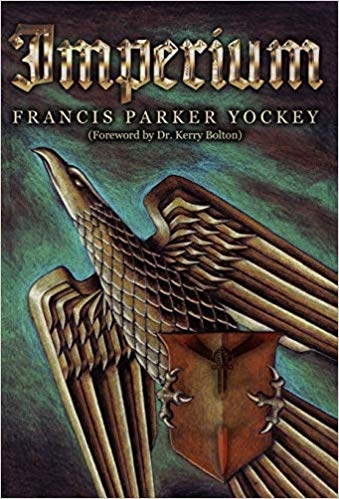 René Girard a parlé de l’Amérique comme puissance mimétique. Sur cette planète de crétins en effet tout le monde veut devenir américain, y compris quand il s’agit de payer des études à quarante mille euros/an, des opérations à 200 000 euros, de devenir obèse et même abruti par la consommation de médias et d’opiacés...
René Girard a parlé de l’Amérique comme puissance mimétique. Sur cette planète de crétins en effet tout le monde veut devenir américain, y compris quand il s’agit de payer des études à quarante mille euros/an, des opérations à 200 000 euros, de devenir obèse et même abruti par la consommation de médias et d’opiacés... Le cinéaste Tim Burton a bien moqué ce comportement homogénéisé/industriel dans plusieurs de ses films, par exemple Edouard aux mains d’argent. Kazan avait fait de même dans l’Arrangement. Aujourd’hui ce comportement monolithique/industriel s’applique à l’humanitaire, à la déviance, à la marginalité, au transsexualisme, au tatouage, au piercing, etc.
Le cinéaste Tim Burton a bien moqué ce comportement homogénéisé/industriel dans plusieurs de ses films, par exemple Edouard aux mains d’argent. Kazan avait fait de même dans l’Arrangement. Aujourd’hui ce comportement monolithique/industriel s’applique à l’humanitaire, à la déviance, à la marginalité, au transsexualisme, au tatouage, au piercing, etc. 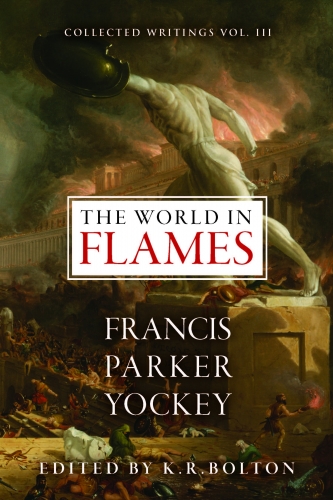 La musique est rarement entendue en Amérique, ayant été remplacée par le battement de tambour sans culture du noir. Comme le dit un musicologue américain: «Le rythme du jazz, tiré de tribus sauvages, est à la fois raffiné et élémentaire et correspond aux dispositions de notre âme moderne. Cela nous excite sans répit, comme le battement de tambour primitif du danseur de la prière. Mais il ne s'arrête pas là. Il doit en même temps tenir compte de l'excitabilité de la psyché moderne. Nous avons soif de stimuli rapides, excitants et en constante évolution. La musique est un excellent moyen d’excitation, syncopé, qui a fait ses preuves. »
La musique est rarement entendue en Amérique, ayant été remplacée par le battement de tambour sans culture du noir. Comme le dit un musicologue américain: «Le rythme du jazz, tiré de tribus sauvages, est à la fois raffiné et élémentaire et correspond aux dispositions de notre âme moderne. Cela nous excite sans répit, comme le battement de tambour primitif du danseur de la prière. Mais il ne s'arrête pas là. Il doit en même temps tenir compte de l'excitabilité de la psyché moderne. Nous avons soif de stimuli rapides, excitants et en constante évolution. La musique est un excellent moyen d’excitation, syncopé, qui a fait ses preuves. »
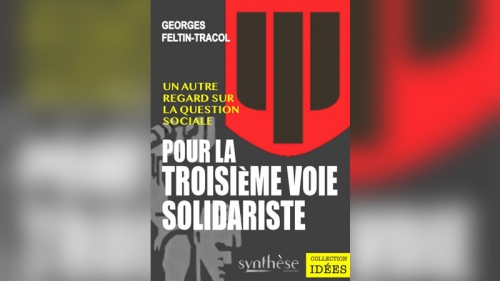
 Après l’affaire Dreyfus, ce socialisme tercériste se laisse contaminer par l’idéologie libérale du progrès, cette « gigantesque escroquerie à l’espérance » que dénonce Bernanos dans une retentissante conférence prononcée à Bruxelles en 1927. La même année, Guénon publie La Crise du monde moderne, dont un chapitre s’intitule « Le chaos social » (11). À qui profite celui-ci ?, s’interroge Michel Marmin dès 1996. L’auteur fait écho au conférencier du GRECE dès la page 5 en précisant que « la question sociale demeure au XXIe siècle un enjeu crucial au même titre que le défi identitaire des peuples européens et la préservation des écosystèmes, de leur flore, de leur faune et de leurs paysages ». reprenons notre approche chronologique et penchons-nous sur l’entre-deux-guerres mondiales.
Après l’affaire Dreyfus, ce socialisme tercériste se laisse contaminer par l’idéologie libérale du progrès, cette « gigantesque escroquerie à l’espérance » que dénonce Bernanos dans une retentissante conférence prononcée à Bruxelles en 1927. La même année, Guénon publie La Crise du monde moderne, dont un chapitre s’intitule « Le chaos social » (11). À qui profite celui-ci ?, s’interroge Michel Marmin dès 1996. L’auteur fait écho au conférencier du GRECE dès la page 5 en précisant que « la question sociale demeure au XXIe siècle un enjeu crucial au même titre que le défi identitaire des peuples européens et la préservation des écosystèmes, de leur flore, de leur faune et de leurs paysages ». reprenons notre approche chronologique et penchons-nous sur l’entre-deux-guerres mondiales. Une des conférences insérées dans le florilège de Georges Feltin-Tracol a été prononcée durant l’été 2018 au « Pavillon noir », local ouvert « sur les quais de la Saône » par le Bastion social de Lyon, après l’« incroyable répression (p. 19) » qui s’abattit sur ces courageux militants installés, au printemps 2017, dans un bâtiment inoccupé. Des Bastions sociaux du même type ont vu le jour dans cinq autres villes françaises (Strasbourg, Chambéry, Marseille, Aix-en-Provence et Clermont-Ferrand). Ils fonctionnent selon des modalités analogues à celle de la section lyonnaise issue du GUD (Groupe Union-Défense) conduite alors par Steven Bissuel, promoteur de la réquisition immobilière susdite. Le point de départ de cette téméraire action militante est l’occupation non conforme d’un bâtiment municipal du IIe arrondissement de la Capitale des Gaules. «
Une des conférences insérées dans le florilège de Georges Feltin-Tracol a été prononcée durant l’été 2018 au « Pavillon noir », local ouvert « sur les quais de la Saône » par le Bastion social de Lyon, après l’« incroyable répression (p. 19) » qui s’abattit sur ces courageux militants installés, au printemps 2017, dans un bâtiment inoccupé. Des Bastions sociaux du même type ont vu le jour dans cinq autres villes françaises (Strasbourg, Chambéry, Marseille, Aix-en-Provence et Clermont-Ferrand). Ils fonctionnent selon des modalités analogues à celle de la section lyonnaise issue du GUD (Groupe Union-Défense) conduite alors par Steven Bissuel, promoteur de la réquisition immobilière susdite. Le point de départ de cette téméraire action militante est l’occupation non conforme d’un bâtiment municipal du IIe arrondissement de la Capitale des Gaules. «
Der spanische Rechtsgelehrte Álvaro d’Ors sieht im Migranten den öffentlichen Feind, dessen Invasion verhindert werden muss. Eine Rezension des Buches Gemeinwohl und Öffentlicher Feind von Gereon Breuer.
Dem Dominikanerpater Wolfgang Hariolf Spindler, der als versierter Kenner Carl Schmitts gilt, ist es zu verdanken, dass die Schrift Gemeinwohl und Öffentlicher Feind von Álvaro d’Ors endlich auf Deutsch vorliegt. Carl Schmitt und sein Denken bilden dabei in zweifacher Weise den Schnittpunkt, der das Werk nicht nur für Spindler interessant macht. Den 2004 verstorbenen Ordinarius für Römisches Recht an der Universität Navarra verband eine lebenslange, kritische Freundschaft mit dem Plettenberger Titanen. Diese hat sein Denken insbesondere im Hinblick auf den Feind als politische Kategorie maßgeblich geprägt.
So ist auch für d’Ors die Bestimmung des Feindes eine relative Angelegenheit. Der Feind ist für ihn immer der „Feind einer bestimmten Gruppe“. Seine Bestimmung sieht er deshalb auf das Engste mit dem Mehrheitsprinzip verknüpft. Weil diese Art der Feindbestimmung öffentlich ist, handelt es sich bei dem Feind um einen öffentlichen Feind. Für d’Ors wie für Schmitt bedeutet dies, dass sich die Feindschaft immer gegen eine bestimmte Gruppe richten muss.
Feindschaft bedarf der Erklärung
Als Voraussetzung für die öffentliche Feindschaft nennt d’Ors ihre Erklärung. Das bedeutet, dass die Gruppe, gegen die sich die Feindschaft richtet, auch von dieser Feindschaft wissen muss. In ihrer schärfsten Form ist die Erklärung der Feindschaft die Kriegserklärung, die sich aber d’Ors zufolge auch gegen die inneren Feinde richten kann. Das Potential der öffentlichen Feindschaft zeigt sich daher auch in der Verächtlichmachung bestimmter Gruppen, deren Meinung als unerwünscht angesehen wird.
D’Ors weist darauf hin, dass in antiker Zeit die formale Erklärung der Feindschaft nötig war, um einen Krieg beginnen zu können, für dessen Gewalthandlungen dann das Kriegsrecht galt. Das bedeutet: Ist die Feindschaft einmal erklärt, rechtfertigt dies auch die Vernichtung des Feindes. In diesem Sinne wird die soziale Vernichtung eines inneren Feindes aufgrund einer unerwünschten Meinung als Verteidigungshandlung legitimiert. Das ist deshalb besonders perfide, weil es sich bei der Erklärung der Feindschaft um eine Mehrheitsentscheidung handelt, durch die eine bestimmte Gruppe als öffentlicher Feind kriminalisiert wird.
Mehrheitsprinzip als Prinzip vernunftloser Geschöpfe
Ganz unabhängig von ihrem Inhalt haben Mehrheitsentscheidungen im Sinne von d’Ors einen mindestens problematischen Charakter. Er sieht im Mehrheitsprinzip das Prinzip der vernunftlosen Geschöpfe verwirklicht. Dadurch werde alles zu einer relativen Angelegenheit – nicht nur die Bestimmung des Feindes. D’Ors sieht hier einen Gegenpol nicht nur zur Vernunft, sondern auch zur Verantwortung. Zwar bringe „die Mehrheitsentscheidung die Option des freien Willens einer menschlichen Gruppe zum Ausdruck, nicht jedoch die Erfolgsgarantie ihrer Verantwortung“.
Das bedeutet, dass Mehrheitsentscheidungen keine verantwortbaren Entscheidungen sind und sie deshalb auch kein verantwortliches Handeln begründen können. Die Mehrheit ist eben kein Einzelner, der für eine Entscheidung zur Rechenschaft gezogen werden kann, sondern eine Masse undefinierbarer Verantwortlichkeiten. Aus diesem Grund empfindet d’Ors demokratische Entscheidungen als ungerecht und weil er den Kampf gegen sie als aussichtslos betrachtet, „bleibt außer der Enthaltung keine vernünftige Gegenwehr“.
Gemeinwohl und Naturrecht
Den Bereich des Gemeinwohls will d’Ors aus diesem Grund von den ungerechten Entscheidungen verschont wissen. Das Gemeinwohl ist für ihn das, „was mit dem natürlichen Gesetz übereinstimmt […] und nicht eine Reihe von ethischen Prinzipien, die aufgrund menschlicher Übereinkunft aufgestellt wurden […].“ Dieses natürliche Gesetz oder Naturrecht ist aus dem weltlichen Recht im Gegensatz zum kanonischen Recht längst verschwunden. Seinen Platz hat der Positivismus eingenommen, demzufolge alles als Recht gelten kann, was als Recht gesetzt wurde.
Carl Schmitt erkennt im Staat als geschichtsnotwendigem Produkt die wesentliche Institution der Rechtssetzung. Demgegenüber stellt der Staat für d’Ors etwas grundsätzlich Überflüssiges dar und ist für ihn kaum mehr als eine „säkularistische Fehlentwicklung“. Dementsprechend schreibt er auch in einem Brief an Schmitt vom 3. Oktober 1962, dass „die katholische Soziallehre mit der Idee des ‚Staates’ im eigentlichen Sinn unvereinbar ist“. Für das Gemeinwohl ist der Staat im Sinne d’Ors deshalb auch nicht zuständig, sondern es obliege der Gemeinschaft, die Übereinstimmung des Gemeinwohls mit dem natürlichen Gesetz zu sichern.
Masseneinwanderung ist Invasion
Die Immigration stellt für d’Ors dann einen Verstoß gegen das Naturrecht dar, wenn sie massenhaft geschieht. Zwar müsse sich der Mensch frei bewegen können, aber dabei handele es sich um eine individuelle Freiheit, die nicht auf eine ganze Gruppe übertragen werden könne. Daher stelle „der massenhafte Transfer von Menschen aus ihrem eigenen Territorium in ein fremdes“ eine Invasion dar. Vor dem Hintergrund eines naturrechtlich begründeten Gemeinwohls sei der Widerstand gegen eine solche Invasion zu seinem Schutz dann auch eine legitime Angelegenheit. Eine Gemeinschaft könne „die Immigration in ihr Territorium mit vorbeugenden Maßnahmen in zulässiger Weise verhindern, sie darf aber nicht versuchen, sich von der bereits erfolgten Immigration zu reinigen; denn ihre frühere Identität hat sie tatsächlich schon verloren“.
Ein Migrant ist deshalb so lange ein öffentlicher Feind, wie er sich als Angehöriger einer Gruppe außerhalb des eigenen Territoriums befindet. Die Feindschaft wird dabei durch eine Sicherung der Grenzen erklärt. Alle Probleme, die im Zusammenhang mit der Masseneinwanderung in einem Land einhergehen, beruhen daher auf der Unterlassung der Feinderklärung. Sie kann das Gemeinwohl letztlich nur schützen, wenn sie zum richtigen Zeitpunkt erfolgt und die Invasion wirksam verhindert.
Alvaro d’Ors (2015): Gemeinwohl und Öffentlicher Feind. Wien: Karolinger Verlag. 130 Seiten. 19,90 Euro.
Bildhintergrund: Álvaro d’Ors-Statue, fotographiert von: Jeremyah1983, CC BY-SA 4.0
Dieser Beitrag erschien zuerst auf unserem Blog Einwanderungskritik.de.